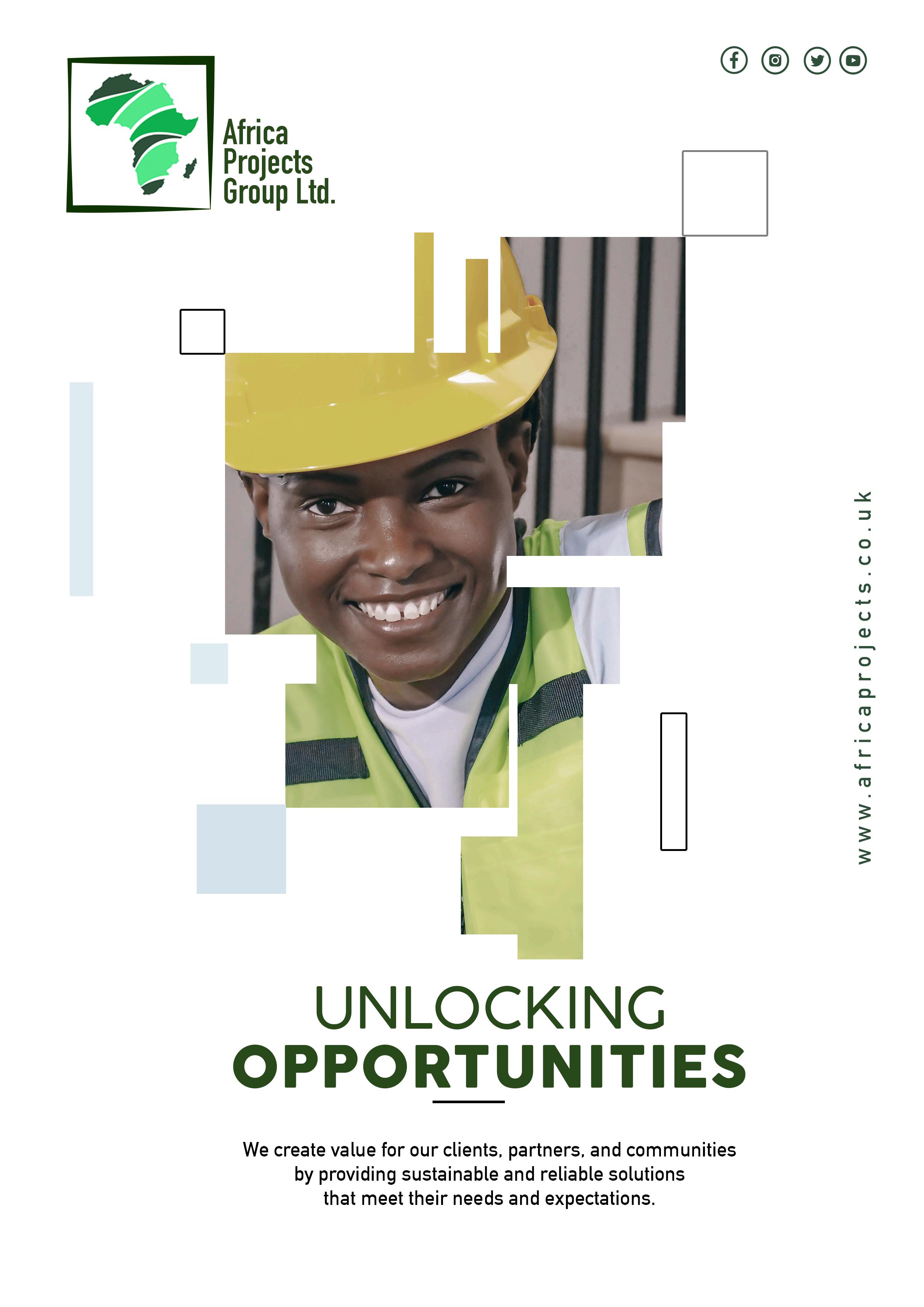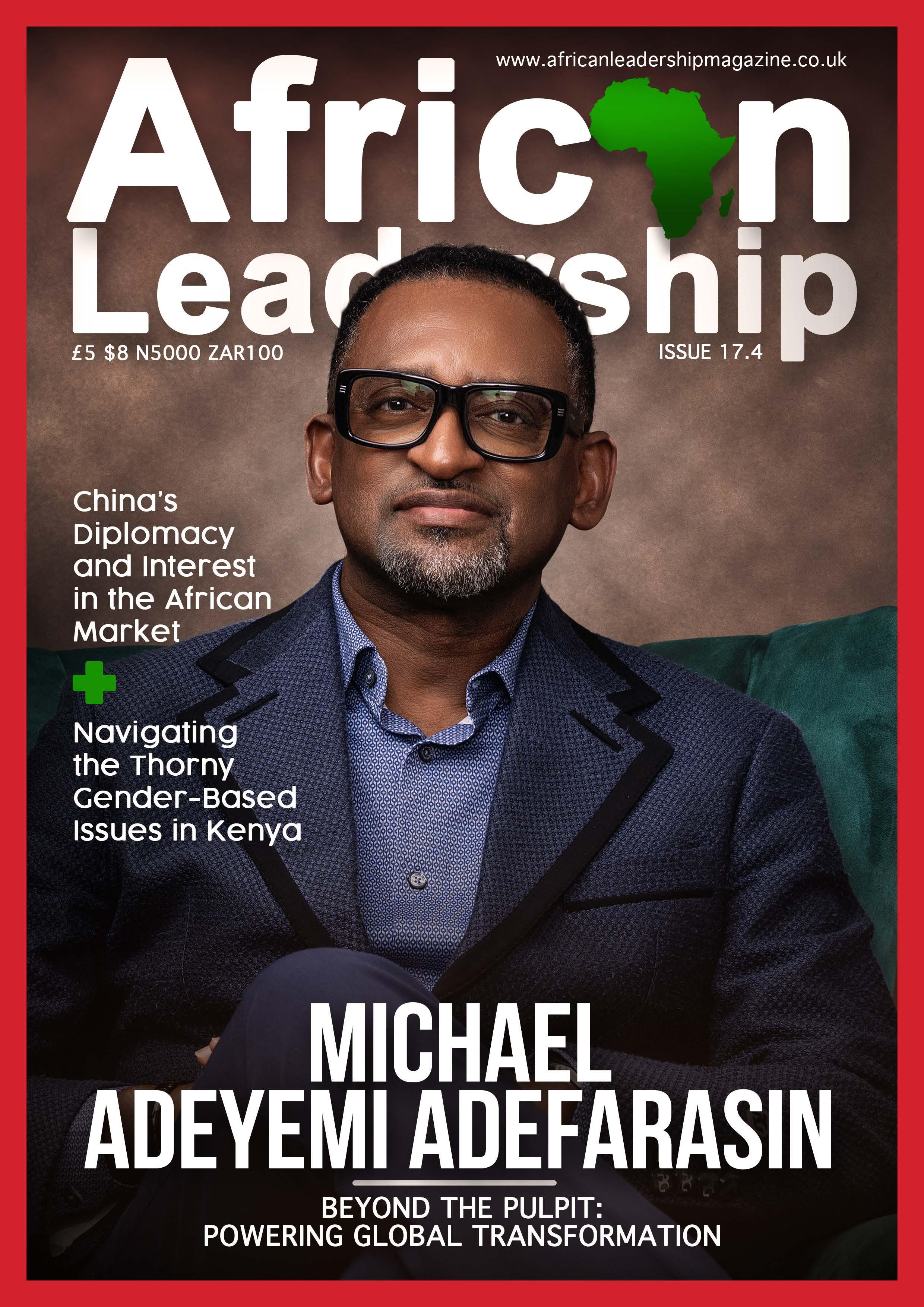









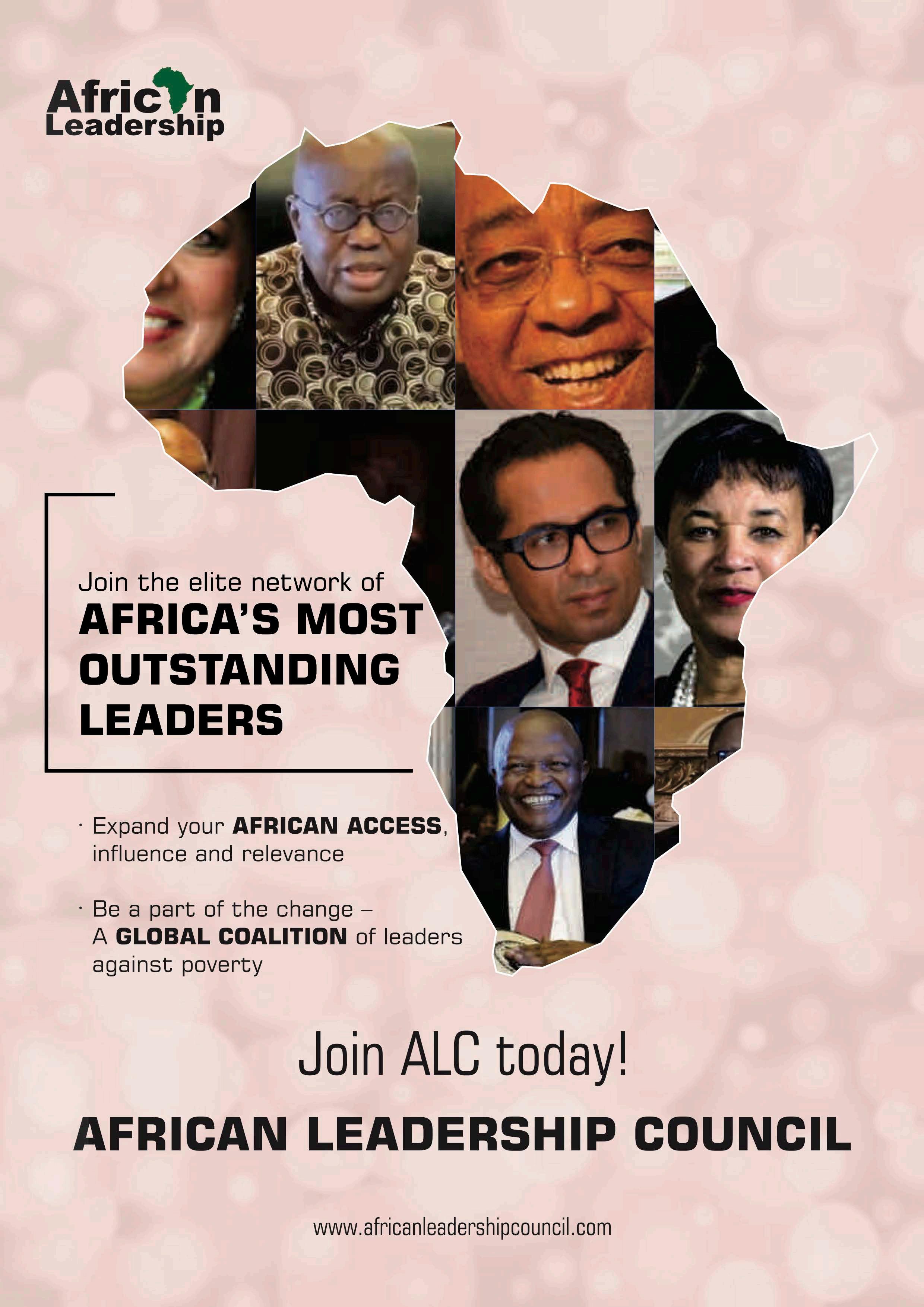
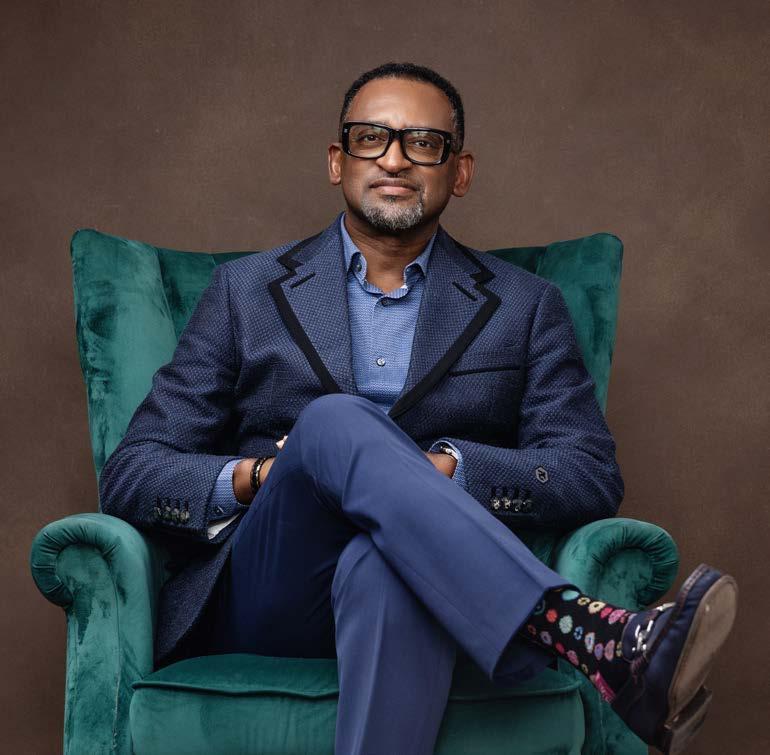
Building a Better Africa: Challenges and Opportunities in the 21st Century
Evaluating the Impact of the AfCFTA on Africa’s Economic Integration

TABLE OF CONTENTS 34 74
16 34 www.africanleadershipmagazine.co.uk
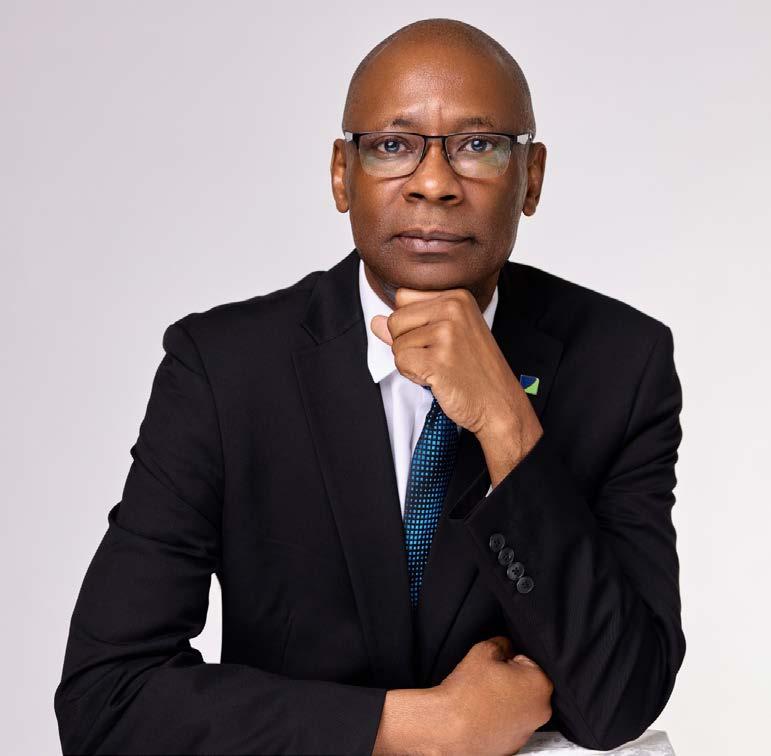
50 52 62 Hon. Justice Martha K. Koome, EGH: Pioneering Justice Reforms and Advocacy
80 Zimbabwe’s Monetary Policy: Lessons for Other African Nations 30 46
Africa, Democracy, and the Judiciary; A continent at crossroads
64 How to Tap into the Tourism Potential in Nigeria China’s Diplomacy and Interest in the African Market
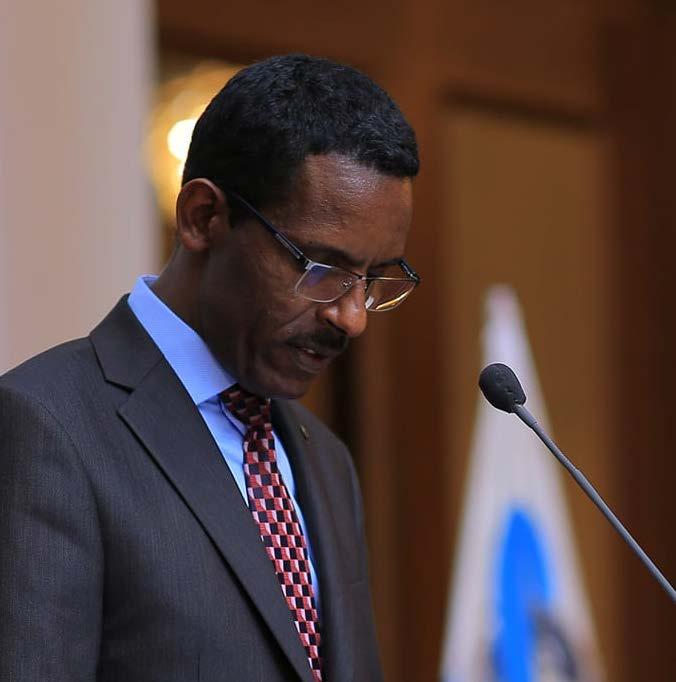

70 15 Insights Into Senegal’s New President: Bassirou Diomaye Faye
72 Assessing the Impact of Foreign Aid on Africa

76 Navigating the thorny gender-based issues in Kenya
66 70 www.africanleadershipmagazine.co.uk

H.E. JOHN MAHAMA
Fmr. President of Ghana
“It is always an honour to be in the company of such distinguished fellow Africans, that the African Leadership Magazine events bring together - Africans who have committed their lives to changing the negative narrative about our continent.”
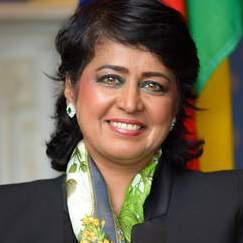
H.E. MRS. AMEEN GURIB-FAKIM
Fmr. President of Mauritius
“It is ver y gratifying that we now have an organization like African Leadership Magazine, which endeavors to promote good governance and impactful leadership in Africa - bring the best of Africa to the global stages.”
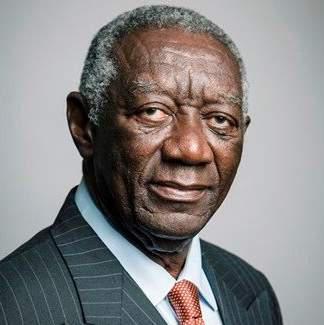
H.E. JOHN KUFOUR
Fmr. President of Ghana
“I believe people are more impor tant than power and anything that promotes good people and leadership is what we need in Africa, and that is what African Leadership Magazine is doing.”
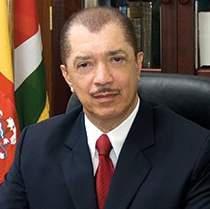
H.E. JAMES A MICHEL
Fmr. President of Seychelles
“I wish to express my sincere thanks and deep appreciation to the African Leadership Magazine for the work that it is doing on the continent, and especially in advancing the cause of small Islands Developing states, Any effor t aimed at increasing the visibility of the good work being done by leadership in Africa does positively impact on the continent and that is what the African Leadership Magazine is doing.”
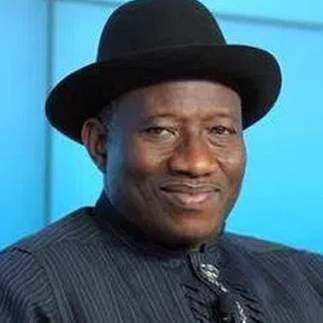
DR. GOODLUCK JONATHAN
Fmr. President of Nigeria
“African Leadership Magazine has become a brand for Africa and I am pleased to be associated with it. especially because of the caliber of African Leaders on itʼs board.”
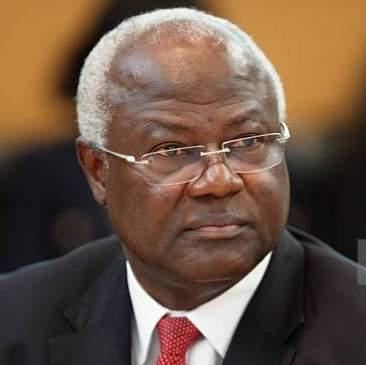
H.E. ERNEST BAI KOROMA
Fmr. President of Sierra Leone
“I am delighted to be associated with the sterling work that the African Leadership Magazine is doing on the continent. Democratic governance is the elephant in the room, and the continent needs to reaccess its governance systems. The agenda on global sustainable development shows that Africans are lagging behind. Africa will need to reinvent its governance system with its youth growing population.”
WHAT NOTABLE LEADERS ARE SAYING ABOUT AFRICAN
ZINE AFRICANLEADERSHIPMAGAZINE www.africanleadershipmagazine.co.uk
LEADERSHIP MAGA
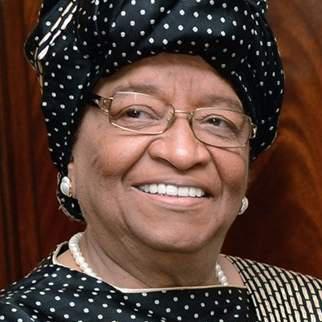
MRS. ELLEN JOHNSON - SIRLEAF
Nobel Peace Prize Winner & Fmr President, Republic of Liberia
“I feel deeply honored to be associated with the African Leadership Magazine as it is a veritable platform to honor true ser vice in Africa. I commend your effor ts and assure you of my continued suppor t and the suppor t of the good people of Liberia.”

DR. AKINWUMI ADESINA President, African Development Bank
“I thank you so much, African Leadership Magazine for the great work that you are doing for the continent. Your tradition of awarding excellence as I have seen in the line up of African Leaders who have received the African Leadership Awards, is something ver y commendable”
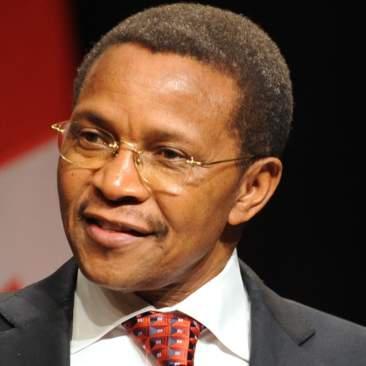
H.E JAKAYA KIKWETE
Fmr. President of Tanzania
“African Leadership Magazine is doing a wonderful job of speaking for Africa and Africans. The magazine remain a good example of what young people in Africa can do in the world. Best wishes in keeping the African dream alive.”
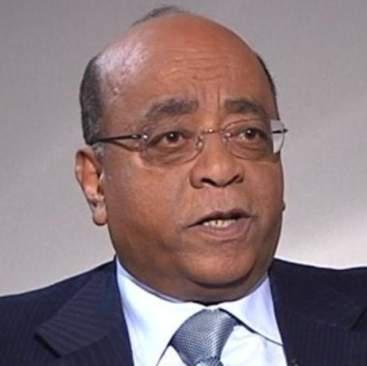
DR. MO IBRAHIM Founder, Mo Ibrahim Foundation
“ The future of African people and improving the quality of Leadership on the African continent is my vision and I find in African Leadership Magazine - a true par tner. I am also happy that the African Leadership Awards is doing at a lower level, what I intend to achieve at the Head of State level. That is why I flew to Paris just to be a par t of what you are doing here at the African Leadership Magazine”
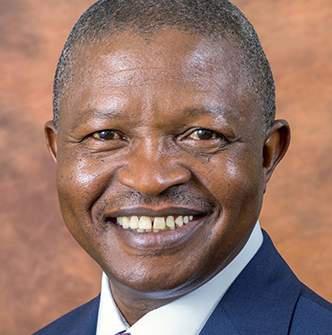
H.E DAVID MABUZA Deputy President Republic of South Africa
“It is an honour to par ticipate at this African Leadership Magazine's 2020 Ceremony, and I commend the magazine's focus to reshape positively, the dominant narratives about the African continent, especially towards the pursuit of peace-building and democracy on the continent”
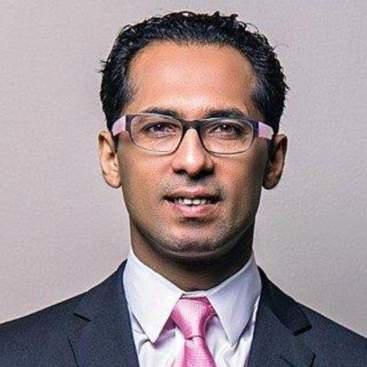
MO DEWJI Tanzania Businessman & Philanthropist
“ The African Leadership Awards truly captures the essence of my message which is that, success shouldnʼt be solely defined by wealth. It should be about the positive impact and influence that one has had in his community ”
NOTABLE
ABOUT AFRICAN
MAGA ZINE
WHAT
LEADERS ARE SAYING
LEADERSHIP
AFRICANLEADERSHIPMAGAZINE
www.africanleadershipmagazine.co.uk
THE INVISIBLE BATTLE: Major Consequences of the African Heatwave

The heatwave gripping Africa is not just a temporary discomfort. It’s a stark reminder of the severe consequences of climate change on the continent. With temperatures soaring to unprecedented levels, many regions in West Africa struggle with multifaceted challenges, ranging from health crises to economic strain. The countries most affected in West Africa include Nigeria, Benin, Togo, Ghana, Ivory Coast, Liberia, and Sierra Leone.
One of the most immediate and devastating impacts of the heatwave was on agriculture. Africa’s predominantly agrarian economies heavily rely on rain-fed agriculture, making them particularly vulnerable to erratic weather patterns. Prolonged heatwaves can lead to droughts, crop failures, and diminished livestock productivity, exacerbating food insecurity and threatening livelihoods. Small-scale farmers, who constitute a significant portion of the population, bear the brunt of these adverse effects, facing diminished harvests and reduced incomes.
A recent study found that a scorching heatwave in West Africa during February was amplified by human-caused global heating, making it 4 degrees Celsius hotter and 10 times more likely. While the exact toll
10 | ISSUE 17.4 | African Leadership Magazine
ENVIRONMENT
in terms of early deaths or illnesses remains unknown due to underreporting, millions have been affected. The heatwave, occurring in the continent’s largest region, further weakened crops already damaged by extreme rainfall in December, leading to soaring food prices.
The scorching temperatures exacerbated health risks, especially in regions with inadequate access to healthcare and limited infrastructure. Heat-related illnesses such as heatstroke, dehydration, and cardiovascular complications became more prevalent, posing a significant threat to vulnerable populations, including children, the elderly, and those with pre-existing health conditions.
In urban areas, where concrete structures and limited green spaces aggravated the urban heat island effect, the risk of heat-related illnesses was further heightened. Despite warnings from meteorological organizations in Nigeria and Ghana, many affected countries lacked adequate planning for the dangerous heat. The February heatwave, occurring early in the year, caught many unprepared.
The heatwave also worsened water scarcity, as higher temperatures accelerated evaporation rates and depleted water sources. Communities dependent on rivers, lakes, and groundwater for their water supply currently face increased hardship, with women and girls often bearing the burden of traveling long distances to secure water for their families.
Decreased agricultural productivity, coupled with increased healthcare costs and infrastructure damage, places a significant
strain on already fragile economies. Moreover, industries such as tourism, which rely on favorable weather conditions, suffer as extreme heatwaves deter visitors and disrupt outdoor activities.
Meanwhile, millions across Ethiopia, Somalia, Kenya, Djibouti, Mauritania, and Niger continue to grapple with the grim reality of prolonged drought conditions. With over 29 million people facing acute food and water shortages, the impact of these droughts on livelihoods and food security cannot be overstated.
Southern African Heatwave:
Southern African nations endured a relentless heatwave, plunging entire regions into summerlike conditions for months on end. With adverse effects on health and the environment, the Southern African heatwave serves as a chilling reminder of the far-reaching consequences of climate change.
International climate research organizations determined that without climate change, such a heatwave would have been a rare event, happening less than once a century. They emphasized the deadly consequences of extreme heat, especially for vulnerable populations such as the elderly, those with health conditions, and outdoor workers. Pointing out that the need for adaptation to climate change is urgent. Yet funding falls short. While wealthy nations can offer support, reaching net-zero emissions remains the ultimate goal to mitigate such crises.

11 ISSUE 17.4 | African Leadership Magazine |
ENVIRONMENT
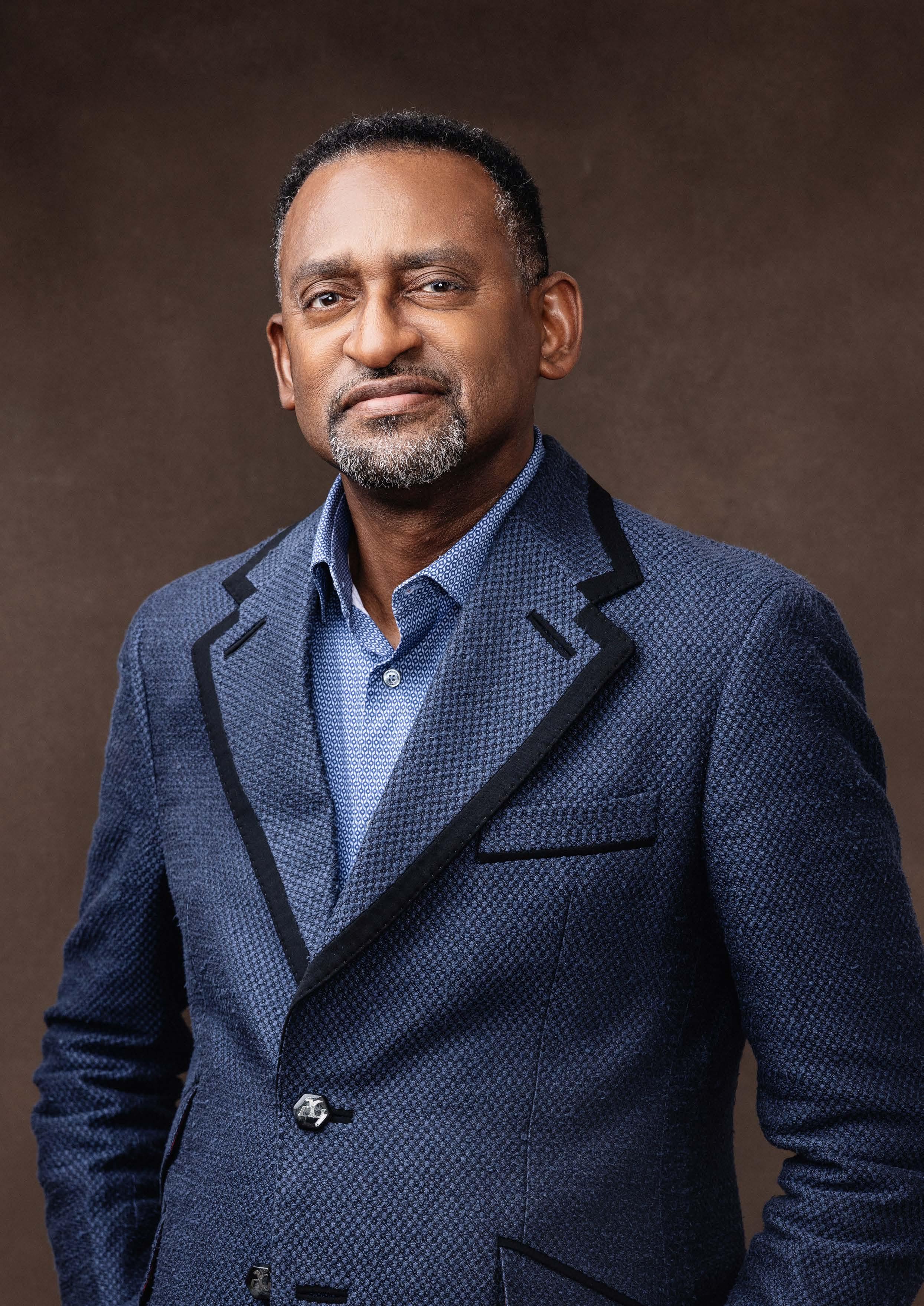
APOSTLE MICHAEL ADEYEMI ADEFARASIN: Charting Global Transformation Beyond the Pulpit
At the heart of Apostle Michael Adefarasin’s leadership ethos lies a deep-seated commitment to empowering individuals for societal transformation. Through his stewardship at Kingdom Lifeline Apostolic Ministries International, he exemplifies a leadership paradigm where authority transcends into nurturing each person’s inherent potential and divine purpose. His ministry stands as a beacon of positivity, devoted to instilling kingdom values that spark positive change within communities. Inspired by Matthew
12 | ISSUE 17.4 | African Leadership Magazine
COVER
28:18–20, Apostle Adefarasin’s vision extends far beyond personal accomplishment, aiming to cultivate a better world for all through transformative leadership.
Apostle Michael Adefarasin takes on the role of a spiritual father, guiding and mentoring leaders on a global scale across continents. Rooted in the principle of sonship, his approach emphasizes nurturing individuals who possess the capacity to lead nations toward their predetermined destiny. Through teaching, coaching, and fathering, he shapes not only leaders but stewards of divine purpose. His unwavering dedication reflects a profound understanding of human existence’s intricate layers, where spiritual fathers mold souls, shaping destinies, and preserving legacies for generations to come.
Join us as we delve into the enigmatic persona of Apostle Michael Adeyemi Adefarasin, embarking on a journey into the depths of his prophetic influence, literary contributions, and groundbreaking ventures into digital teaching platforms. Explore his initiatives in youth development and holistic projects, each a testament to his steadfast commitment to empowering individuals and driving global transformation.
Excerpt
Leadership Insights:
Apostle Michael Adefarasin, as the chief servant of Kingdom Lifeline Apostolic Ministries International, your leadership focuses on empowering leaders for societal transformation. Can you share insights into your approach to ministry leadership and its impact on positive change?
Every individual is created with an intentional design for a redemptive purpose. Leadership involves discerning potential, redemptive purpose, and gift mix to assist individuals in maximizing their potential for divine purposes. Our purpose is to model kingdom values and belief systems to influence society positively, shifting secular cultures to bring the kingdom of heaven on earth through a discipleship mandate as mandated in Matthew 28:18–20.
As spiritual fathers, we raise sons unto God, and the kingdom of God is built on sonship. Different levels of fathering, from advising to mentoring, aim to craft individuals capable of leading nations into their God-ordained destinies. This commitment stems from years of spiritual growth and development, shaping souls to fulfill divine purposes.
Prophetic Influence:
Your unquestionable prophetic anointing has established you as a renowned apostle and teacher. Could you elaborate on how this anointing shapes your ministry and impacts the lives of those you lead and teach?
Understanding one’s identity in Christ and developing one’s gifting is essential. My primary design function is teacher-patron, growing into the function of an apostle with accompanying manifestation gifts. Developing these streams of gifting and acquired skills has been a fulfilling yet challenging journey.
Discipleship is key to bridging the generational gap and transferring divine values to the next generation, shaping future leaders through personalized mentoring and coaching.
Global Mentorship:
Recognized as a spiritual father to leaders worldwide, how do you see your role in providing spiritual mentorship and covering numerous churches globally? What drives your commitment to being a guiding influence on such a vast scale?
Literary Contributions:
You recently published a book, “The Joseph Mandate.” Please tell us about this book and its envisioned impact on Africa’s leadership.
“The Joseph Mandate” explores Joseph’s journey to becoming Prime Minister of Egypt, symbolizing Africa. It outlines Joseph’s transformative role in providing food security and systemic reformation for socio-economic sustainability, presenting a blueprint for African leadership in this era.
Digital Teaching Platforms:
Utilizing platforms like YouTube and Facebook, you share teachings such as “7 Tests to Possessing Your Birth Right.” How do you perceive the role of digital platforms in expanding the reach of your teachings, and what inspired you to embrace these mediums?
13 ISSUE 17.4 | African Leadership Magazine |
COVER
The COVID-19 pandemic prompted us to utilize social media to proclaim the kingdom of God globally. These platforms enable us to chart new kingdom paradigms and navigate the moves of God in these times.
Raising kingdom sons entrusted with legacy, purpose, and resources to advance God’s purpose on earth is imperative. Understanding one’s spiritual growth enables individuals to fulfill their divine purposes.
Youth Development Initiatives: Your ministry has made significant contributions to youth development. Could you share specific initiatives or approaches you’ve undertaken to nurture and develop the youth within your ministry?
Discipleship is key to bridging the generational gap and transferring divine values to the next generation. Personalized mentoring and coaching model kingdom character and lifestyle, shaping future leaders.
Kingdom Sons Mandate: Your mandate of raising kingdom sons unto God signifies a focus on nurturing individuals in their spiritual journeys. How does this mandate shape your ministry’s ethos, and what outcomes do you envision through this focus on individuals?
Global Apostolic Oversight: Balancing apostolic oversight across numerous ministries globally is no small feat. How do you balance this commitment, and what principles guide your approach to global impact?
Maintaining priorities and discerning where I’m needed are crucial. As I progress, I aim to be a blessing wherever God sends me, maintaining a pure motive.
Holistic Development Initiatives: Your involvement in platforms addressing youth and young professionals indicates a commitment to their development. Can you share specific projects or programs you’ve undertaken in these areas?
Advising, teaching, coaching, and mentoring through different expressions contribute to building a new wineskin for the church’s effectiveness in this era.
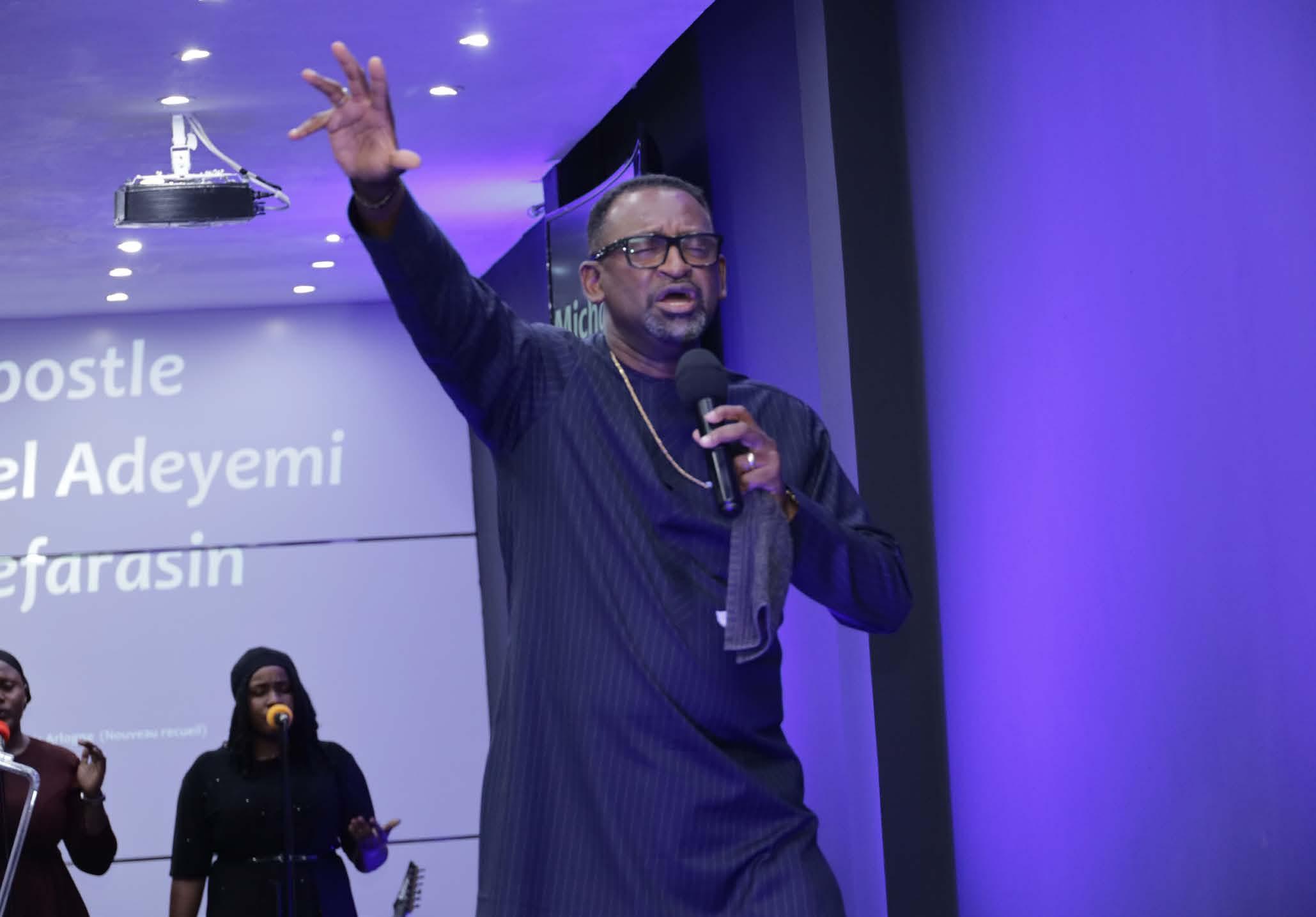
14 | ISSUE 17.4 | African Leadership Magazine
COVER
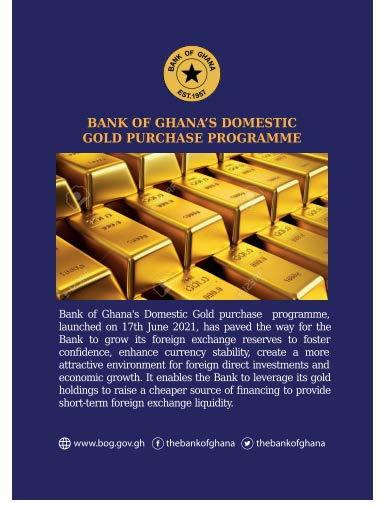

THE JOSEPH MANDATE UNVEILED: Apostle Adefarasin’s Revelation for Modern Leadership
In the heart of every great story lies a profound message—a guiding light of optimism illuminating the path toward understanding and transformation. Within the domain of contemporary leadership, where challenges abound and visions of change flicker like distant stars, few voices resonate with the clarity and wisdom of Apostle Michael Adeyemi Adefarasin. His latest work,
“The Joseph Mandate,” stands as a testament to his profound insights into the cyclical patterns of history, the transformative power of visionary leadership, and the redemptive potential of African nations. In this exclusive interview with African Leadership Magazine, we took a deep dive into the heart of Apostle Adefarasin’s revelations, exploring the inspiration behind his new
16 | ISSUE 17.4 | African Leadership Magazine
POLITICAL LEADERSHIP
book, the timeless lessons gleaned from the life of Joseph, and the urgent call for visionary leadership in Africa’s quest for prosperity and posterity.
Excerpt
What inspired you to write “The Joseph Mandate”?
Since 2008, my perspective has broadened as I’ve delved into the purpose of my existence, grappling with questions of identity, purpose, direction, and legacy. I’ve come to realize that the world operates in cyclical patterns, such as the seven-year cycles of prosperity followed by seven years of famine. Observing historical precedents and global events, I’ve discerned the recurrence of these patterns and recognized the need for proactive solutions to existential challenges, particularly in the face of impending food shortages. Drawing from my African heritage, diverse educational background, and witnessing the struggles of African nations, I’ve developed a deep-seated desire to contribute to addressing the continent’s myriad challenges.
Explore the backstory behind the book and the specific experiences or revelations that led to its creation.
In the early stages, a prophecy dating back to the year 2000, spoken by Prophet Duncan, foretold my future as an author of books and manuals. Secondly, heartfelt thanks are due to Bishop Tudor Bismark of Zimbabwe. A dear daughter, Tomi Ademokun, is from the USA. Jody Byrd and many others, whose persistent encouragement fueled the creation of this book, Within its pages lies a foreword, offering insight into the journey that led to its inception. Furthermore, a chorus of voices echoed the call for me to document the wealth of knowledge I was imparting, prompting the need to commit it to writing.
Foreword by Femi
Awoyemi
Sometime in December 2006, Rev. Yemi Adefarasin (who had just returned to Nigeria from Cotonou, Benin) admonished me during a difficult and trying period about the role of the firm in the market and the economy that would emerge. During a particular visit where I had gone to brief him concerning what I had decided on doing and my approach, he took time to explain to me how God works with, through, and for people. I told him our remit was to become a reputable repository of knowledge on the financial markets, the corporate giants that move them, and the regulatory watchdogs
that keep them in check. Essentially, we would serve as a market confidence bridge through our interventions. He naturally went into meditation and proceeded to explain to me that “whenever God gives a man a vision, there are also other variables that need to be in place for the manifestation of the vision.” Hear him: “When God gives a vision, we have to ask Him for the what (the vision), the when (the timing of the vision), and the where (the position and location of the activities included in the vision).”
A few years later, I invited him to be our guest speaker at the firm’s Knowledge Development Session on January 5, 2008. He delivered what we termed “The Stewardship Mandate” speech that clarified the mission. As he rounded up, he called me aside for a private sit-down where he shared with me his thoughts on the financial system we seek to serve and the revelations God had shown him about the marketplace, the economy, and the personal wealth of Nigerians. And, more importantly, about what is going to happen to the world’s economy. While I found him to be a devoted and wellintentioned man of God, I just could not see or fathom how such could occur in a world economy adjudged by leading entities as fundamentally sound. I struggled with the possibility but soon resolved it in favor of the experts and my training, perhaps based on the commonality of the objective in both positions—to act as a bridge for market confidence and credibility should a bubble occur. I, however, recalled that the year before, our analysts echoed the possibility of a misalignment that was occurring in the United States of America and sought to draw attention to the possible impact of these developments on the high incidence of foreign funds in our financial markets. I decided to take a second look at the data behind the analysis, if only to show him “how things work.” The team devoted considerable attention to the conclusions, and the findings were so compelling that we decided to alert the market to our data-backed analysis and the possible implications of a downturn, relying on the classic thinking that markets work in cycles and we should prepare for a “bear” cycle. This led to the first edition of our now-annual Nigerian Capital Market Report. We, however, could not have imagined that the downturn would have such an impact and sustained period. We, however, subconsciously took some
In the heart of every great story lies a profound message—a guiding light of optimism illuminating the path toward understanding and transformation.
17 ISSUE 17.4 | African Leadership Magazine |
POLITICAL LEADERSHIP
Joseph’s journey exemplifies resilience, forgiveness, and visionary leadership, offering timeless lessons for navigating life’s challenges.
steps that allowed our subscribers to protect themselves and exit earlier than the crash that occurred thereafter. No sooner had we done this that we started having problems, including a major site functionality failure, which led to the loss of the ability to reach our more than 80,000 discerning subscribers, amongst many other challenges. Wading through this occupied our attention and created doubts. It is to the credit of Michael Adeyemi Adefarasin that he offered us encouragement and belief to stay on course through the words of Ezekiel 25:17 and the principles he set out in what he called understanding the Joseph Mandate. In his words, then: “Joseph, through the wisdom of the Lord, correctly interpreted the dream of Pharaoh; analyzed future economic trends prophetically and thus proffered economic strategies in lieu of his understanding of the times and seasons of God as interpreted through the dreams of a heathen king. This is the day of the interpreters (analysts). Because the spirit of the Lord was in Joseph, he functioned in the wisdom of God. Only those who are walking in Christ can have the ability to discern the times as interpreted through the word of God.” He went on to say that only those who are stewards of the manifold wisdom of God can have eyes to see and hear what the Spirit is saying to the church. He spoke about the advent of technology, money bags, food sacks, and strength in numbers to provide leverage for commerce. We have published his session and continue to revisit it ever so often. The mandate mindset has seen us through sixteen uninterrupted years of continuously learning how to stay on purpose and seeking a deeper understanding of our raison d’être. It is my hope, therefore, that this long-awaited book will enrich us further in that pursuit. The book’s central message is a powerful call to action for the reader.
Olufemi M. Awoyemi, mni
June 16, 2023
Discuss how Joseph’s life and journey exemplify a divine mandate and how it relates to our lives and African society today.
Joseph’s journey unfolds predominantly in
Egypt, often symbolizing Africa, known as the land of the Nile. At just seventeen, he receives a prophetic dream outlining his destiny. This dream sets off a chain of events: betrayal by his brothers, being sold into slavery, serving in Potiphar’s household, enduring false accusations, and ultimately interpreting dreams in prison. Through these trials, he hones his character and leadership skills. Joseph’s ability to interpret dreams catches the attention of Pharaoh, leading to his appointment as prime minister of Egypt. His visionary leadership and integrity enable him to implement systemic reforms, bringing about economic prosperity and food security not only for Egypt but for the world suffering from famine. Yet, Joseph’s story also mirrors Africa’s plight: a continent rich in resources, yet its own people are often deprived of its benefits. Joseph’s mission underscores the importance of harnessing Africa’s potential for the betterment of its own people and the world at large. His example reminds us of the need for visionary leadership and integrity to unlock Africa’s potential and fulfill its redemptive purpose.
Kindly draw parallels between Joseph’s struggles and the challenges people face today, both personally and globally. What key principles or lessons can readers learn from Joseph’s life?
Firstly, Joseph’s story highlights the theme of resilience in the face of adversity. Despite facing betrayal, slavery, and imprisonment, Joseph remained faithful to his beliefs and maintained his integrity, eventually rising to a position of authority and influence. This resilience speaks to the challenges many individuals in African society face today, whether it be political instability, economic hardships, or social injustices. Joseph’s ability to persevere through such trials serves as an inspiration for people to remain steadfast in their faith and convictions, even in the midst of difficulties. Secondly, Joseph’s story underscores the importance of forgiveness and reconciliation. Despite the harm inflicted upon him by his brothers, Joseph ultimately forgave them and sought reconciliation with them. This act of forgiveness not only restored Joseph’s relationship with his family but also paved the way for healing and reconciliation within the broader community. Most importantly, it was of paramount importance to forgive his brothers, as they were the very same people whose lives and posterity he was to preserve in order to fulfill the destiny that God had dreamed for him. In contemporary African society, where ethnic tensions, tribal conflicts, and historical injustices often divide communities, Joseph’s
18 | ISSUE 17.4 | African Leadership Magazine
POLITICAL LEADERSHIP
example of forgiveness and reconciliation offers a powerful lesson. It encourages individuals and communities to confront the wounds of the past, seek forgiveness, and work towards building a more harmonious and inclusive society. Furthermore, Joseph’s rise to power in Egypt and his subsequent efforts to mitigate the impact of famine demonstrate the importance of visionary leadership and strategic planning in times of crisis.
Joseph’s foresight and administrative skills enabled him to implement effective measures to address food shortages, thereby saving countless lives. In today’s Africa, where many nations grapple with issues such as food insecurity, poverty, and inadequate infrastructure, Joseph’s example serves as a reminder of the transformative power of visionary leadership and proactive governance. It underscores the need for leaders who prioritize the well-being of their citizens and are willing to implement bold, forward-thinking policies to address pressing challenges. Overall, Joseph’s life and journey offer timeless lessons that are relevant to our lives and the complexities of contemporary African society. His story of resilience, forgiveness, and visionary leadership continues to inspire individuals and communities to overcome adversity, foster reconciliation, and strive for a brighter future. For that to happen, the processes served to develop all the streams of gifting side by side with character development and the right attitudes required to fulfill God’s dream for him. The culmination of all these events in his life is elucidated in words that echo down the corridors of eternity and the annals of history, as Joseph surmised. “Do not be afraid, for I am in God’s place. As for you, you meant evil against me, but God meant it for good in order to bring about this present result, to preserve many people alive. So therefore, do not be afraid; I will provide for you and your little ones.” Thus ends the final chapter of his life; the Joseph mandate has been fulfilled. Explore the transformative and reformative lessons that readers can apply to their own lives, businesses, or ministries.
Certainly! Drawing from the biblical story of Joseph, readers can glean several transformative and reformative lessons to apply to their lives, businesses, or ministries: Resilience and Faith: Despite facing betrayal, slavery, and imprisonment, Joseph maintained his faith in God and remained resilient. Readers can learn to trust in their faith and persevere through difficult times, believing that better days are ahead. Forgiveness and Redemption: Joseph forgave his brothers for selling him into slavery and ultimately helped save them from famine. This demonstrates the power of forgiveness
and the potential for redemption, encouraging readers to let go of grudges and seek reconciliation in their relationships for a higher purpose. Strategic Planning and Leadership: Throughout his trials, Joseph demonstrated strategic thinking and effective leadership, rising to positions of authority in both Potiphar’s house and Pharaoh’s court. Readers can learn the importance of planning, adaptability, and integrity in leadership roles, whether in business or ministry. Most importantly, he served with the motive of fulfilling the interests, success, and well-being of his masters at the expense of his own. precipitatory to attaining the pinnacle of leadership success and stewardship. Humility and Service: Despite his elevated status in Egypt, Joseph remained humble and served others, particularly during the famine when he provided food to the starving masses. This teaches readers the value of humility, generosity, and using one’s position to help those in need. The redemptive purpose of every business is to be a lifeline to the communities within which it is divinely placed by funding the value systems that advance that cause on earth. Divine Providence and Purpose: Joseph recognized God’s hand in his life, even during times of hardship, and understood that his experiences were part of a larger plan. Readers can reflect on the idea that challenges and setbacks may ultimately serve a greater purpose, guiding them toward their own destiny or calling. Joseph developed all four streams of gifting that enabled him to fulfill his redemptive purpose as a ruler, administrator, organizer, and over Africa. Every business has the redemptive gift of being a lifeline to the community it serves. Joseph’s struggles resonate with the challenges faced by people today, both personally and globally. Firstly, his experience of betrayal by his own brothers reflects the betrayal and distrust often experienced in personal relationships and communities. Many individuals today face similar struggles with trust and betrayal, whether in friendships, families, or workplaces. Joseph’s journey from slavery to leadership parallels the struggles of marginalized and oppressed populations worldwide. His resilience in the face of adversity serves as an inspiration for those facing systemic injustices, discrimination, or socioeconomic barriers. Moreover, Joseph’s imprisonment due
The role of the church, or Ekklesia, in promoting social justice and positive change is rooted in its prophetic voice, community engagement, and spiritual transformation.
19 ISSUE 17.4 | African Leadership Magazine |
POLITICAL LEADERSHIP
to false accusations highlights issues of injustice and wrongful imprisonment that persist today. Many individuals around the world are unjustly incarcerated or denied fair trials, highlighting the need for reforms in legal systems and criminal justice practices.
On a global scale, Joseph’s role in managing the famine in Egypt illustrates the challenges of food insecurity and economic crises faced by nations today. His leadership and strategic planning offer lessons in addressing such crises through proactive governance, resource management, systemic reformation, and humanitarian aid efforts. Key principles and lessons from Joseph’s life include resilience in adversity, forgiveness and reconciliation, integrity in leadership, and the importance of trusting in a higher purpose or destiny. Readers can learn the value of maintaining faith and integrity during trials, the power of forgiveness in healing relationships, and the necessity of visionary leadership in addressing societal challenges. Overall, Joseph’s story serves as a timeless example of overcoming adversity, navigating challenges with grace, and using one’s experiences for positive transformation and impact. By studying Joseph’s journey and applying these transformative lessons, readers can find inspiration and guidance for navigating their own trials, leading with integrity, and seeking meaning and purpose in their lives, businesses, or ministries.
The future of leadership in Africa hinges on models that build lives, add value, and prioritize the well-being of communities, embracing transitional and succession leadership for lasting impact.
Explore the role of the church in addressing social issues, promoting social justice, and bringing about positive change.
The term “Ekklesia” refers to the community of believers, or the church in Greek, particularly in the New Testament context. The role of the Ekklesia in addressing social issues, promoting social justice, and bringing positive change is deeply rooted in its mission to embody the teachings of Jesus Christ and advance the Kingdom of God. Here’s how the Ekklesia can fulfill this role: Prophetic Voice: The Ekklesia has a prophetic role in speaking truth to power and confronting social injustices. Inspired by the prophets of the Hebrew Bible, the
Ekklesia calls attention to systemic oppression, inequality, and exploitation, challenging individuals, institutions, and governments to uphold justice and Community Engagement: The Ekklesia actively engages with the community and advocates a value and belief system to shape the culture of society into a kingdom culture. Through outreach programs, community service, and partnerships with local organizations, the Ekklesia works to meet the practical needs of the marginalized, foster solidarity, and build bridges across social divides.
As a legislative body, the Ekklesia advocates for policy changes and systemic reforms to address the root causes of social injustice. This will involve training and discipling younger men and women to occupy the gates of government and governance to promote justice and righteousness in all strata of society. As a judicial body of intercessors, the Ekklesia must litigate issues of state to remove legal ground from the powers of darkness to deny God’s blessings upon the communities of people.
Spiritual Transformation: Recognizing that social change begins with personal and spiritual transformation, the Ekklesia nurtures disciples who are committed to embodying the values of the Kingdom of God in their everyday lives. Through worship, prayer, study, and discipleship, believers are empowered to live out their faith authentically and to be agents of positive change in the world.
What future do you see for leadership on the continent, and what advice do you have for our leaders?
Exemplary leadership. By that, I mean that the foundation of all leadership is centered around the motivation to make others successful at the expense of self-interest. Visionary leadership: envisioning the blueprints and patterns of Christ and establishing them on earth. Leadership that builds lives and adds value to others first. Selfless leadership: that promotes the interests of its communities; it is divinely mandated to serve above all else under heaven. Servant leadership: the motivation for leadership must be based on service as servants. Transitional leadership: constructing the platform for future leaders to do greater works. Succession leadership: tri-generational leadership that has posterity as its legacy. Our leadership mentality must change from institutional, centralized pyramidical models to servant, organic, and bottom-up (inverted pyramid) mindsets.”
20 | ISSUE 17.4 | African Leadership Magazine
POLITICAL LEADERSHIP


AFRICA IT’S TIME TO RISE TO A GLORIOUS AND PROSPEROUS FUTURE
Africa is destined to play a pivotal role in the world's future. But the process to its greatness is not without challenges. Despite its trials and tribulations, its vast potential remains largely untapped. The world needs to understand Africa’s predetermined rise to transformative leadership to bring sustainable social-economic revival. God is raising a Joseph-type people, under this mantle that will play a critical role in the divine redemptive plan for what has been predestined in these end times. The mandate requires the character development processes to attain rulership for the interpretation of the God dreams for kings, so as to proffer innovative solutions by predictable outcomes through an understanding of future times and seasons. It’s time for Africa to arise! Together we can build an enabling environment to bring systemic reformation and transformation for sustainable social-economic revival amid global crisis.
Connect with the Joseph Mandate.





www.michaeladeyemiadefarasin.org AVAILABLE NOW AT
M I C H A E L A D E Y E M I A D E F A R A S I N
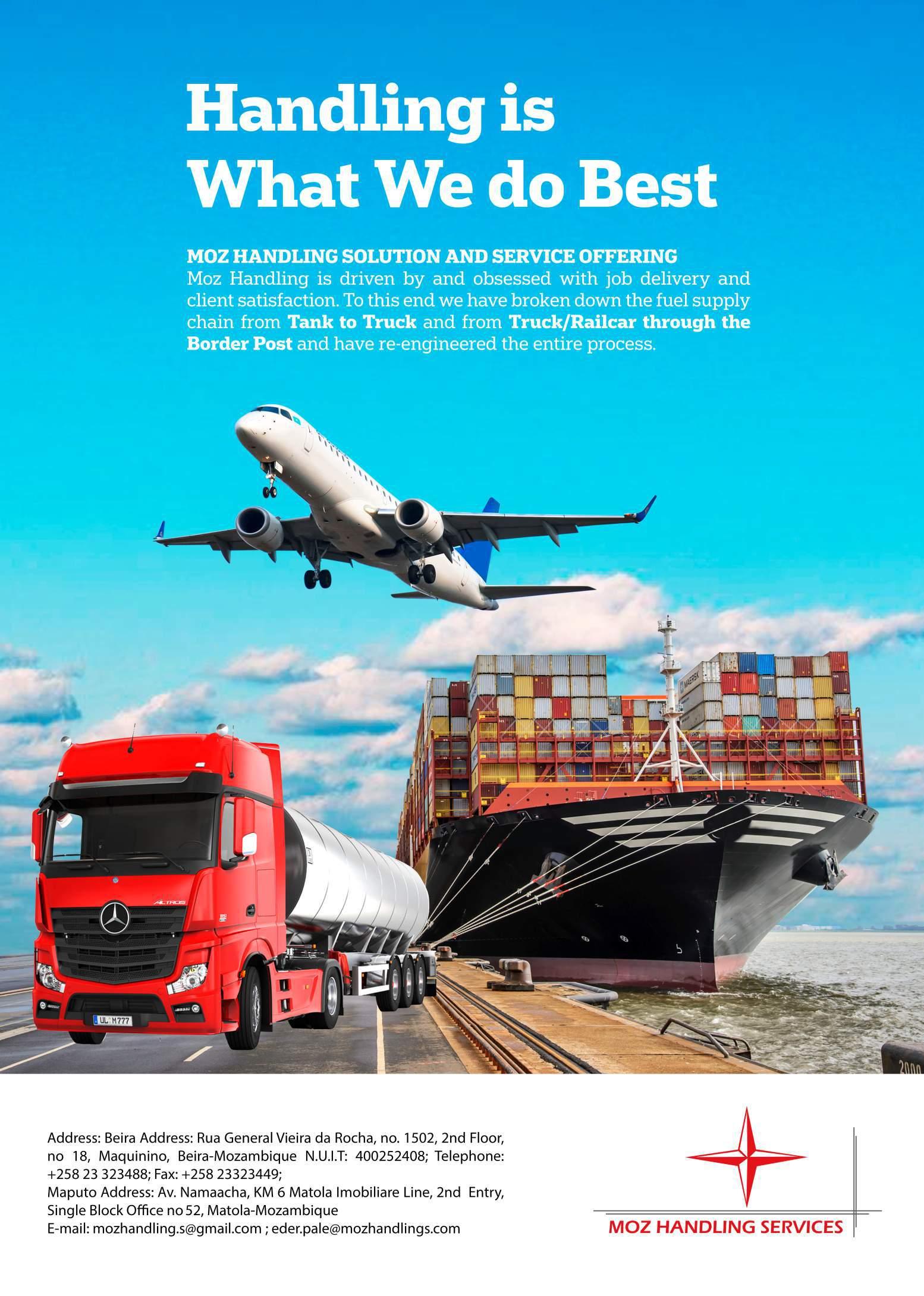

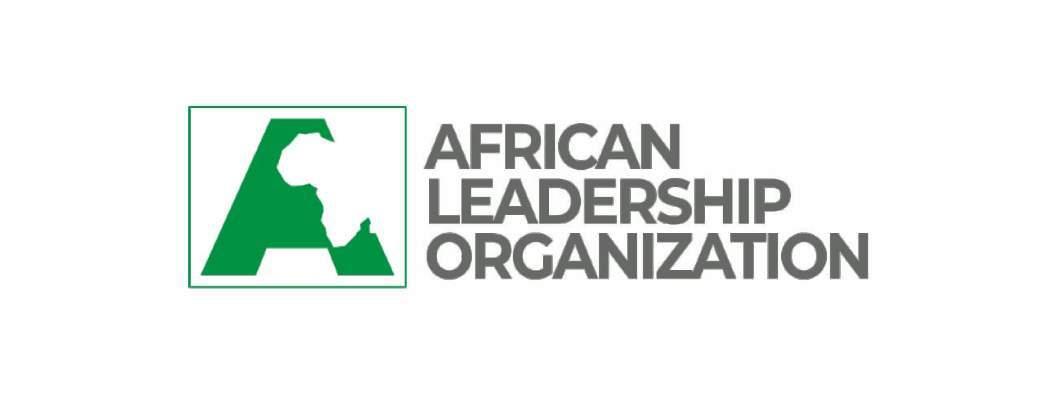
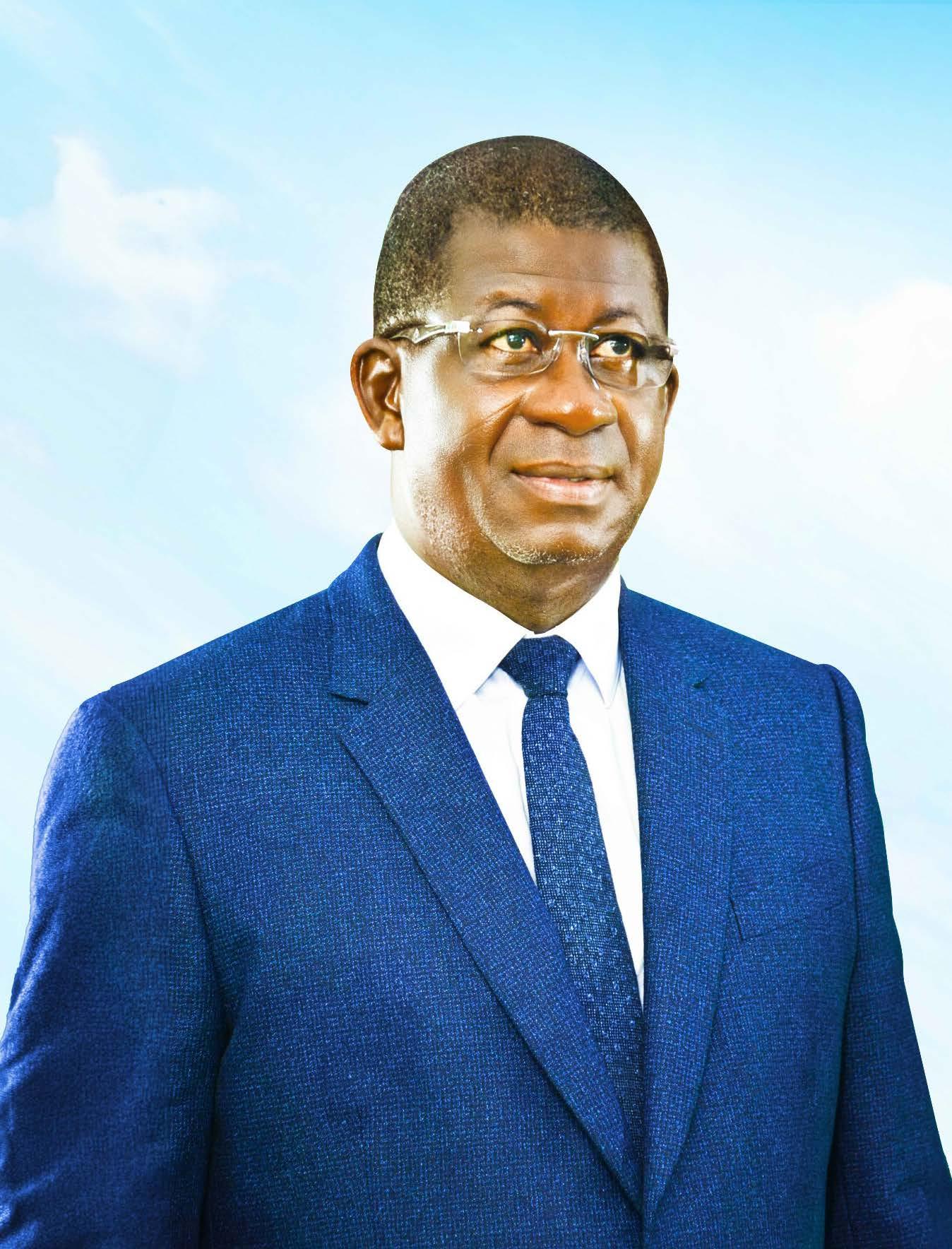
HIEN YACOUBA SIE
Autonomous Port of Abidjan: West Africa’s Maritime Powerhouse
In this exclusive interview session, we delve into the remarkable journey of Mr. Hien Yacouba Sie, the Director General of the Autonomous Port of Abidjan, who has been instrumental in steering one of West Africa’s pivotal maritime hubs towards unprecedented success. The Autonomous Port of Abidjan stands as a beacon of economic vitality, not only for Côte d’Ivoire but also for the broader West African region. At its helm, Mr. Sie has spearheaded strategic initiatives aimed at fortifying the port’s position as a maritime juggernaut, catalyzing growth, and fostering regional integration.
24 | ISSUE 17.4 | African Leadership Magazine BUSINESS LEADERSHIP
Embarking on his role in 2011, Mr. Sie aligned his vision with that of H.E. Alassane Ouattara, the President of the Republic of Côte d’Ivoire, to elevate the nation’s economy to new heights of prosperity. Faced with the imperative to modernize aging infrastructure and surmount the lingering effects of historical crises, Mr. Sie embarked on a bold agenda of revitalization. Under his leadership, the Port of Abidjan embarked on a comprehensive modernization program, encompassing vital projects such as channel widening, terminal expansions, and state-of-the-art facilities construction. These endeavors, collectively valued at approximately 1.796 billion US dollars, have not only addressed critical deficiencies but have also positioned the port as a paragon of efficiency and competitiveness in the maritime landscape.
Excerpt
The autonomous port of Abidjan plays a crucial role both in the national economy and in the broader West African region. Could you explain the strategic initiatives implemented to maintain Côte d’Ivoire’s position as a maritime hub in West Africa?
Aligned with the vision of the President of the Republic of Côte d’Ivoire, H.E. Alassane Ouattara, who has aimed since taking office in 2011 to make the Ivorian economy one of the strongest and most prosperous in Africa, the Port Authority decided to support this ambition by implementing a program to modernize the infrastructure of the Port of Abidjan. This decision aimed to make this port the leader of the West African Coast and a reference hub on the Atlantic coast of Africa.
Furthermore, there was an urgency to launch this program, as the Port of Abidjan had experienced a certain delay due to a long period of non-investment in structuring projects following the various economic and sociopolitical crises that Côte d’Ivoire experienced from the 1980s until 2010.
Indeed, when we took office in 2011, the Port of Abidjan was experiencing severe congestion in storage spaces and handling access roads, and it was unable to accommodate the large vessels frequenting African shores. We therefore had to react urgently and provide sustainable solutions so that the Port of Abidjan would not become a bottleneck for the Ivorian economy, which was about to enter a phase of strong growth.
We thus defined a strategic plan with clear objectives and major projects, namely: (i) widening and deepening the entrance channel of the Vridi Canal (the main access route to the port); (ii) modernizing the fishing terminal;
(iii) creating additional industrial and logistics land by reclaiming 40 hectares of lagoon water; (iv) constructing a roll-on/roll-off terminal; (v) constructing a second container terminal; (vi) constructing a grain terminal.
Today, we are proud to have completed all these major projects, which were prioritized in our main strategic plans covering the periods from 2011 to 2016 and from 2017 to 2022, and which required an investment of approximately 1,100 billion CFA francs, equivalent to approximately 1.796 billion US dollars.
These new infrastructures are operational and significantly contribute to strengthening the competitiveness and attractiveness of the Port of Abidjan, which is a catalyst for the national and subregional economies.
The development infrastructure is crucial for optimizing port operations. Can you give us an overview of recent projects or efforts aimed at improving the efficiency or capacity of the autonomous port of Abidjan?
Over the span of a decade, we have successfully completed the following: Modernization of the fishing terminal by constructing an 8.2-hectare pier with 1,060 meters of quays and water depths of up to 13 meters in some areas. This structure, costing 33.5 billion CFA francs (54.7 million US dollars), was inaugurated on September 21, 2015. It accommodates the largest trawlers supplying the tuna canneries located in the port and the surrounding area. New industrial units and large-capacity cold storage warehouses are installed on its platform.
Embarking on his role in 2011, Mr. Sie aligned his vision with that of H.E. Alassane Ouattara, the President of the Republic of Côte d’Ivoire, to elevate the nation’s economy to new heights of prosperity.
Creation of additional spaces by reclaiming 40 hectares on the Vridi-Biétry lagoon bay to meet the high demand from industrial and logistics companies wishing to establish themselves near the docks to reduce transport costs and delivery times. This project also solved the congestion problem caused by the saturation of storage spaces in the port. After 36 months of work, these lands have been available to economic operators since March 2018.
25 ISSUE 17.4 | African Leadership Magazine |
BUSINESS LEADERSHIP
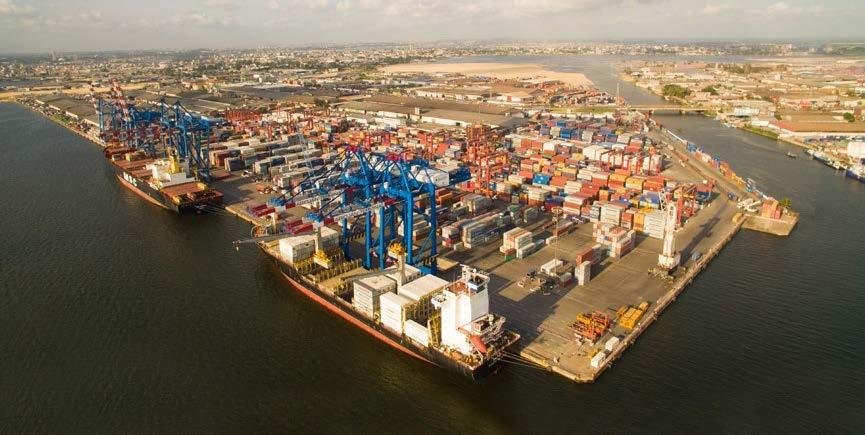
Construction of a modern roll-on/roll-off terminal has been operational since March 2018. The existing RoRo quay, no longer meeting operational requirements due to shallow water depths and limited storage space, necessitated the construction of this new infrastructure. The project involved creating 8 hectares of landfills, two quay berths over... meters, and a water depth of 14 meters. This project required a total investment of 79 billion CFA francs (1.29 million US dollars). Equipped with modern superstructures and machinery, this terminal has an annual processing capacity of 70,000 rolling units.
Resizing of the Vridi Canal, which, since February 21, 2019, can accommodate container ships with a draft of 16 meters without length limitations and is capable of carrying up to 14,000 TEUs. These are the largest vessels navigating the African coast. Before this date, the Port of Abidjan only admitted vessels with a draft of 11.5 meters and a length of less than 250 meters. One of the significant advantages of this project is the considerable reduction in waiting time for ships, which is almost nil today. This large-scale project, lasting four years, cost 151 billion CFA francs (246.49 million US dollars).
Construction of a second container terminal (TC2). As a flagship project of our Port of Abidjan modernization programme, it was initiated to catch up with our backlog in container handling. With the rapid growth of containerization and the resulting revolution in the maritime industry, the first container terminal had become a weak link in our port performance. We could not accommodate vessels with drafts exceeding 11.5 meters, unlike some of our competitors. To address this issue, we started construction of TC2 in
October 2015, concurrently with the Vridi Canal project, as the two projects complement each other. With this new terminal, we aim not only to accommodate the largest container ships but also to double the container handling capacity at the Port of Abidjan from 1 million to 2.5 million.
After a total investment of 596 billion CFA francs (972.90 million US dollars), with 334 billion CFA francs for infrastructure and 262 billion CFA francs for superstructures, the works are complete, and the terminal has been operational since December 2022.
Built on 37.5 hectares of land, with quay lengths of... meters and a draft of 16 meters, TC2 is an ultra-modern terminal with 6 quay cranes, 13 yard cranes, 36 tractors, and 2 telescopic elevators. Operating almost all of its equipment with electrical energy gives it the “green terminal” label, which is advantageous in terms of our environmental commitment. Finally, the construction of a grain terminal will position the Port of Abidjan as a sub-regional grain hub. With this new facility operational since May 2023, the Port of Abidjan can now accommodate and handle bulk carriers of 70,000 tonnes, compared to 35,000 tonnes previously. This represents a significant opportunity for millers to achieve economies of scale in import costs. This terminal cost 73.282 billion CFA francs (119.62 million US dollars).
With all these works carried out between 2012 and 2023, we believe we have significantly addressed the weaknesses of the Port of Abidjan to ensure its competitiveness for the next 50 years and effectively support national and sub-regional economies.
26 | ISSUE 17.4 | African Leadership Magazine
BUSINESS LEADERSHIP
The autonomous port of Abidjan has experienced significant growth both in terms of its annual traffic and its services. How do you envision the evolution of the port’s role in the coming years, given the ongoing or future development projects?
The Port of Abidjan aspires to be the central hub of maritime transport in the region. To achieve this, during the decade from 2012 to 2022, we focused our investments on the waterfront to bring our facilities up to international standards through the implementation of various projects, as we have just discussed.
Today, our main challenge lies in improving the access roads to the port. To address this challenge, the Ivorian government is working on several projects to improve the flow (by land, lagoon, and rail) within the port and throughout the Abidjan metropolis. Among these projects, we can mention: the rehabilitation of the Félix Houphouët-Boigny Bridge; the construction of the 4th bridge connecting the communes of Plateau and Yopougon; the development of a bypass highway around the city of Abidjan called the “Y4”; and the rehabilitation of the port boulevard (ongoing with the MCA).
Furthermore, the effective extension of the northern highway to Bouaké (in the centre of the country) offers shorter travel times for trucks from the hinterland (Burkina Faso, Mali, and Niger) to and from the Port of Abidjan.
With these infrastructures and many other projects, the Port of Abidjan will not only strengthen its role in supporting the dynamism of the national and sub-regional economies but also its ambition to be an indispensable port hub on the West African Coast.
As a leader in the maritime industry, what are the main challenges and opportunities you face in ensuring the safety, security, and sustainability of port operations?
The Port of Abidjan has been ISPS Codecertified since July 1, 2004. The question of financing the port security system arose immediately, and like many ports worldwide, the Port Authority of Abidjan decided in 2005 to finance the implementation of security measures through fees.
Unfortunately, these fees proved insufficient to fund all necessary investments, leading us to the decision, starting in 2013, to concession this area to a private operator specializing in integrated port security systems, in line with international standards.
The investments made under this concession have resulted in several achievements: A high-performing video surveillance system covers the port area (including the water basin). Upgrading and modernizing access control booths in the customs area.
Enhanced access control for goods and personnel at these booths.
Effective patrols, both on foot and motorized, on docks, in warehouses, and on the water and outer harbor (using patrol boats).
Efficient control of goods destined for export and provisioning.
These measures have addressed numerous challenges, including theft and vandalism of port installations and equipment, clandestine immigration, maritime robbery (armed robbery in port waters), drug trafficking and other illicit activities, terrorism, piracy, and illegal fishing.
Furthermore, another significant result of these new measures is the removal of the Port of Abidjan from the U.S. Coast Guard’s blacklist, opening up various opportunities, such as: Direct shipment of goods from Abidjan to the United States, facilitating trade between Côte d’Ivoire and the United States under AGOA.
Under his leadership, the Port of Abidjan embarked on a comprehensive modernization program, encompassing vital projects such as channel widening, terminal expansions, and state-ofthe-art facilities construction.
Increased transshipment container traffic is due to maintaining ISPS code certification, making the Port of Abidjan safer and more competitive, thus reinforcing our ambition to become the third most important “Hub port” on the Atlantic coast of Africa, between Tanger in Morocco and Durban in South Africa.
Improvement in the freight rate to the Port of Abidjan is partly due to reduced insurance premiums, potentially leading to increased vessel and cargo traffic. Savings on guard costs for port companies are due to the efficiency of the Port of Abidjan’s security system.
Additionally, to address the challenges of port operation sustainability, we have focused on improving the quality of our services and complying with environmental requirements. Over the past decade, we have deployed
27 ISSUE 17.4 | African Leadership Magazine |
BUSINESS LEADERSHIP
management systems that enable our company to comply with international standards. This has led to obtaining ISO 9001:2015 certification for improving our services, ISO 14001:2015 certification for compliance with international environmental clauses and standards, and recently ISO 27001:2022 certification for strengthening our information security management system.
The autonomous port of Abidjan contributes not only to national economic activity but also to job creation and industrial development in Côte d’Ivoire. How does the Port promote partnerships and initiatives to support local communities and enhance socioeconomic empowerment?
The Port of Abidjan is a major logistics and industrial hub that, according to a recent study conducted by our services, generates approximately 55,416 direct jobs and 10,254 indirect jobs. Beyond its significant economic role, the autonomous port of Abidjan aims to be a leading social actor. Our commitment focuses on strengthening gender promotion and excellence. To this end, we have:
Over the span of a decade, we have successfully completed the following: Modernization of the fishing terminal by constructing an 8.2-hectare pier with 1,060 meters of quays and water depths of up to 13 meters in some areas.
Signed a partnership agreement with the Mathematics Society of Côte d’Ivoire to support this institution in its efforts to generate more interest in scientific and technological fields among young girls, starting with their school curriculum.
Enrolled about ten employees of the company in gender training, in partnership with the UNESCO Chair on Water, Women, and DecisionMaking Power. These professionals, including six women, are now experts in gender engineering.
How do you actively support and promote the advancement of trade within the ECOWAS (Economic Community of West African States) sub-region and across Africa, closely aligning with the goals of the African Continental Free Trade Area (AfCFTA)?
Maritime transport plays a crucial role in the value chain driven by the implementation of the AfCFTA. Although all modes of transportation are involved, maritime transport is essential as it is the fastest and most cost-effective means to transport large quantities of goods over long distances. It is therefore fitting that ports are called upon to play a leading role in this continental project, given that they are essential entry and exit points for international trade, and their efficiency directly impacts the functioning and success of the AfCFTA. The Port Authority of Abidjan is actively engaged in contributing to the success of the AfCFTA through maritime transport and is preparing its port, with government support, to effectively handle, alongside all other Ivorian stakeholders, the influx and processing of intra-African trade volumes in the West African sub-region.
Over the past decade, the necessary reforms and investments have been made to ensure that the Port of Abidjan provides services that meet the capacity, efficiency, and security criteria expected. Additionally, cooperation agreements have been established and strengthened in certain areas. In this regard:
Capacity: The investment programme for infrastructure and equipment development has significantly increased the capacity of the Port of Abidjan, meeting the needs arising from the growth in volumes anticipated by the implementation of the AfCFTA.
Efficiency of handling operations: The various terminals at the Port of Abidjan are operated by internationally renowned operators, demonstrating proven expertise. These capabilities enable us to achieve operational performances in line with international standards regarding the handling of vessels and their cargoes, significantly reducing waiting times for vessels at anchor and their stay in the port.
Port security: Port security and safety are permanent concerns for the Port Authorities of Abidjan. Numerous efforts are made each year to ensure that port facilities comply with international requirements. Since July 2004, the Port of Abidjan has been declared compliant with ISPS code standards, and this certification has been regularly renewed following periodic compliance audits conducted by the U.S. Coast Guard.
Regional cooperation:
Cooperation with hinterland countries is a reality due to the presence of CBC, EMACI, and CNUT within the Abidjan Port Community as members. These structures participate
28 | ISSUE 17.4 | African Leadership Magazine
BUSINESS LEADERSHIP
in various consultation meetings aimed at making important decisions that may impact the activities of operators in their respective countries.
The PAA is a member of AGPAOC and therefore participates in discussions within regional initiatives to improve the efficiency of maritime transport in West and Central Africa. The Port Authority of Abidjan has signed several cooperation agreements with African ports, including agreements with the following ports: the Port Authority of Douala (Cameroon), the Port of Casablanca (Morocco), and the Port of Agadir (Morocco). a twinning agreement between the fishing port of Abidjan and the fishing port of Dakhla (Morocco).
During major disruptions such as the COVID-19 pandemic and the RussoUkrainian conflict, we have all witnessed significant impacts on commercial activities in Africa. How have you overcome these challenges to ensure resilience and encourage innovation to support the movement of goods and services in the region?
To address this question, let’s first focus on the specific case of the COVID-19 pandemic.
In 2020, we urgently faced the devastating consequences of this unprecedented pandemic that disrupted the entire world. Given the global nature of this crisis, we had to adhere to government decisions made during meetings of the National Security Council, which served as the basis for establishing a crisis management plan at the port platform. This crisis management plan, with its main objectives of preventing the spread of the pandemic through the Port of Abidjan and ensuring the continuity of port operations, focused on: Developing a business continuity plan in the event of total lockdown.
Raising awareness among all stakeholders and users of the port platform to strictly adhere to barrier gestures and systematically inspecting all ships from countries affected by COVID-19 to prevent the Port of Abidjan, a maritime border, from becoming an entry point and spreading the virus in Côte d’Ivoire and beyond.
Establishing a framework for permanent dialogue among key port actors for greater responsiveness to the various obstacles and difficulties faced by shipowners and shippers. Establishing a surveillance committee within the port community to ensure the smooth operation of port activities during this health crisis. Taking urgent measures to ensure the regular supply of essential food, pharmaceutical, and sanitary products to the national populations
and those of the hinterland countries (Burkina Faso, Mali, and Niger).
Suspending demurrage charges (late penalties) on goods pending in the port since the start of the crisis.
Waiving storage fees for goods. Implementing electronic transmission of manifests and time sheets.
Regarding the Russo-Ukrainian crisis, it’s worth noting that these two countries are significant trading partners of Côte d’Ivoire and, consequently, the Port of Abidjan. Trade primarily involves imports of wheat, iron, fertilisers, and petroleum products. During this conflict, port operators (shippers) aimed to diversify their sources of supply for certain raw materials (oil, canned goods, etc.) from Europe to Asia. In such a context, the Port of Abidjan continued to provide its clients with a safe and dynamic space for the passage of their various cargoes under the best conditions.
Finally, based on your role as the Director General of the Autonomous Port of Abidjan, what are the port achievements you are most proud of?
The Autonomous Port of Abidjan stands as a beacon of economic vitality, not only for Côte d’Ivoire but also for the broader West African region.
To date, our greatest satisfaction is having successfully caught up with the backlog that the Port of Abidjan has experienced in terms of implementing key infrastructure to support its ambitions and those of Côte d’Ivoire, a country that has been experiencing significant economic growth over the past decade. Among these projects, the most significant in terms of added value to port operations is the resizing of the Vridi Canal and the construction of the second container terminal. These two projects, in particular, will firmly position the Port of Abidjan as the primary sub-regional port hub.
We have also managed to raise our level of safety and security to the extent that direct exports from the Port of Abidjan to the United States are once again possible. This is highly beneficial for the Ivorian economy. All of this has allowed us, in 2023, to achieve a growth rate of 21% in overall traffic, with 34.8 million metric tonnes of goods handled. We also handled 1.2 million TEUs across both container terminals, placing the Port of Abidjan among the ranks of the world’s largest container ports.
29 ISSUE 17.4 | African Leadership Magazine |
BUSINESS LEADERSHIP
MUSTAFA CHIKE-OBI: Perspectives on Leadership and Economic Realities
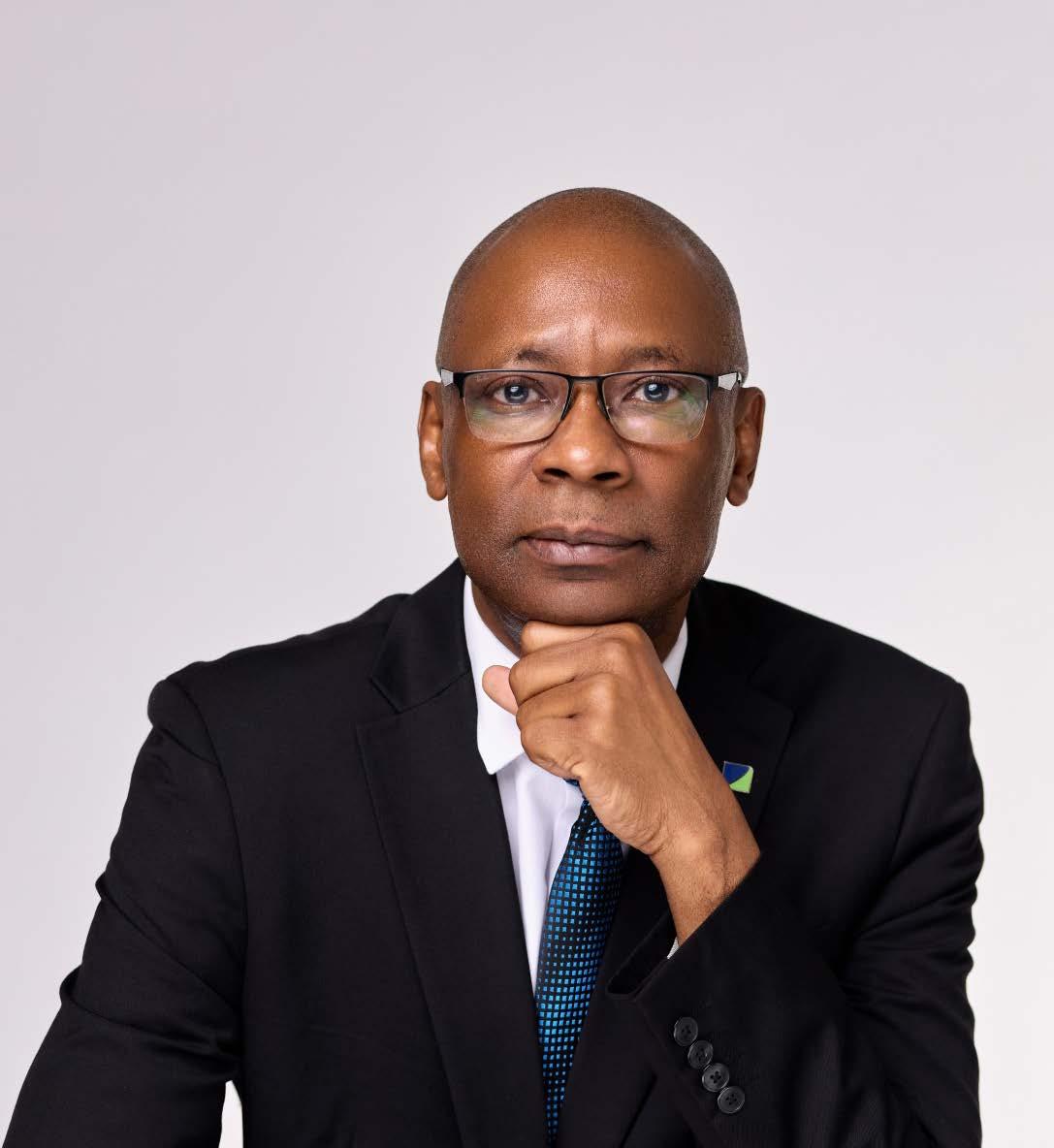
In an insightful conversation with Mr. Mustafa Chike-Obi, we embarked on a journey into the nuanced strategies and lessons learned from his tenure at the Asset Management Corporation of Nigeria (AMCON). From managing bad loans to safeguarding the stability of Nigeria’s banking sector, Mr. Chike-Obi’s leadership offers invaluable insights into navigating complex financial landscapes.
30 | ISSUE 17.4 | African Leadership Magazine
BUSINESS LEADERSHIP
Moreover, Mr. Chike-Obi shares his perspectives on corporate governance, emphasizing the importance of hiring the right CEOs and fostering a culture of execution to enhance accountability and investor confidence. His reflections serve as a guiding light for leaders seeking to drive sustainable business practices amidst evolving economic realities.
Excerpt
What are the key strategies of the initiatives you have implemented, and what lessons did you learn from that experience?
The Asset Management Corporation of Nigeria has a very specific mandate, and the mandate is straightforward. Due to bad loans, some banks have found themselves in a situation with negative shareholder funds, essentially wiping out depositors’ funds. So, the mandate was to acquire those bad loans at a reasonable price, recapitalize those banks’ negative shareholder funds to zero, and then attempt to recover as much as possible from the bad loans. Additionally, the banks were expected to contribute over time to cover any costs incurred by AMCON through the exercise. So, our approach was to acquire bad loans smoothly and effectively, recapitalize the banks efficiently, and then focus on recovering as much as possible from those bad loans—a process that typically spans around 10 years, and has continued for almost 14 years now.
What lessons did you learn from this experience of being the managing director for AMCON?
There are many lessons to be learned. First, there are three types of debtors. There are debtors who meant well but faced economic circumstances that led their businesses into trouble. We had to work with these debtors to figure out how to get their businesses back on track. They were honest: borrowing money from a bank and not being able to pay it back is not necessarily a criminal act; unforeseen events can occur. Some had business plans but were naive, and they made poor decisions, but they were not malicious. We worked with them to help them realize that their business was not sustainable in its current form and to develop a plan for sustainability. Then there were the debtors who were attempting to exploit the system, and we had to deal with all these different types of people. So, the lessons I learned include the importance of listening to people, understanding that each situation is different, approaching situations with an open mind, and making decisions based on a
thorough understanding of the circumstances. I learned not to rush to judgment.
How do you navigate being a board member at the State Investment Promotion Agency and being a board member at Fidelity Bank?
It’s a different role. Fidelity is a profit-making enterprise, and our responsibility is to increase shareholder value. When you work for a state board, the focus is on public policy—how can we make the state better? So, you always have to consider the overall vision of the governor and of the state, even in profit-making institutions. The objectives of Fidelity Bank, such as maximizing shareholder value, profits, and reputation, are clear. However, the vision of the state, which is more focused on public good, is different from that of a private enterprise. Despite these differences, both roles require careful consideration of responsibilities. In Fidelity, the board is ultimately responsible for the bank’s outcomes, while in the state, the governor holds ultimate responsibility. It’s different but manageable—you just have to be aware of where you are and what your responsibilities entail.
The mandate was to acquire those bad loans at a reasonable price, recapitalize those banks’ negative shareholder funds to zero, and then attempt to recover as much as possible from the bad loans.
The Nigerian business landscape is constantly evolving. How do you stay abreast of industry trends and emerging opportunities, and how do you leverage this knowledge to drive growth and value creation in the companies you serve?
Nigeria faces unique challenges. The issues we are dealing with are not insurmountable, but they require careful decision-making and execution. I always say that good policies do not always lead to good results; execution is key. There’s a process to executing a good policy, and that’s where Nigeria has faced challenges. We’ve made good policy choices, but the execution has been lacking, leading to poor results. Execution is more difficult than creating policies, and it requires the right people. However, in Nigeria, we often overlook execution. This is evident at all levels, from the federal government to state governments and even within companies and corporations. We
31 ISSUE 17.4 | African Leadership Magazine |
BUSINESS LEADERSHIP
often hire people who are not competent for their roles. For example, consider the position of the CBN Governor—the interview process for such a critical role is often lacking. If I were the president, I would demand a clear plan from the candidate for achieving specific objectives. Execution is critical, and we need to start taking it seriously.
Corporate governance and transparency are essential for investor confidence and sustainable business success. Can you share your approach to fostering a culture of accountability and integrity within the organizations you’re involved with?
The lessons I learned include the importance of listening to people, understanding that each situation is different, approaching situations with an open mind, and making decisions based on a thorough understanding of the circumstances.
Hiring the right CEO is crucial for fostering a culture of accountability and integrity within organizations. The CEO wields significant day-to-day power, so getting this appointment right is paramount. It’s the board’s responsibility to hire the right CEO at all levels. Whether it’s the president of Nigeria, a minister, or a director-general, hiring competent individuals is essential. Execution is the most important aspect of any organization, and if you can’t execute simple tasks properly, you will encounter problems. It’s crucial to separate roles and responsibilities. For example, when hiring a CEO, the board must ensure they are the best fit for the role. Additionally, leaders must lead by example. If the CEO sets a standard of accountability and integrity, it will permeate throughout the organization. It starts from the top, and leaders must embody the values they want to instill in their organizations.
What part of the poll position are you in to replicate these successes at the continental stage?
I believe in focusing efforts where they are welcomed and can make a real impact. If someone seeks my assistance, I’m happy to help, but I don’t waste effort trying to help those who are not receptive. Take Fidelity Bank, for example—if you want a loan, you need to show me your management and cost structures. It’s
about aligning objectives with investments. Similarly, on a continental scale, you have to find places that genuinely want investment and are prepared to receive it. Zambia, for instance, has positioned itself as an attractive destination for investment. We in Nigeria claim to want investment, but our actions don’t always align with our words. It’s essential to have clear objectives and prepare to achieve them. It’s not just about stating intentions; it’s about being ready to act on them. Many places in Africa are not ready for what they claim to want. Nigeria is a prime example—we say we want foreign investment, but our behavior suggests otherwise. We must change our collective mindset to attract the investment we desire.
As a leader in the Nigerian business community, what initiatives do you champion to promote entrepreneurship, innovation, and economic empowerment, especially among youth and marginalized groups?
It starts with creating an environment that encourages people to stay. Currently, Nigeria’s behavior suggests that it wants people to leave. However, retaining talent is crucial for fostering entrepreneurship, innovation, and economic empowerment. If we want people to stay, we need policies that support them. For example, indexing the minimum wage to inflation would help people feel more secure and incentivize them to stay. It’s about setting clear objectives and policies to achieve them. Leadership is key—if I were the president, I would prioritize GDP growth, security, and the rule of law. I would assemble the best team to achieve these objectives. Good leaders have a clear vision and can balance conflicting interests effectively. Execution is critical, and leaders must be prepared to manage the consequences of their decisions. Political appointments should be based on merit, with candidates rigorously screened for their suitability. Ultimately, it’s about aligning objectives with actions and being prepared to execute effectively.
32 | ISSUE 17.4 | African Leadership Magazine
BUSINESS LEADERSHIP


BUILDING A BETTER AFRICA: CHALLENGES AND OPPORTUNITIES IN THE 21ST CENTURY
By:
During the African Persons of the Year Awards Ceremony, 15th March 2024,
34 | ISSUE 17.4 | African Leadership Magazine
Keynote Address
HE Dr. Jakaya Mrisho Kikwete, Former President of the United Republic of Tanzania
Addis Ababa, Ethiopia
POLITICAL LEADERSHIP
Your Excellencies Distinguished Guests, My fellow Awardees, Ladies and Gentlemen, Good evening,
Let me begin by thanking the African Leadership Magazine for having me here this evening at this auspicious event of the African Persons of the Year Ceremony, which celebrates the achievements and contributions of outstanding African leaders. I thank you Dr Ken Giami, Chairman of the Magazine, for this wonderful idea of establishing the Awards and for the magnificent organisation of this event.
At the outset, I must say, I received the news of this award with mixed feelings of surprise and gratitude.
Surprise because, as a retired President of my dear country, the United Republic of Tanzania, I was just minding my own business – doing most of my activities in low profile –and allowing those in authority to bask in the spotlight. Until I received your official letter Dr. Giami that notified me of my winning, I had no knowledge of the awards' nomination and selection process. It was only after reading your letter that I learned about it and that I had emerged ahead of others in the category of the Peace and Security Leader of the Year. I am grateful because these prestigious awards afford us a moment to take a pause, contemplate and reflect on the collective progress we have made so far in the advancement of our beloved continent, Africa.
The truth is, it is with great honour that I accept this Award. I accept it, not just for myself but on behalf of countless Africans – be they political leaders, economic influencers, religious figures, members of the security forces, dedicated civil servants, and ordinary individuals – who wake up every day and do their part in making the African continent a better place to live.
Ladies and Gentlemen,
As we mark this opportune moment that underscores the role of individual agency in fostering positive change in Africa, we, as Africans are duty bound to acknowledge the urgent issues that continue to impact our continent.
Considering the theme of this event, that is Building Resilient African Economies, I recommend that today’s event extends beyond just recognising achievements by notable Africans but also serve as an opportunity to reflect on responsibilities that come with leadership.
Poverty, food crisis, climate change, diseases and illiteracy, political crisis and conflicts, are among other challenges which, still continue to confront Africa and demand our unwavering attention and concerted efforts and actions.
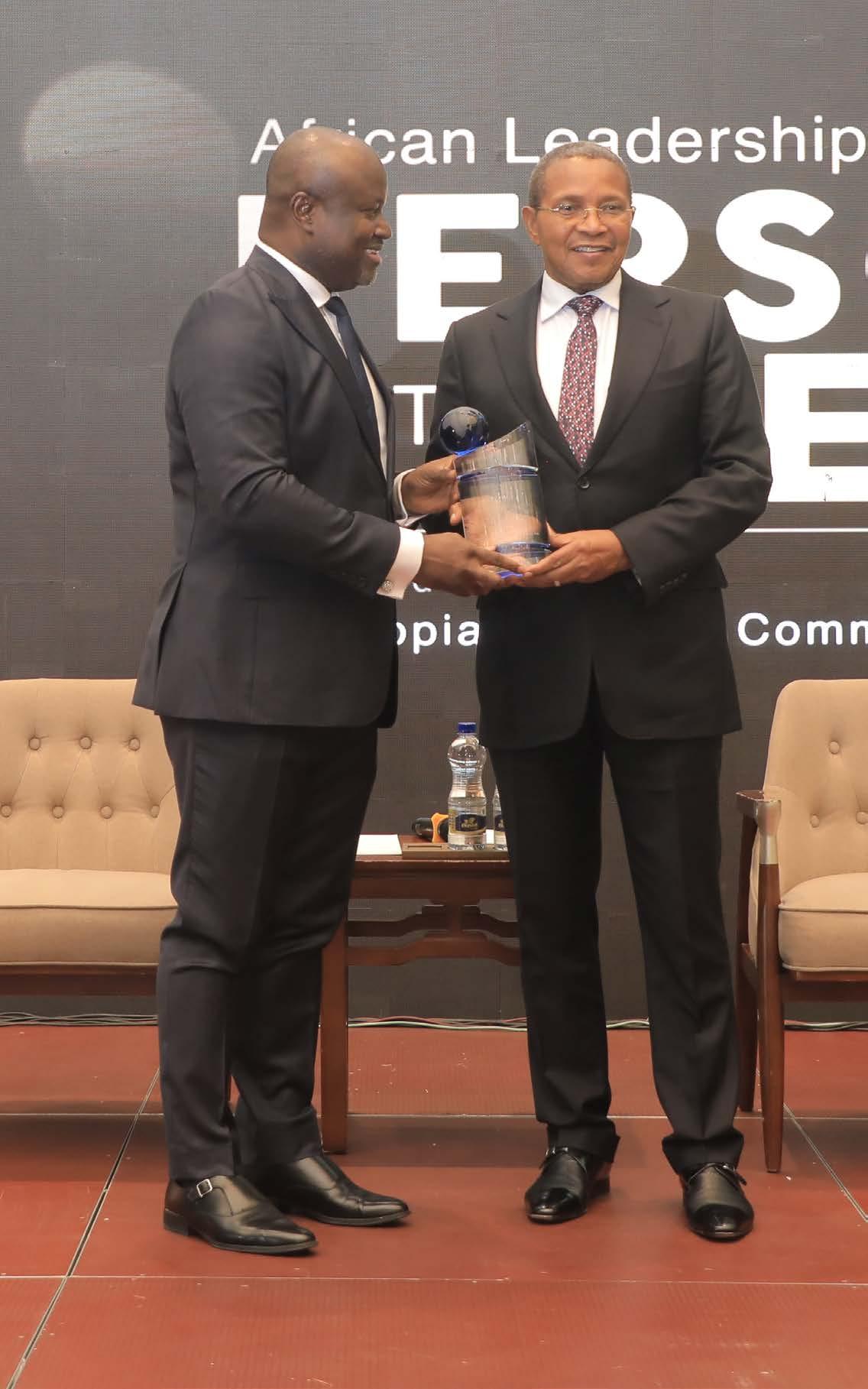
Although my award is in the Peace and Security category, allow me to reflect on the theme of the event and share some insights on various issues that characterize the current state of our continent. This is because it is hard to ignore the complex interplay between these issues and how they relate to peace and security especially when one positions Africa in the global context.
First, the Economic challenge:
Ladies and Gentlemen,
The 2023 African Economic Outlook sheds light on the present status of African economies while emphasizing on their resilience in navigating through various shocks. It shows how African economies have rebounded from the devastating effects of the COVID-19 pandemic. The report further shows how the economies are compelled to navigate the uncertain global landscape marked by the tightening of global financial conditions, spillover effects of the prolonged Russia-Ukraine war, and subdued global economic growth, not to mention persistent climate threats.
35 ISSUE 17.4 | African Leadership Magazine |
POLITICAL LEADERSHIP
This is a testament to the fact that our African continent is not immune to tensions and uncertainties that are prevalent in the international arena. The increased global food and energy prices have triggered inflation in numerous regions of the continent, with some countries facing double- digit inflation. This, in turn, has exerted additional pressure on governments as they expand public budgets to accommodate increased social spending, aiming to shield vulnerable populations from the ensuing impacts.
Ladies and Gentlemen, As a result of these shocks, we are witnessing reduced economic opportunities, increased lack of access to key resources and high levels of unemployment in some regions of our continent. This scenario has compelled many of our people to migrate in pursuit of better prospects abroad. The migration has resulted in the depletion of our essential workforce that is much needed for the continent's development. It is saddening to watch in the Television how many lives are being lost during the migration process, particularly among those who undertake illegal journeys across the Sahara Desert and the Mediterranean Sea.
The increased global food and energy prices have triggered inflation in numerous regions of the continent, with some countries facing double- digit inflation.
In response to this reality, governments in Africa must adapt so that they are able to remain competitive and foster sustainable growth. Our continent, Africa, possesses numerous advantageous factors, including abundant natural resources, a youthful population, and the ingenuity of our people. This is one area where Africa’s potential is limitless. In my view, what is required at this pivotal moment is visionary leadership, innovation, and a revitalized commitment to the principles of unity and solidarity.
Second, the climate change challenge:
Ladies and Gentlemen,
Climate change as a global crisis disproportionately affects Africa. Rising temperatures, changing rainfall pattern and extreme weather events all pose a real threat to agriculture and food security, water resources availability and quality, the emergency and prevalence of diseases, and our biodiversity. In recent years, in countries such as Mozambique, we have witnessed the destructive power of hurricanes and storms to human life, key infrastructure and socio-economic wellbeing
of a nation.Various reports such as the African Economic Outlook 2022 and the 6th Assessment Report of the Intergovernmental Panel on Climate Change (IPCC) have reiterated that the climate crisis is likely to get worse, and that the time for action is now. Africa has no choice but to actively engage in the current global initiatives aimed at mitigating the effects of climate change. In practice, this calls for more investment by nations in climate action and green growth.
I am glad to note that apart from traditional interventions at national and regional levels, there are already talks of involving the private sector in financing Africa’s climate action and green growth ambitions. I have also heard about the potential to harness Africa's vast and untapped natural resources as a supplementary means of financing this endeavour. Such forward-thinking and innovative approaches are welcome and deserve commendation. They should be actively promoted, especially given the substantial resources that are required for climate action and green growth. This figure ranges from 2.6 to 2.8 trillion USD by 2030.
Third, the education challenge: I will speak in length on this.
Ladies and Gentlemen,
I am aware many of us have heard the saying “The future is African”. Well, this is not just a populist statement, it is a statement supported by facts. By the year 2050, 1 in every 4 people in the world will be African. Last year in 2023, the continent recorded the largest population of young people on the planet, 14 percent, and it is estimated that by 2050, 40 percent of all people below the age of 18 years (which is about 1 billion people), will be in Africa. I favour the argument that this expanding youth population on our continent holds the potential to become a crucial and transformative power. But this will be true, only if we make deliberate efforts to equip them with the knowledge and skills necessary to align their capabilities with the opportunities and challenges already apparent.
Ladies and Gentlemen,
The founding leaders of our continent recognized the transformative power of education right at the dawn of independence. Depending on their national conditions, they were quick to prioritize education on their development agendas. There was a move across the continent to encourage universal primary education as one way to help the postindependence Africa lift itself out of abject poverty. In fact, the education agenda was institutionalised during the very first Organization of Africa Unity Summit in 1963, championed by Emperor Haile Selassie of Ethiopia. He called on the continent to launch
36 | ISSUE 17.4 | African Leadership Magazine
POLITICAL LEADERSHIP
a massive effort in education so that “to raise the level of literacy and provide the cadres of skilled and trained technicians requisite to our growth and development. I am glad to note that the AU has carried the baton and adopted the African Union’s Continental Education Strategy for Africa (CESA 2016– 2025). This is the strategy that sets a path for learning that will transform Africa’s youth into agents of change for sustainable development as envisioned in the Agenda 2063, the Africa We Want. We need a successor strategy beyond 2025.
Today, some six decades since independence, Africa has made substantial progress in education. Statistics indicate that completion rates between 2000 and 2022 have risen from 52 to 69 percent in primary, 35 to 50 percent in lower secondary and 23 to 33 percent in upper secondary education. During that period, the number of tertiary education students has risen from fewer than 800,000 in 1970 to well over 17 million. Today, 1 more girls are in school than ever before.
However, these gains are insufficient to prepare Africans for the 21st century. You will agree with me that the 31 percent of primary, 50 percent of secondar and 67 percent of upper secondary school students not completing their education is simply too high. It is not acceptable, and it is a major drawback to Africa’s development endeavours. Also, only one in five children achieve minimum proficiency level in reading at the end of primary education. It means we still have a long way to go in eliminating illiteracy and providing our children the skills they need for today and tomorrow. For instance, in the wake of the COVID-19 pandemic, about 107 million children, adolescents and youth were out of school in our continent. Moreover, data shows that while girls are particularly disadvantaged, sub-Saharan Africa remains the only region in the world not to have achieved gender parity in enrolment at any level in the education system. Sadly, 1 in 3 girls is being married early.
Ladies and gentlemen, I talk passionately about this subject because I am not only passionate about education but also because I am also the Chairman of the Board of Directors for the Global Partnership for Education (GPE). I am also a firm believer that education is the foundation of all economic development activities. Education can lay the foundation for tolerance, inclusivity and a shared sense of identity. Education can also serve as a powerful tool in preventing the rise of extremism and fostering a culture of peace. It is heartwarming indeed, to note that the African Union (AU) has proclaimed 2024 as the Year of Education. This marks a historic milestone that reinstates education at the forefront of the policy agenda. We maintain
optimism that the AU, in collaboration with key development partners, will successfully achieve enhanced outcomes throughout the entire education spectrum. These include improved education financing, evidence-based policies, and inclusive systems that prioritise quality foundational learning. Moreover, it is expected that there will be increased investment in education financing and collaboration with teachers, placing them at the core of these efforts. I feel proud that GPE played part in the Year of Education at AU Summit.
Fourth, the health challenge:
Ladies and Gentlemen
Our continent has made positive strides in the health sector lately. The recent World Health Organization's (WHO) reports on the State of Health in the African Region reveals significant improvements in health and life expectancy. Positive trends in deaths reductions due to communicable diseases has also been observed. Sadly, emerging challenges posed by noncommunicable diseases (NCDs) are on the rise. Today, young people are dying of diabetes, cardiac arrests, and other lifestyle related diseases.
The report has also established that our health systems are displaying suboptimal performance, operating at 49% of their potential capacity, with specific shortcomings in ensuring access to services and resilience to outbreaks. These outbreaks, such as the Ebola Virus and the COVID – 19 underscore our continent’s interconnectedness to the world and our vulnerability in the area of health security.
Ladies and Gentlemen,
Africa has no choice but to actively engage in the current global initiatives aimed at mitigating the effects of climate change. In practice, this calls for more investment by nations in climate action and green growth.
To overcome these challenges, it is imperative that we adopt a holistic approach to health. Nations must consider evolving health trends and the specific needs of special groups such as adolescents and the elderly. We ought to strengthen our health infrastructure, invest more in research and improve coordination mechanisms with international health organisations for disease prevention and response. These interventions are important for addressing immediate health threats and building resilient healthcare systems for the future.
I am happy with the AU’s decision to establish
37 ISSUE 17.4 | African Leadership Magazine |
POLITICAL LEADERSHIP
of the African Centre for Disease Control and Prevention (Africa CDC). So far, the institution has been playing a crucial role in coordinating continental efforts to combat diseases, including pandemics. I appeal to the African Union to ensure its strengthening so as to be able to deliver on the objectives of its establishment.
Fifth, the democratic challenge: Ladies and Gentlemen,
On democracy, I think it is important to begin by recognising the positive strides that many African nations have made in embracing democratic principles. Over the past few decades, we have witnessed an increasing number of countries holding regular and competitive elections which have allowed their citizens to voice their opinions and choose their leaders. This commitment to the democratic process is a testament to the aspirations by African nations to build societies founded on justice, equality, and participatory governments.
Our continent does not exist as an island of isolation separate from the rest of the world. On the contrary, Africa is one of the six continents, and we live in a globalised world where no one part of the world can be separated from the other.
Given the fact that Africa comprises 54 countries, each with a distinct political history, making a broad generalization about the state of democracy on the continent is an unjust undertaking. Each country embarked on its democratic journey independently, progressing at its own pace and influenced by local conditions. One thing is evident that all nations in Africa have adopted multiparty democracy. In most countries it is work in progress to build and consolidate the system. But there is notable increase in political parties and their ability to engage the electorate to seek support. The parties provide platforms for the masses to exercise their civil rights during elections. Certainly, there is increased participation of people in the parties of the nation. The other good thing
we are seeing is increased political engagement of the young people. This is heathy and something to be proud of because the youths are the leaders of tomorrow and some are already leaders today. They need mentorship and grooming and engaging them and getting them involved, is the best way to do it. It guarantees nations a promising future. One thing that is a bit worrisome in African politics is the desire by some leaders to change the term limits permitted by the constitutions of their countries.
In a number of countries in Africa, management of elections has been facing a lot of challenges. The tensions created during the campaigns and voting if not addressed properly and timely, matters have escalated in violence. Invariably many conflicts and political crises can be traced from problems of management of elections. Concerns are about lack of transparency, electoral fraud, vote manipulation, ballot stuffing and other irregularities in the electoral process. For a functioning democracy, peace, security, and stability, these are issues that deserve a serious attention in our young democracies.
Rule of law: There is definitely work to be done in the area of rule of law. Apparently, not so many governments can willingly allow room for formal and informal institutions and practices to limit the state power. It is, nevertheless, promising to witness some countries making remarkable advancements in this area, especially in judicial independence. We have vivid examples of people and groups that have successfully challenged the government in the court of law. This is not something you would hear every day in Africa in the recent past.
Human and people’s rights: There is significant improvements in the area of human and people’s rights but more remain to be desired. Many African countries still struggle in terms of deteriorating civil liberties such as freedoms of expression, association, assembly, religion and movement. Definitely, we still lag behind in gender equality in politics despite an encouraging trend of having female leaders in top executive positions and in the parliament. The World Economic Forum Gender Gap Report of 2023 indicates that at the current rate of democracy, it would take a century to close the gender gap in Sub – Sahara Africa. The undemocratic change of government: Military coups is a matter of deep concern for all of us. The recurrence of coups is a relapse in our democratic journey as the continent. These unfortunate events are a threat not only to individual nations but also to the ideals of democracy and good governance that we collective strive to uphold as a continent. I am privy to the fact that just as a democracy, each coup has its unique circumstances which we, as external observers, we must also take trouble to understand. But whatever the reasons and circumstances, it is antidemocratic governance of nations. It should not be condoned nor encouraged. We should uphold and promote democratic values.
Ladies and Gentlemen,
At this juncture, I applaud the endeavours by the African Union, regional entities, and the wider international community for their collaborative actions in condemning coups and coup attempts. I applaud their efforts in
38 | ISSUE 17.4 | African Leadership Magazine
POLITICAL LEADERSHIP
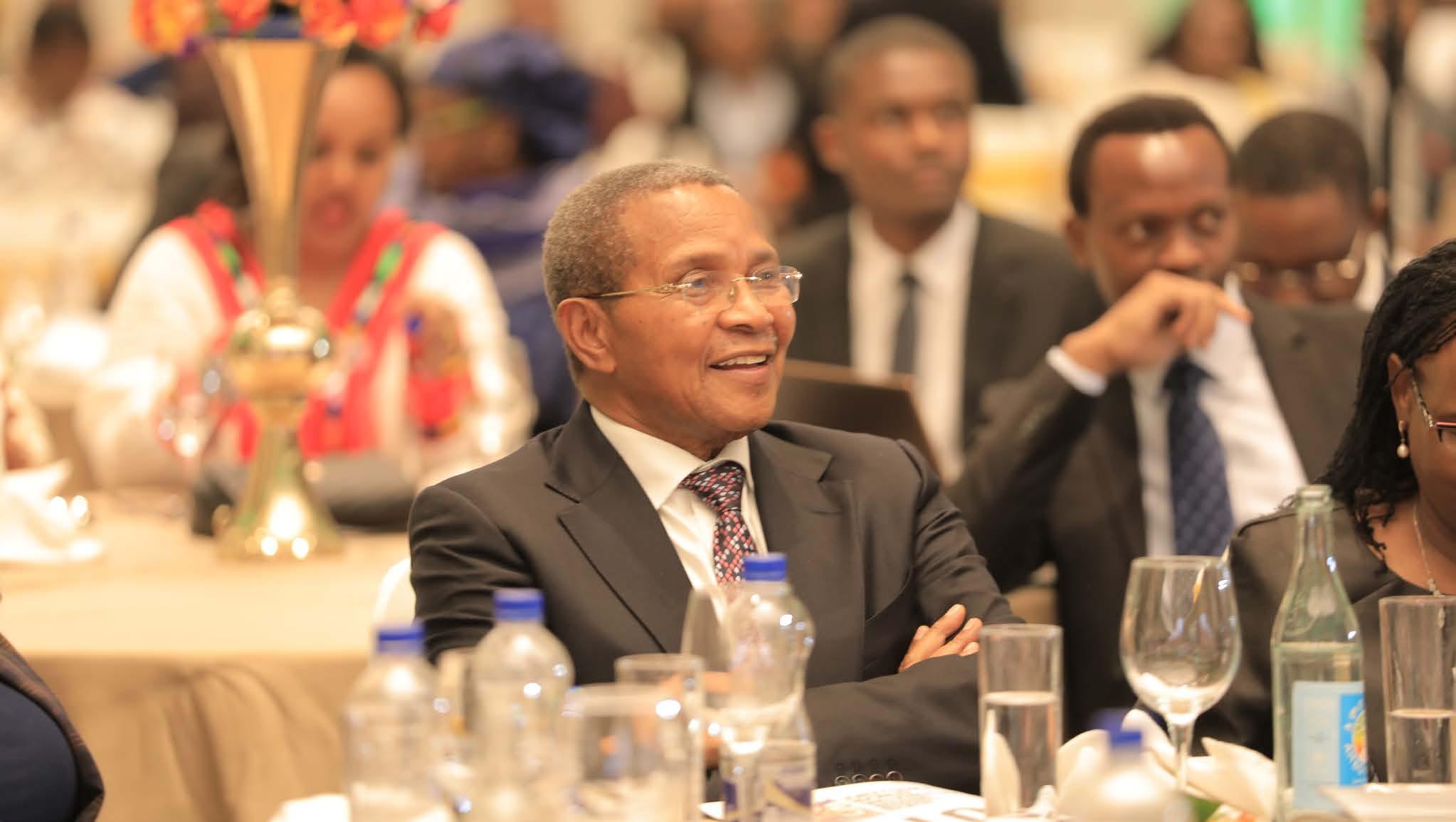
providing diplomatic solutions and support for the restoration of democratic governance in countries affected by this menace.
I am delighted to note the unwavering commitment by the African Union (AU) to democratic governance and the advancement of human rights. We have all witnessed how the organization has played a pivotal role in facilitating transparent and fair elections in member states. This has contributed to the promotion of accountable and transparent governance throughout the continent. By instituting the African Charter on Human and Peoples' Rights, the AU has demonstrated its dedication to championing the rights and dignity of every African citizen.
The question of regional integration:
Ladies and Gentlemen, I am a firm believer of the regional integration project. Regional integration makes sense for our continent not only due to its composition of small economies, and small markets but also because of being interconnected by geography, shared challenges and aspirations, and a common history.
The importance of the eight regional economic groupings (AMU, CEN– SAD, COMESA, EAC, ECCAS, ECOWAS, IGAD, and SADC) cannot be overstated in this endeavour. RECs are catalysts for progress and vehicles for fostering our continental unity. They serve as platforms for innovative policies and projects that can be scaled up for the benefit of the entire continent. The RECs afford us the opportunity to pilot initiatives at the regional
level; derive lessons from them and identify best practices; and enhance our capacity to address shared challenges collectively.
Ladies and Gentlemen,
The shared projects such as transportation networks and energy grids that are implemented through regional integration can help us bridge connectivity gaps and unlock new opportunities for economic growth and social development. The ambitious Programme for Infrastructure Development in Africa (PIDA) is a shining example of the collaborative spirit driving us towards the continent with seamless connectivity.
On top of that, the flagship African Continental Free Trade Area (AfCFTA) is a testament of our shared vision. It builds upon the foundation laid by regional economic blocs, promoting a single market that spans the entire continent. By creating the vast and integrated market of 1.2 billion people, AfCFTA will allow African nations to trade in goods and services freely across borders. This is unprecedented. AfCFTA will address challenges of poor intra – African trade and low industrial production in Africa that have persisted for decades. Moreover, with AfCFTA, countries will be able to diversify their economies and reduce overreliance on just few commodities for their economic sustenance. In the pursuit of economic emancipation, AfCFTA also serves as a route to rectifying economic inequalities in our continent. This can happen as AfCFTA ensures a level playing field for all member states, where both large and smaller economies can participate actively in the continental market and thrive.
39 ISSUE 17.4 | African Leadership Magazine |
POLITICAL LEADERSHIP
Ladies and Gentlemen,
We also anticipate that the AfCFTA will address the popular paradox where its is said that Africans "produce what they don't consume and consume what they don't produce."
The AfCFTA is the vehicle to take us to greater economic growth and development. However, to unlock these advantages and fully realize the potential of the AfCFTA, member countries must collectively commit to concerted efforts. Countries must pledge to open their borders by simplifying complex customs procedures; harmonise product standards and licensing requirements; and eliminate bureaucratic red tape. It is also important to address infrastructural challenges and build institutional capacity so that to facilitate smooth trade.
It is with great honour that I accept this Award. I accept it, not just for myself but on behalf of countless Africans – be they political leaders, economic influencers, religious figures, members of the security forces, dedicated civil servants, and ordinary individuals – who wake up every day and do their part in making the African continent a better place to live.
I propose that the private sector remains a crucial actor in implementing these interventions.
Sixth and lastly, Africa’s relation with the outside world:
Ladies and Gentlemen,
Our continent does not exist as an island of isolation separate from the rest of the world. On the contrary, Africa is one of the six continents, and we live in a globalised world where no one part of the world can be separated from the other. We live in in a world of global trade, the global movement of people, and global communication. We live with the global benefits that science and technology bring, and, at the same time, we live with the global burdens that pandemics and climate change bring. Global powers, including the United States of America, China, United Kingdom, France, Russia, and the European Union have substantial investments and strategic interests in our region. This can create both opportunities and pressures.
Ladies and Gentlemen,
In light of the above realities, there have been talks about Africa finding its own solutions to its own problems. I am not indifferent to such a perspective. There is profound wisdom in acknowledging that challenges faced by African nations are nuanced, context – specific, and
often deeply rooted in our historical legacies. Solutions imposed from external sources, while well – intentioned, may not fully grasp the intricate dynamics of our African societies. One can, therefore, rightly say that solutions to most of our challenges, just as those I have mentioned above, must emerge from withing our own communities and societies.
On the other hand, it is my belief that finding own solutions is not a call for isolationism or exclusion. On the contrary, it entails working from a position of independency to inviting others to collaborate, share experiences and learn from one another. In this 21st century, international partnerships are not only key, but also inevitable. The global community can offer insights, resources, and support but the solutions themselves must be born from our understanding of our unique context.
Ladies and Gentlemen,
Before I conclude my remarks, let me thank again the African Leadership Magazine for organising these Awards. It speaks volume to your commitment to play your part in building the future of our continent that reflects its true greatness. Through your media agency, you have a crucial role to play in spreading positive narratives about Africa. I urge you to continue focus on the narratives that celebrate African achievements, innovations, and success stories from across our beloved continent. Please continue to do the good work of highlighting the positive aspects. That way you will help create a sense of pride and unity among Africans, here in our continent and beyond.
I would like to extend many thanks to the main sponsor, the Ethiopia Custom Commission, for your efforts in facilitating trade, development, and cooperation across the continent.
To my fellow awardees and runners-up of various award categories, I congratulate you. I make a special mention of His Excellency Dr. William Samoei Ruto, President of the Republic of Kenya for winning the category of the African of the Year 2023. I pray that all your stories continue to inspire generations to come and may your contributions continue to shape the narrative of a prosperous, united and thriving Africa.
To my fellow Africans, I call upon you to be the agents of change. Wherever you are, each one of us has role to play. May we rise to the challenge. It is through our collective efforts that we will truly realise the Africa we envision. A continent of progress, prosperity and peace.
I thank you for your kind attention.
40 | ISSUE 17.4 | African Leadership Magazine
POLITICAL LEADERSHIP

INSPIRING MOMENTS AT THE ALM PERSONS OF THE YEAR AWARDS Addis Ababa 2024
An evening of glamour, excitement, and high-level networking unfolded as Africa’s foremost policymakers, business leaders, and diplomatic figures convened at the 12th African Leadership Magazine Persons of the Year Awards Ceremony on March 15, 2024, at the Ethiopian Skylight Hotel in Addis Ababa, Ethiopia.
The year’s ceremony symbolized ‘a celebration of hope,’ as noted by Dr. Ken Giami, Chairman of the African Leadership Organization and publisher of African Leadership magazine, in his opening remarks. “Our anchor is hope. I hope that we do not have a scarcity of transformational leaders. It is that hope that we celebrate today—that we have leaders like
the ones we are celebrating—who continue to serve our people in ways that inspire, for they are not mere business or political figures, but architects of our progress, stewards of hope, and catalysts for societal change,” he noted. He also set the tone for the event by emphasizing that the ceremony’s focus was on “building a resilient Africa in a period of global tensions and economic disruptions.”
Welcoming the attendees, the Ethiopian Minister for Revenues, H.E. Aynalem Nigussie, underscored the significance of honoring accomplished individuals as a source of inspiration for the younger generation. “As we honor the most successful persons of the year, we are not only celebrating their individual
42 | ISSUE 17.4 | African Leadership Magazine
EVENTS
achievement but also recognizing them as beacons of inspiration,” she stated.
The keynote address by His Excellency, Dr. Jakaya Mrisho Kikwete, former President of Tanzania, reflected on Africa’s progress while acknowledging ongoing challenges such as poverty, climate change, disease, and political instability.
“Considering the theme of this event, which is Building Resilient African Economies, I recommend that today’s event extends beyond just recognizing achievements by notable Africans but also serves as an opportunity to reflect on the responsibilities that come with leadership. Poverty, food crises, climate change, diseases, illiteracy, political crises, and conflicts are among the challenges that still continue to confront Africa and demand our unwavering attention and concerted efforts and actions,” he remarked.
Former President Kikwete shared insights into the economic challenges facing Africa, including inflation, unemployment, and migration, underscoring the need for visionary leadership and innovation. He stressed the pivotal role of education in harnessing Africa’s youthful population as a transformative force, while also addressing the need for improvements in the health sector to tackle emerging challenges such as non-communicable diseases.
In response to Africa’s economic realities, former President Kikwete emphasized, “Governments in Africa must adapt so that they are able to remain competitive and foster sustainable growth. Our continent, Africa, possesses numerous advantageous factors,
including abundant natural resources, a youthful population, and the ingenuity of our people. This is one area where Africa’s potential is limitless. In my view, what is required at this pivotal moment is visionary leadership, innovation, and a revitalized commitment to the principles of unity and solidarity.”
“I talk passionately about this subject because I am not only passionate about education but also because I am also the Chairman of the Board of Directors for the Global Partnership for Education (GPE). I am also a firm believer that education is the foundation of all economic development activities. Education can lay the foundation for tolerance, inclusivity, and a shared sense of identity,” he emphasized.
“Education can also serve as a powerful tool in preventing the rise of extremism and fostering a culture of peace. It is indeed heartwarming to note that the African Union (AU) has proclaimed 2024 as the Year of Education. This marks a historic milestone that reinstates education at the forefront of the policy agenda. We maintain optimism that the AU, in collaboration with key development partners, will successfully achieve enhanced outcomes throughout the entire education spectrum.”
Regarding healthcare, former President Kikwete advocated for a holistic approach, stressing the importance of addressing evolving health trends and the specific needs of special groups such as adolescents and the elderly. He called for strengthening health infrastructure, increased investment in research, and improved coordination mechanisms with international health organizations for disease prevention and response.
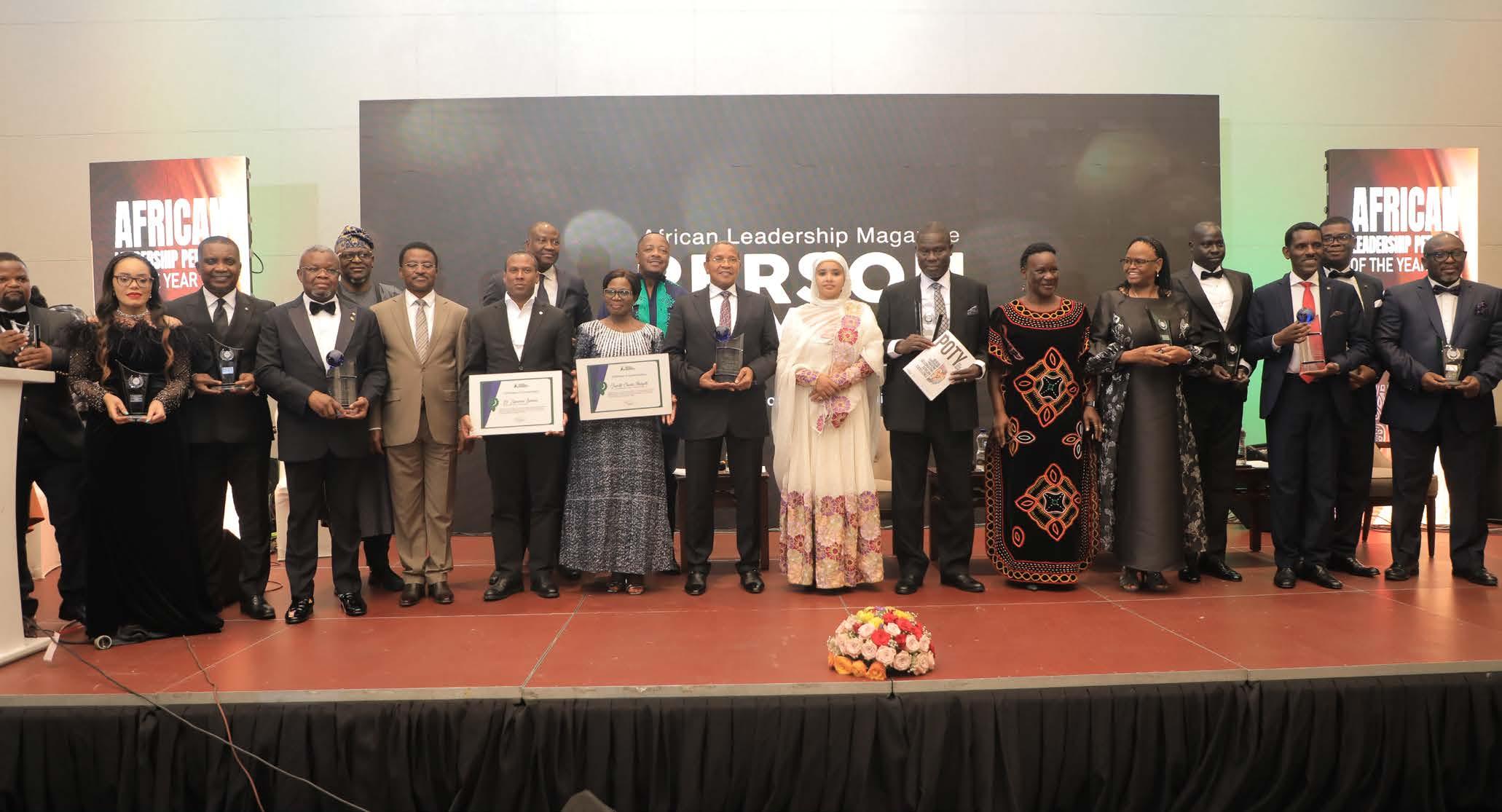
43 ISSUE 17.4 | African Leadership Magazine |
EVENTS
“I am happy with the AU’s decision to establish the African Centre for Disease Control and Prevention (Africa CDC). So far, the institution has been playing a crucial role in coordinating continental efforts to combat diseases, including pandemics. I appeal to the African Union to ensure its strengthening to be able to deliver on the objectives of its establishment,” he added.
Additionally, former President Kikwete applauded the AU’s commitment to democratic governance and human rights. He highlighted the organization’s role in facilitating transparent and fair elections in member states, contributing to accountable and transparent governance throughout the continent.
Advocating for regional integration, President Kikwete cited examples like the AfCFTA and
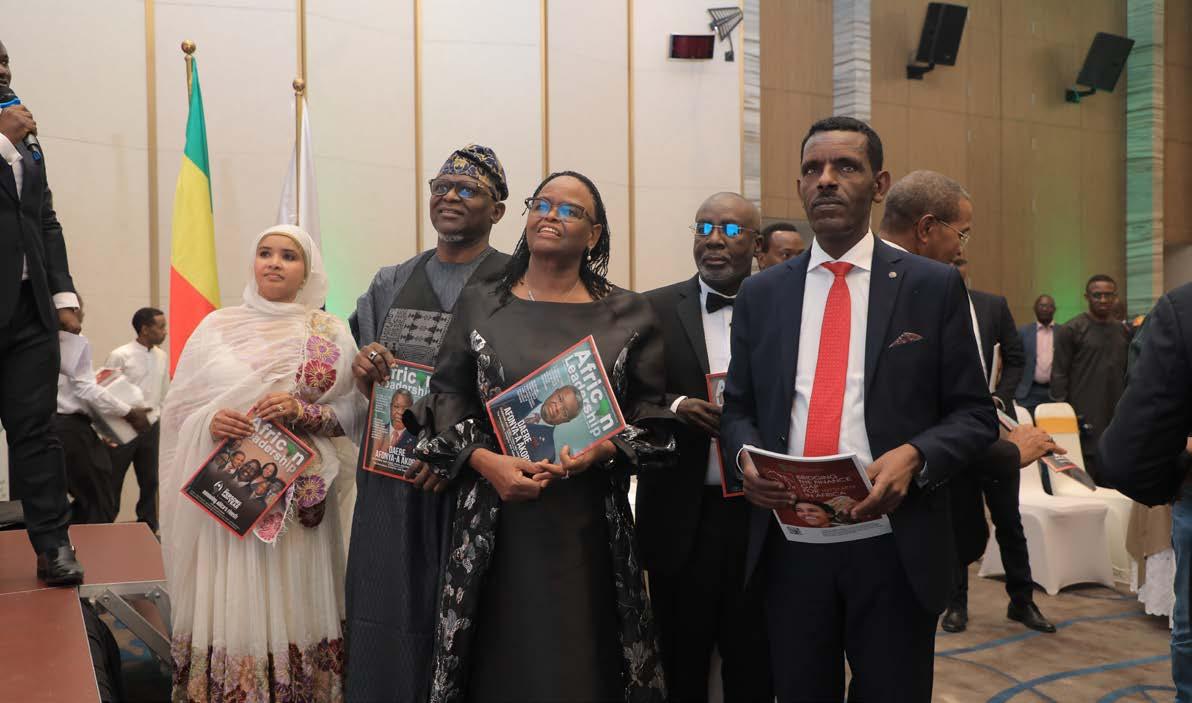
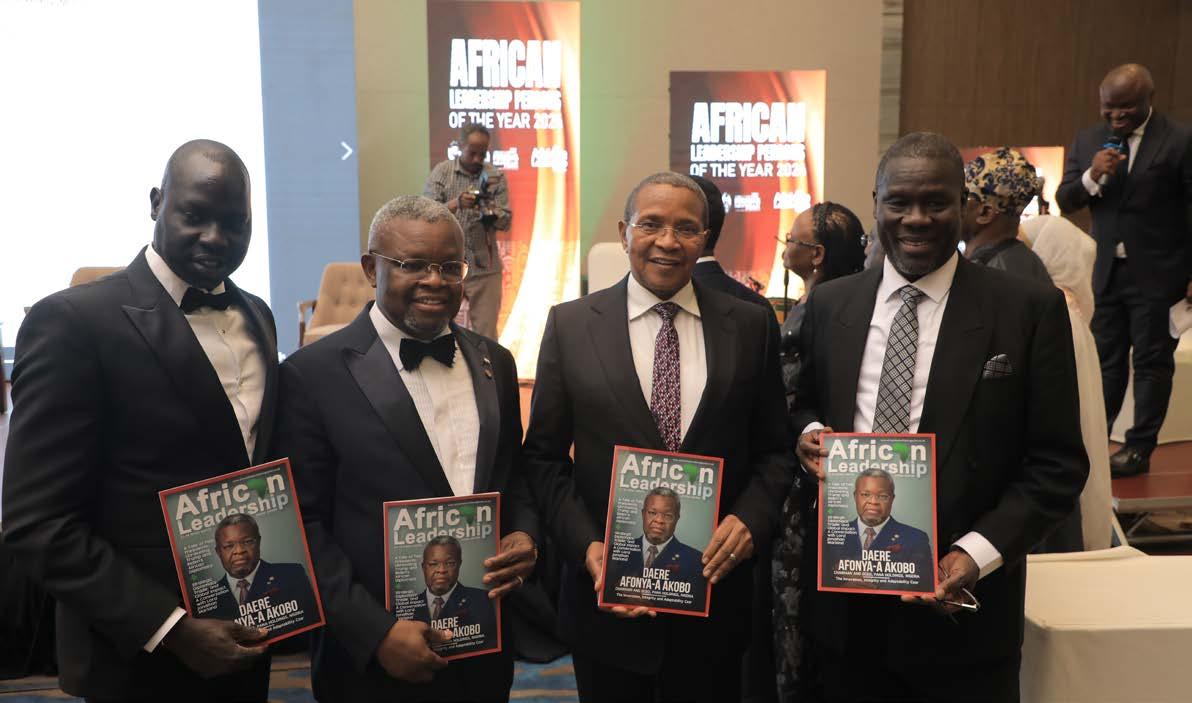
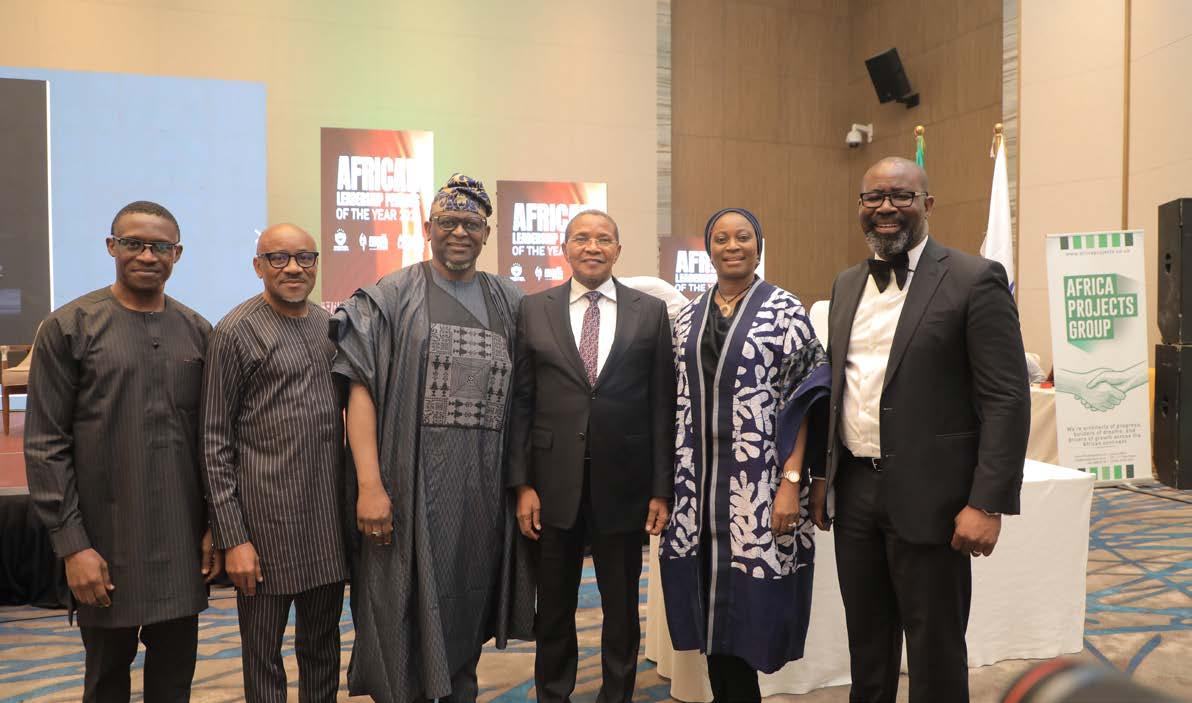
PIDA, while emphasizing the importance of finding African solutions to African problems while welcoming international collaboration. “In the 21st century, international partnerships are not only key but also inevitable. The global community can offer insights, resources, and support, but the solutions themselves must be born from our understanding of our unique context,” he concluded.
The event also featured distinguished speakers, including Rt. Hon. Cllr. Jonathan Fonati Koffa, Speaker of the House of Representatives, Liberia; Hon. Justice Martha Koome, Chief Justice and President of the Supreme Court of Kenya; Dr. Adesola Adeduntan, CEO of FirstBank Group; and Michael Adefarasin, author and leadership coach.
Furthermore, a high-level panel session on “Building Resilient African Economies” included distinguished panelists such as Akol Ayii, CEO of Trinity Energy Group, South Sudan; Mike Kamungeremu, President of the Zimbabwe National Chamber of Commerce; Callistus Obetta, Group Executive of Technology, Digital Innovation, and Services at First Bank of Nigeria; and Daere Akobo, Chairman/GCEO of PANA Holdings, Nigeria.
The highlight of the event was the awards presentation ceremony, during which former President Kikwete was honored with the African Peace and Security Leader of the Year Award. H.E. Adanech Abiebie, Mayor of Addis Ababa City, Ethiopia, and Hon. Justice Martha Koome, Chief Justice of Kenya, were recognized as joint winners of the African Female Leader of the Year Award. Other distinguished honorees included Dr. Adesola Adeduntan, CEO of FirstBank Group, Nigeria; Jeanette Chanda Makgolo, Commissioner General of the Botswana Unified Revenue Service.
Other African leaders also honored at the event included Dr. Jesca Nkwabi, CEO of KOM Group, Tanzania; Kennedy G. Bungane, CEO of African Bank, South Africa; Henry Saamoi Bio, CEO of International Bank Liberia; Daniel Asiedu, CEO of Omisic Bank Ghana; Daere Akobo, Founder and Chairman of Pana Holdings, Nigeria; Mike Kamungeremu, President of the Zimbabwe National Chamber of Commerce (ZNCC); Ing. Dr. Clifford Braimah, CEO of Ghana Water Corporation Limited, Ghana; Akol E. Ayii, CEO of Trinity Energy Group, South Sudan; Dr. Biniam Belete, Founder of the Mekedonia Charity Association; Dr. Zafivanona Lainkana, Director General of the Malagasy Customs Commission; Prof. George Openjuru, Vice Chancellor of Gulu University, Uganda.
44 | ISSUE 17.4 | African Leadership Magazine
EVENTS

African Leaders honoured at 12th ALM African Persons of the Year Awards
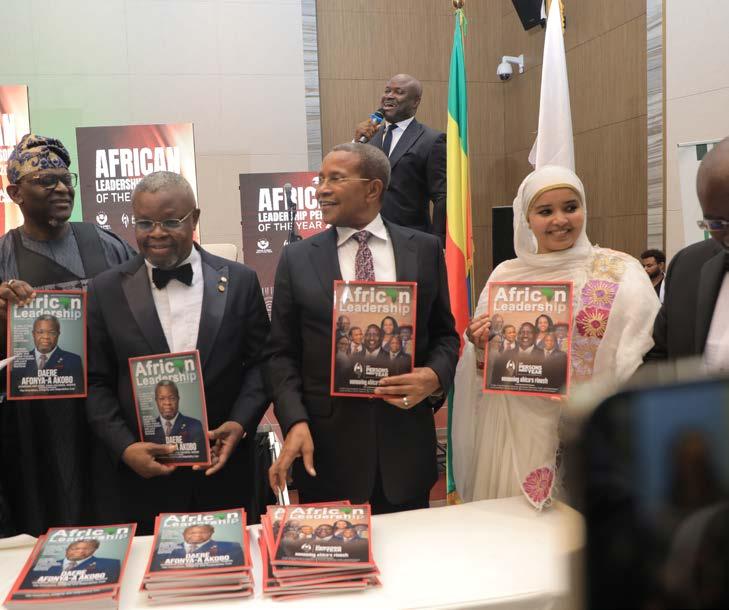


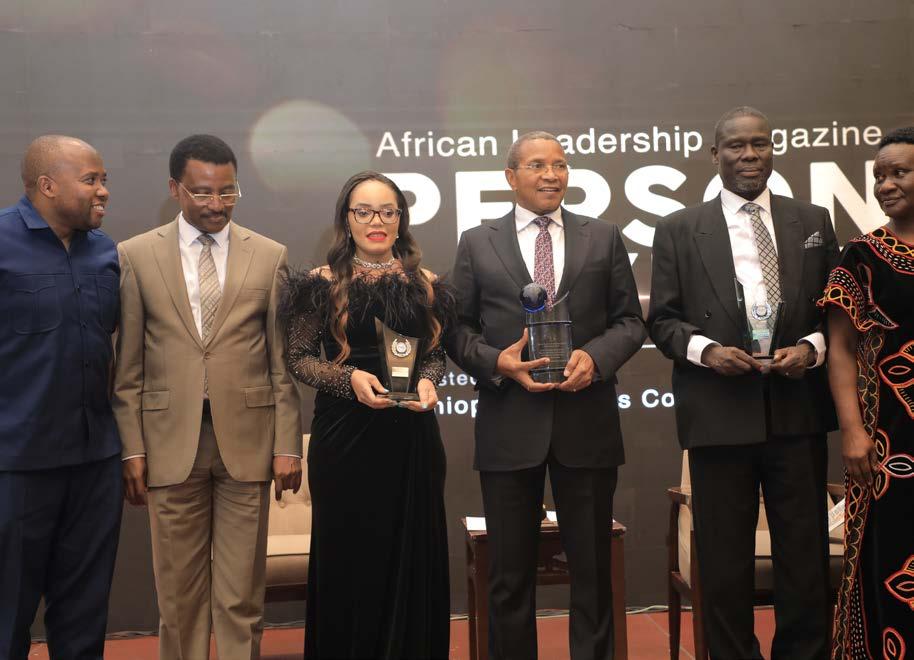

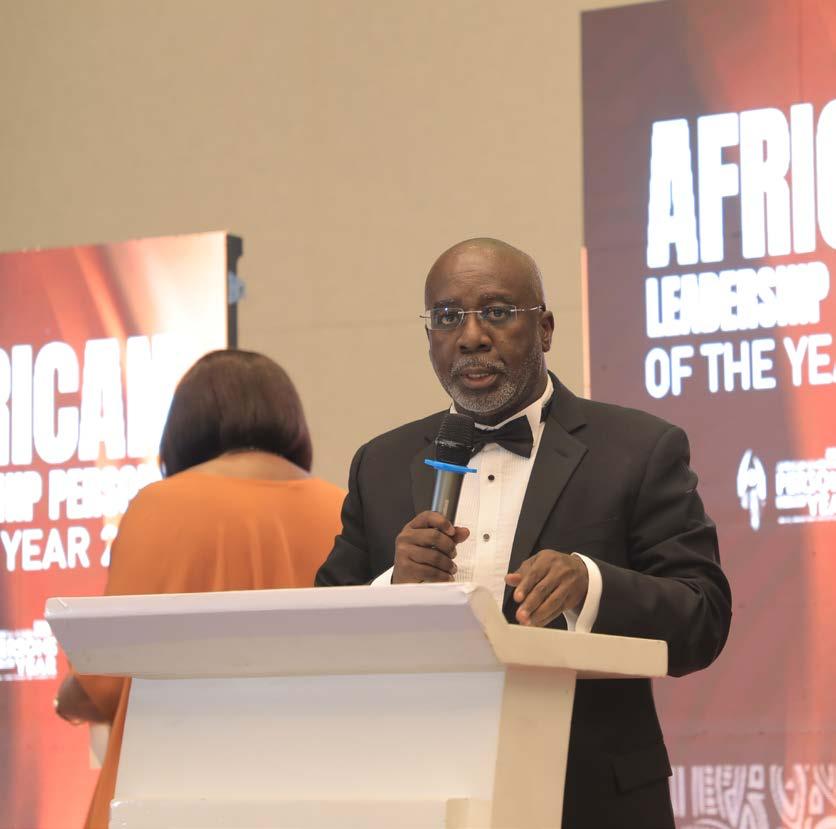
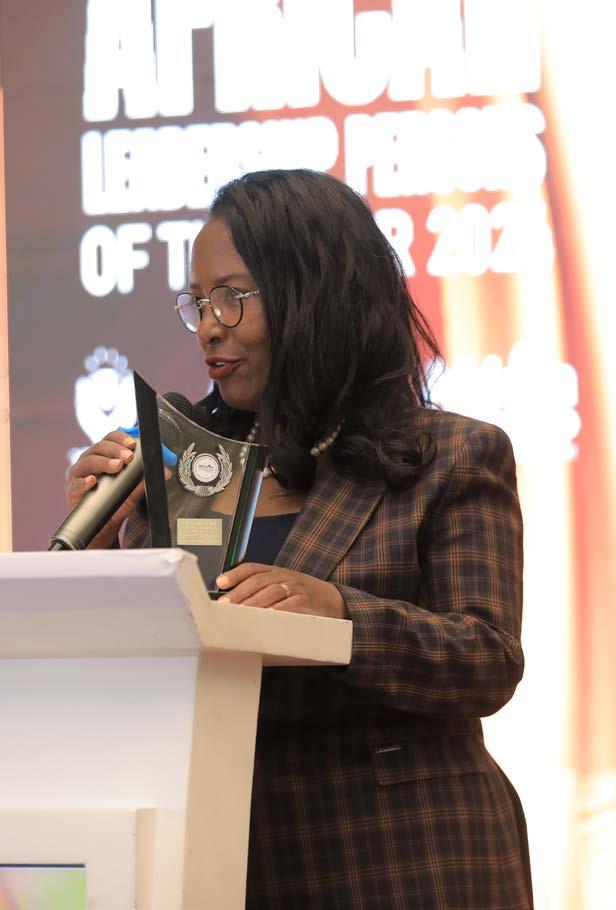
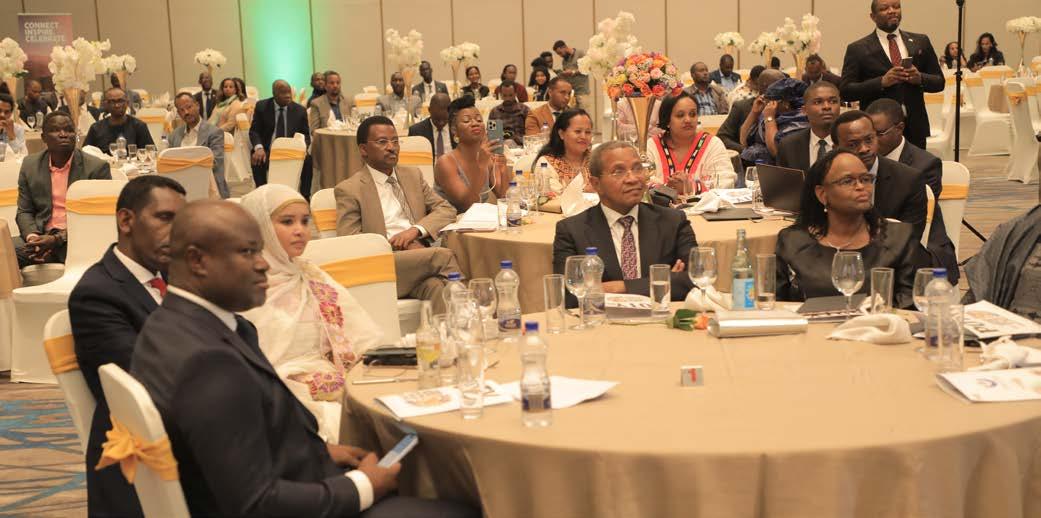

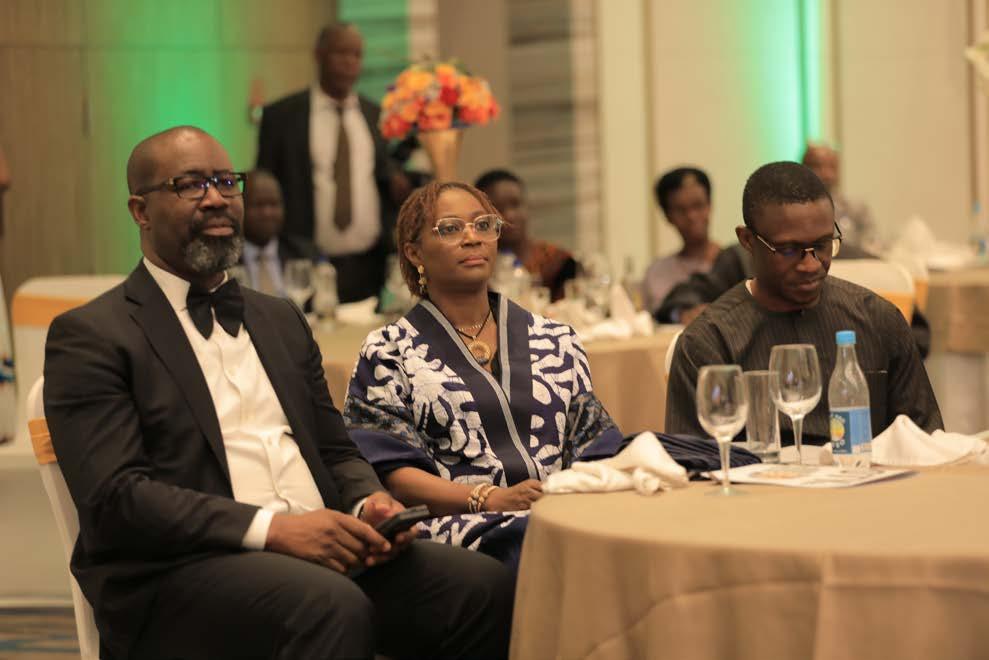

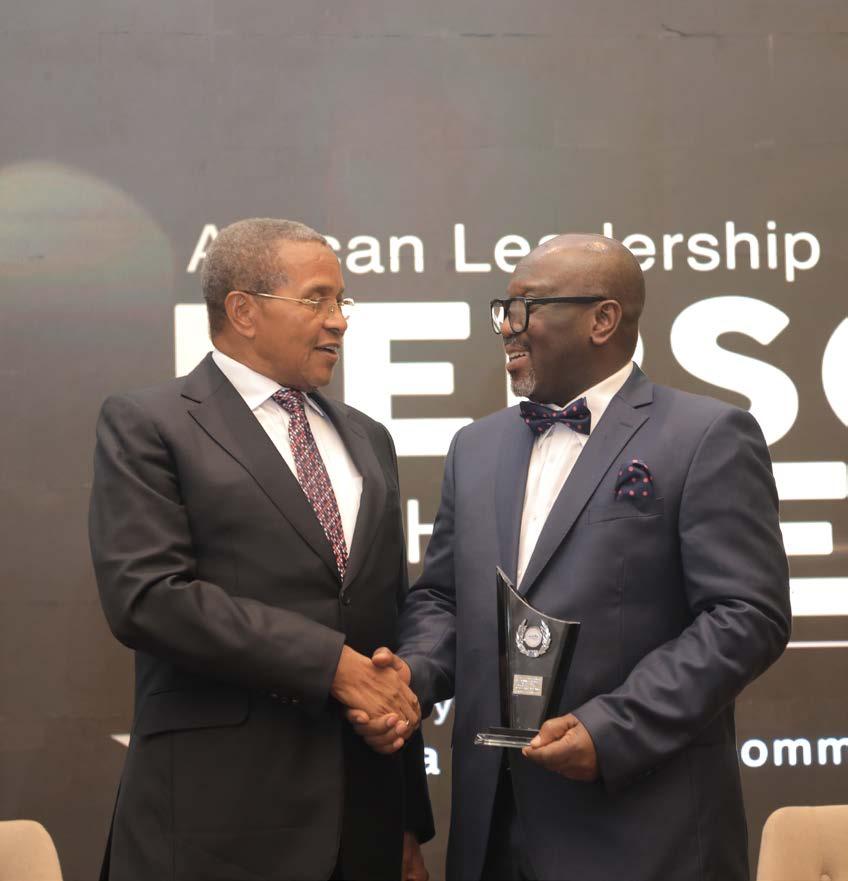
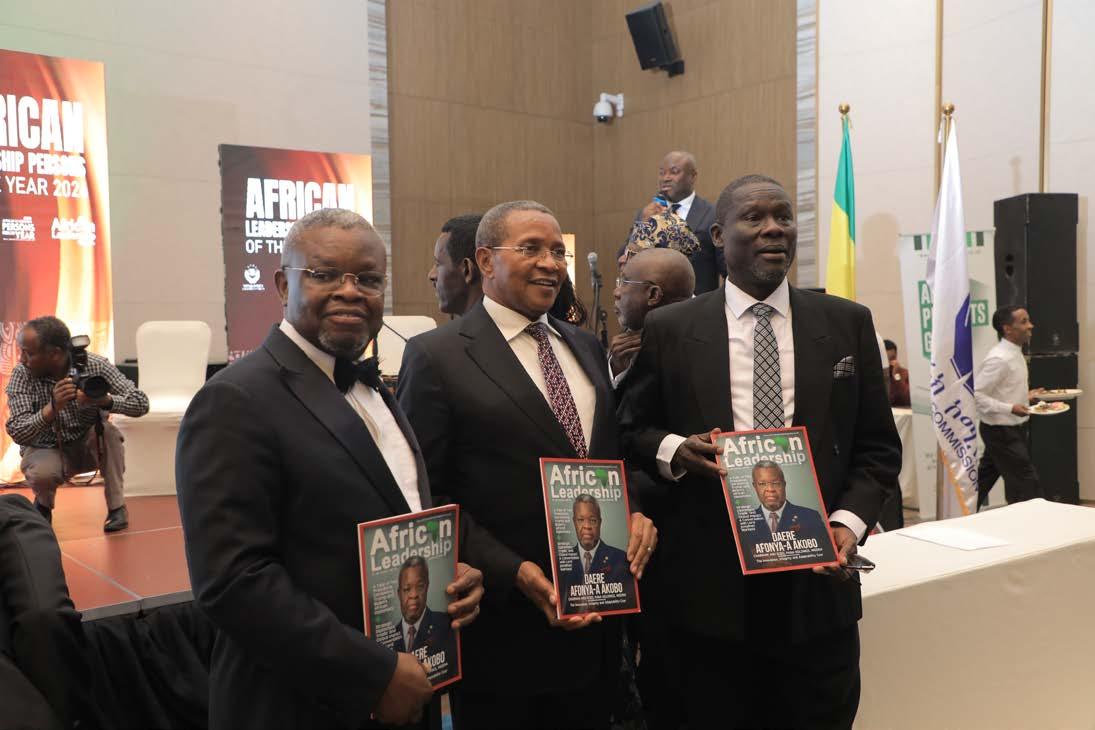
EVENTS 46 | African Leadership Magazine


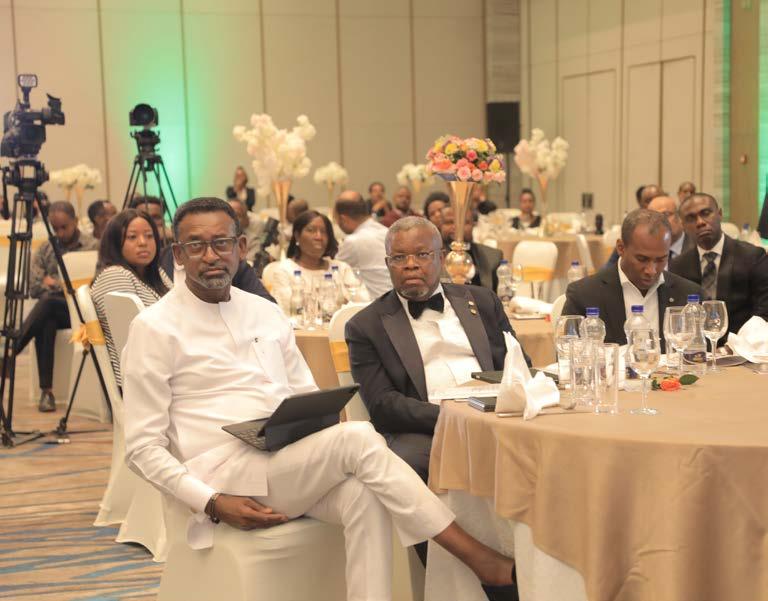

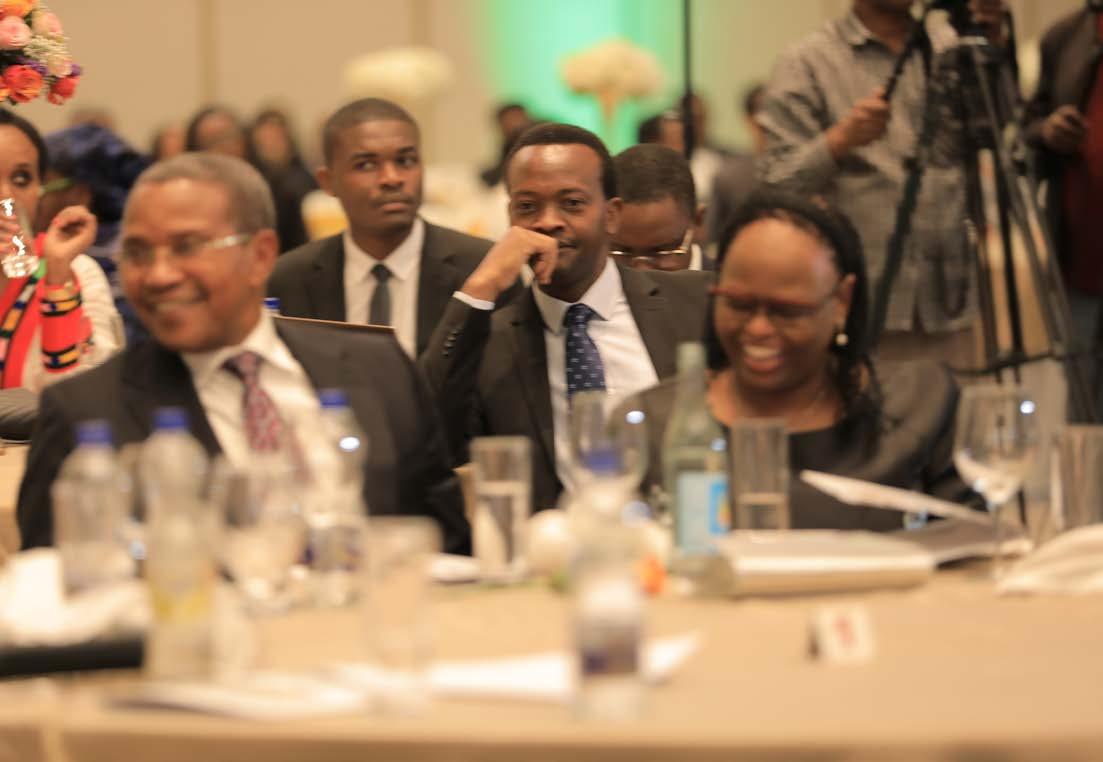
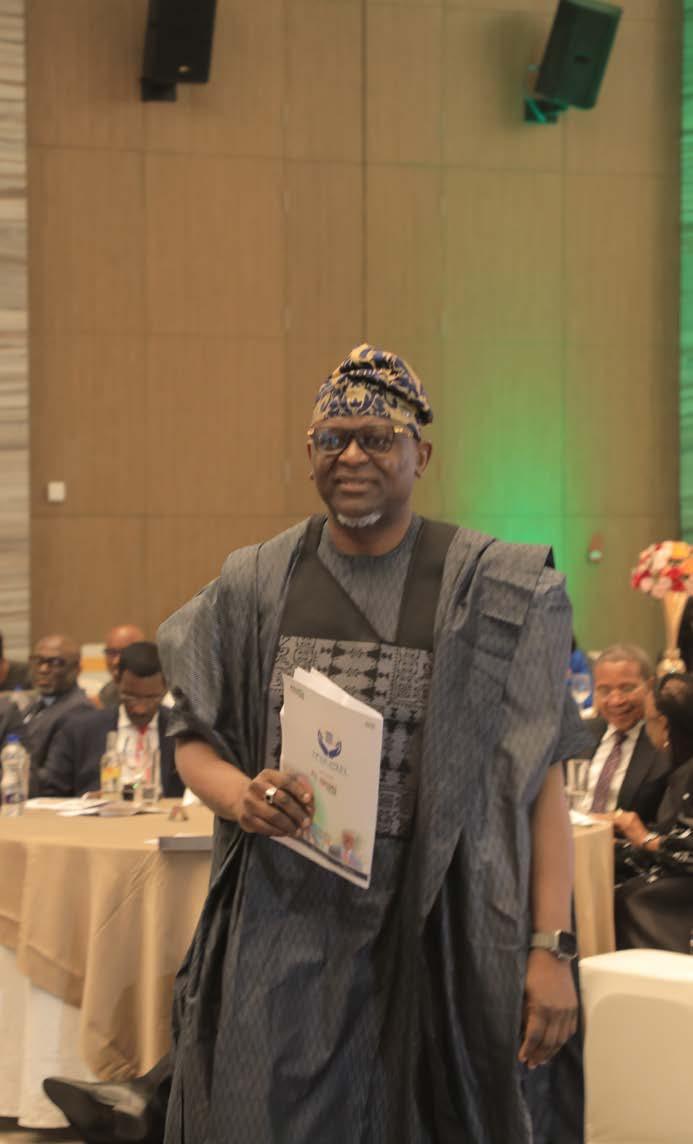
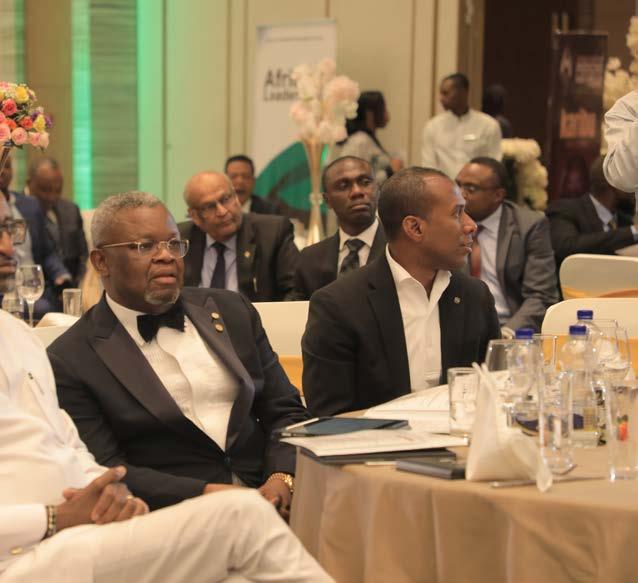


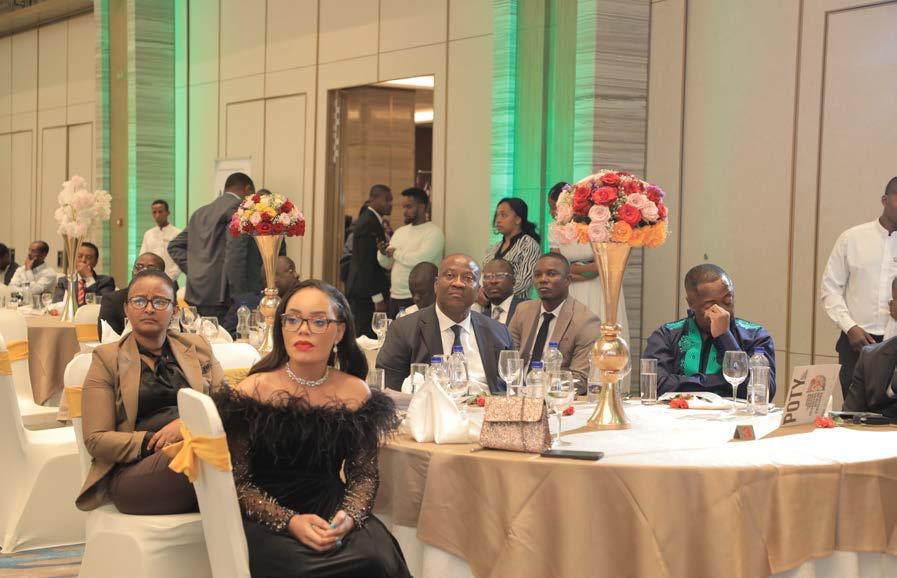
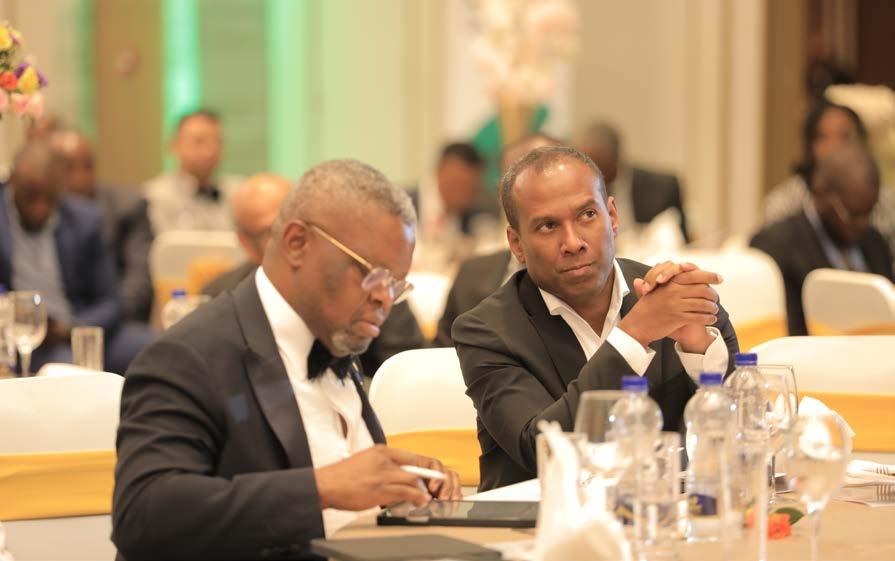

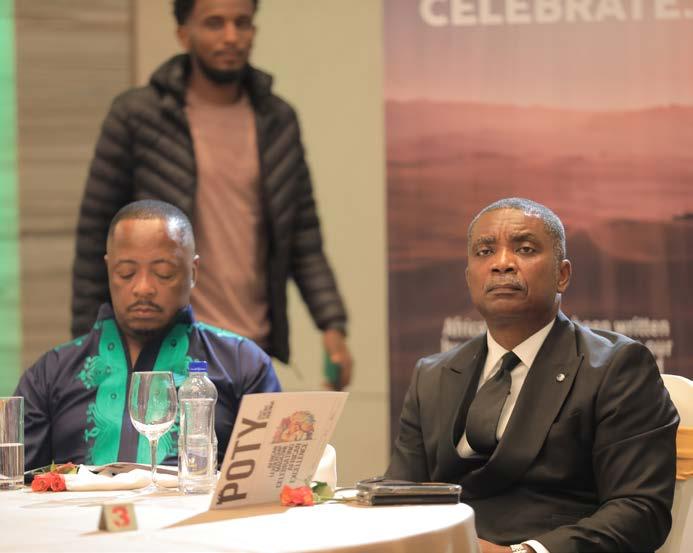
EVENTS 47 African Leadership Magazine |
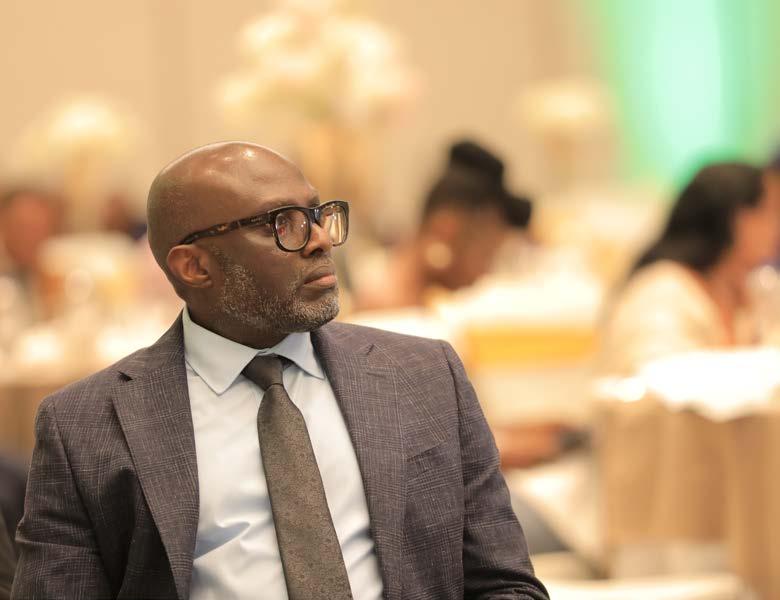
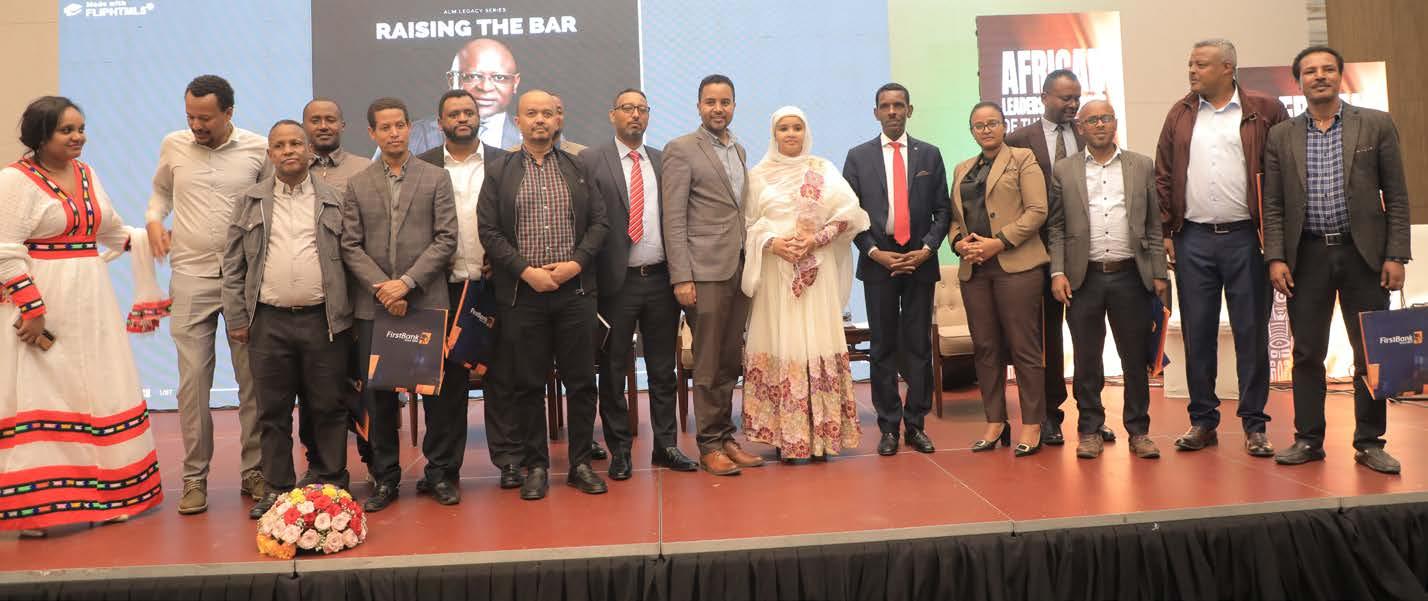


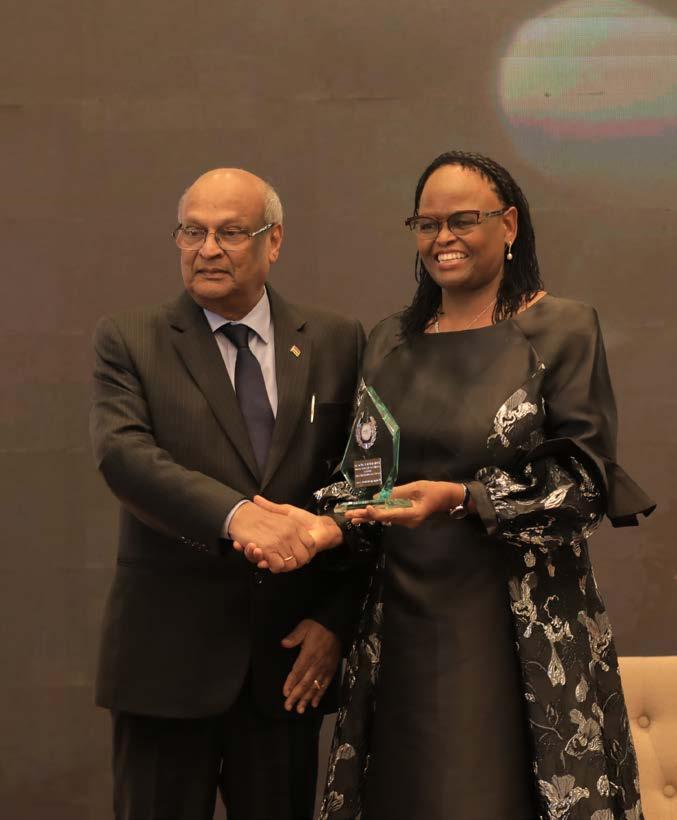
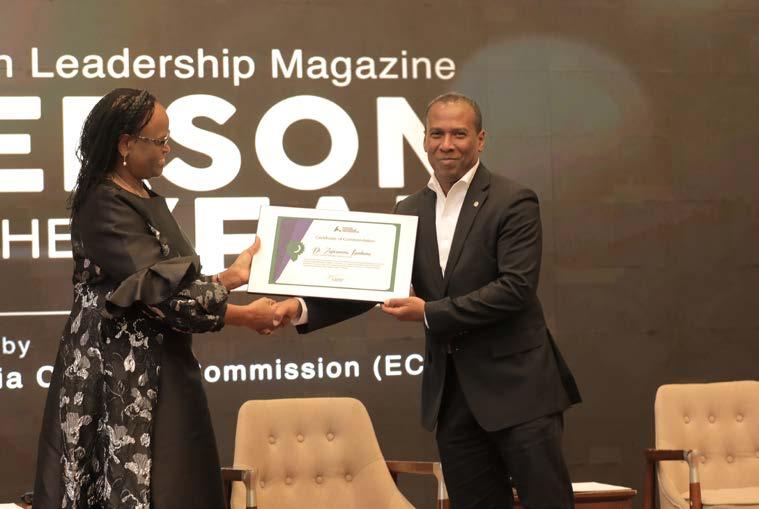

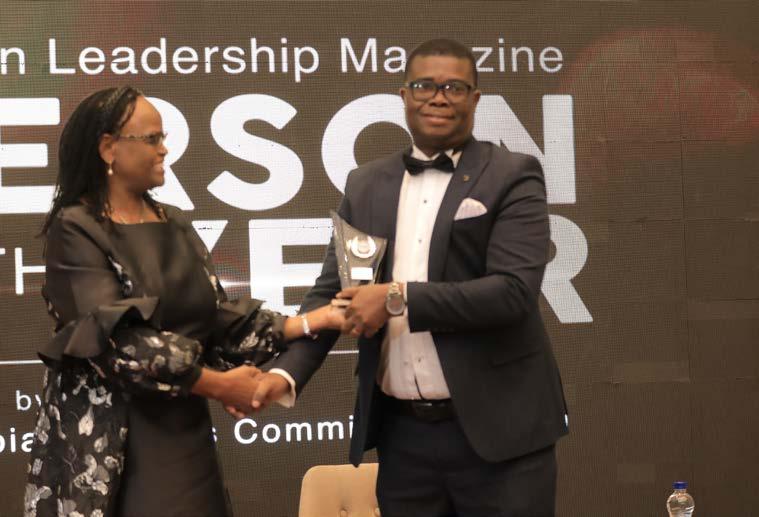
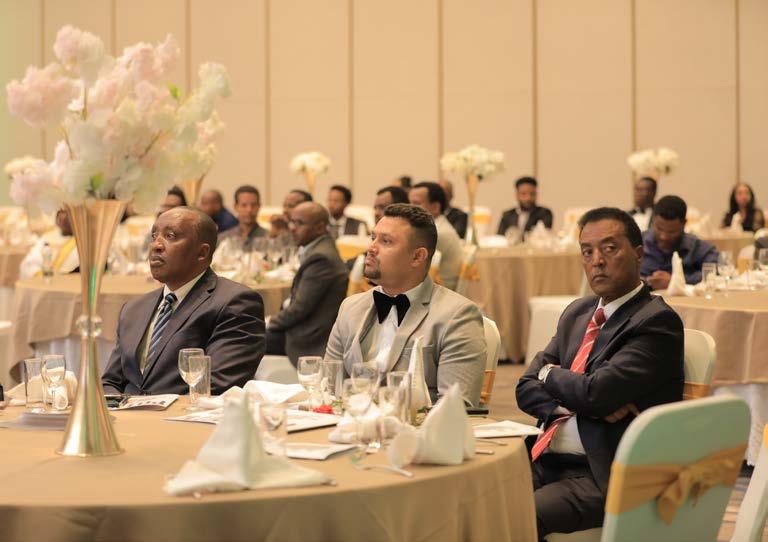

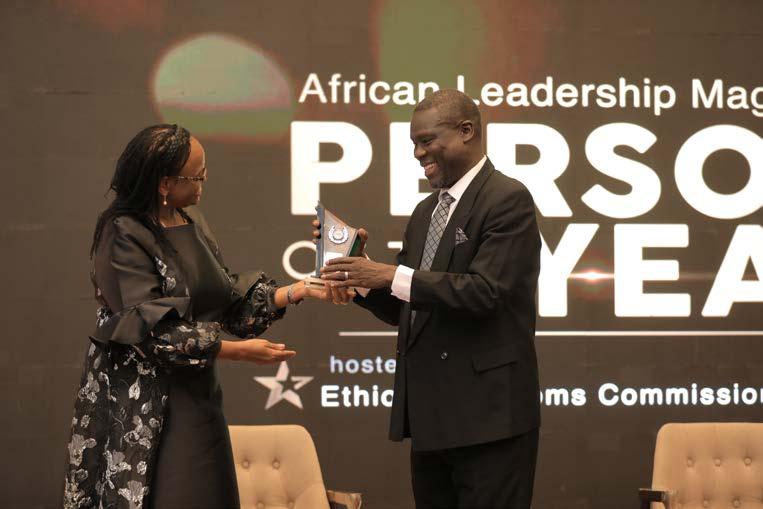
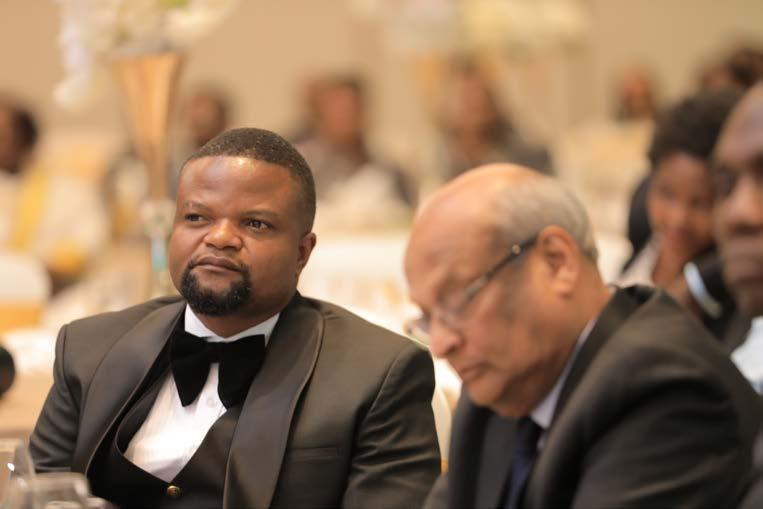
EVENTS 48 | African Leadership Magazine

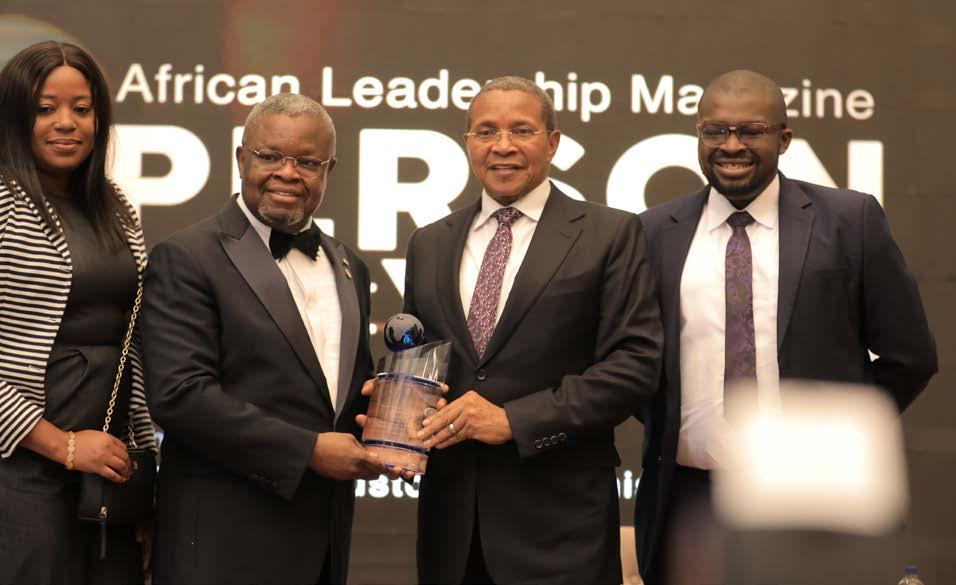
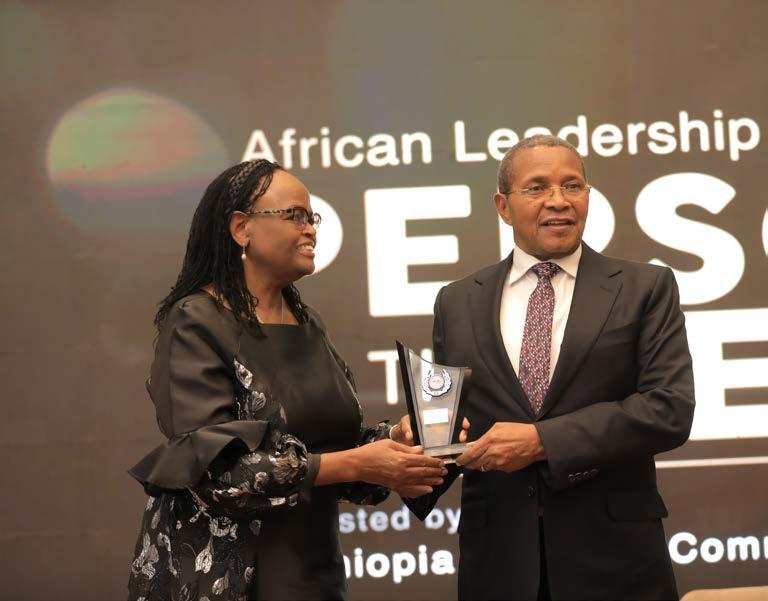
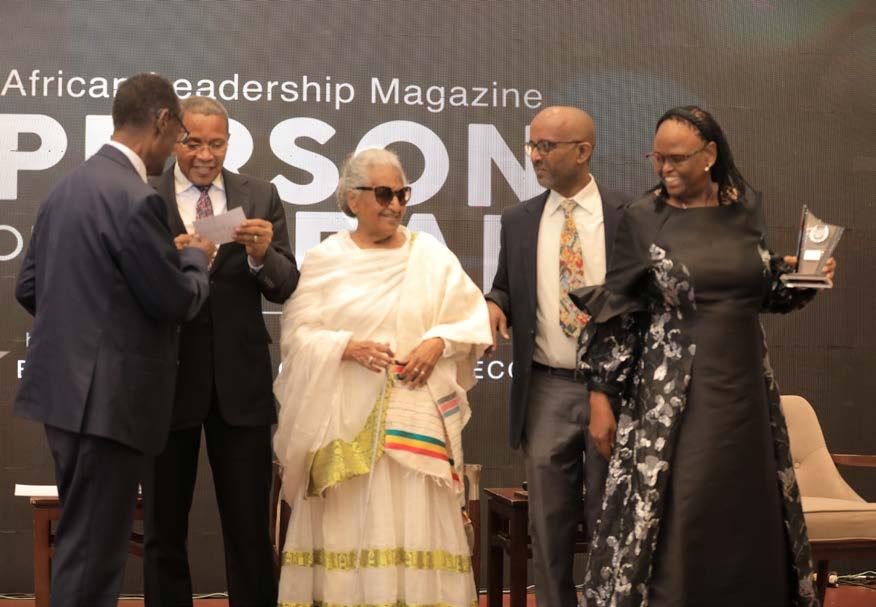
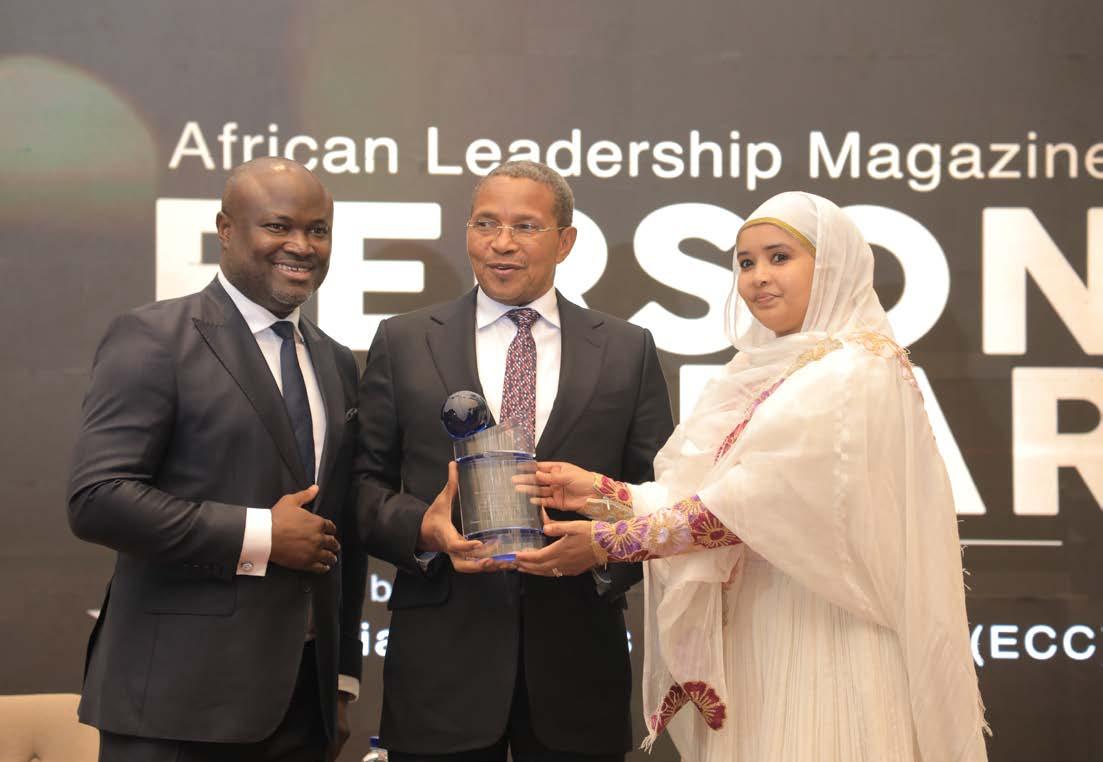
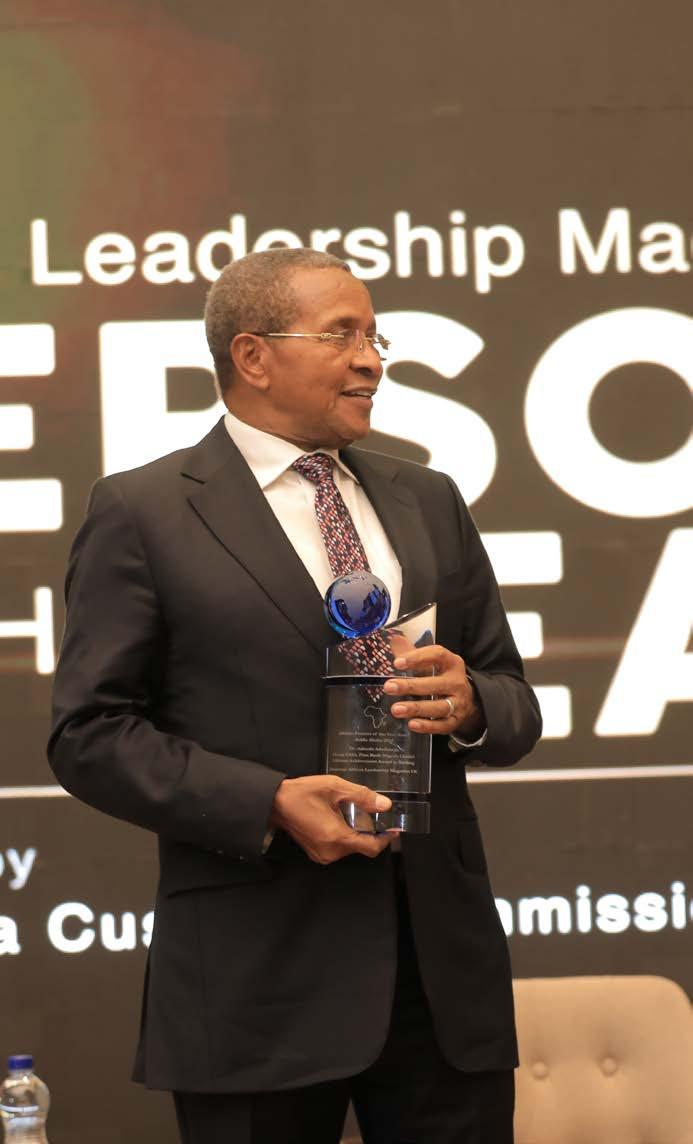
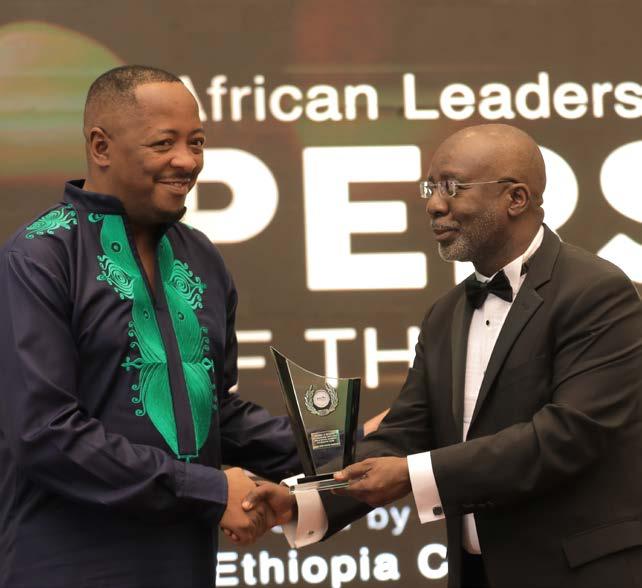
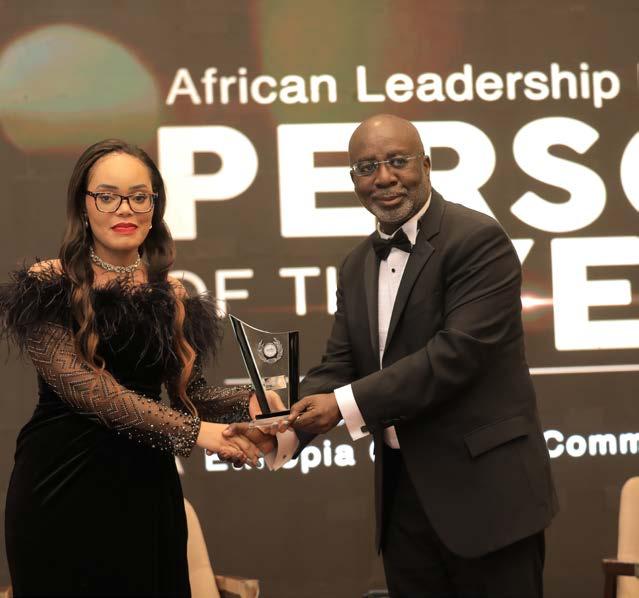
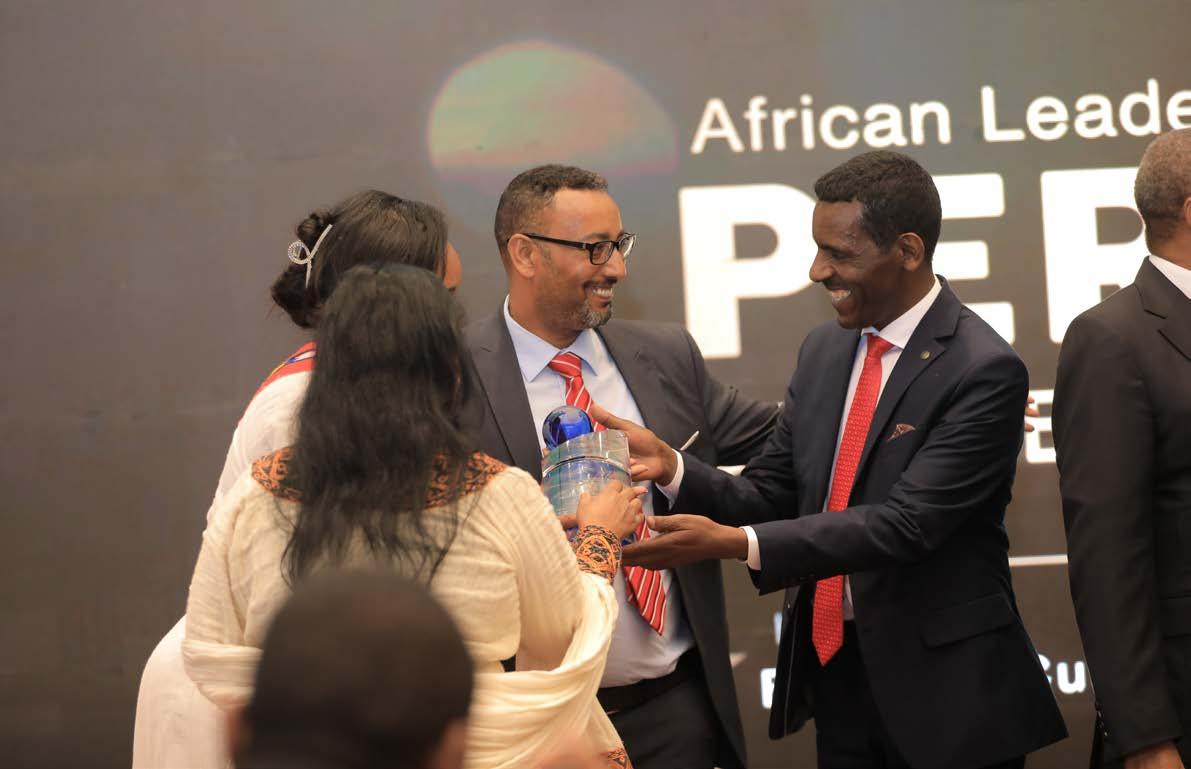

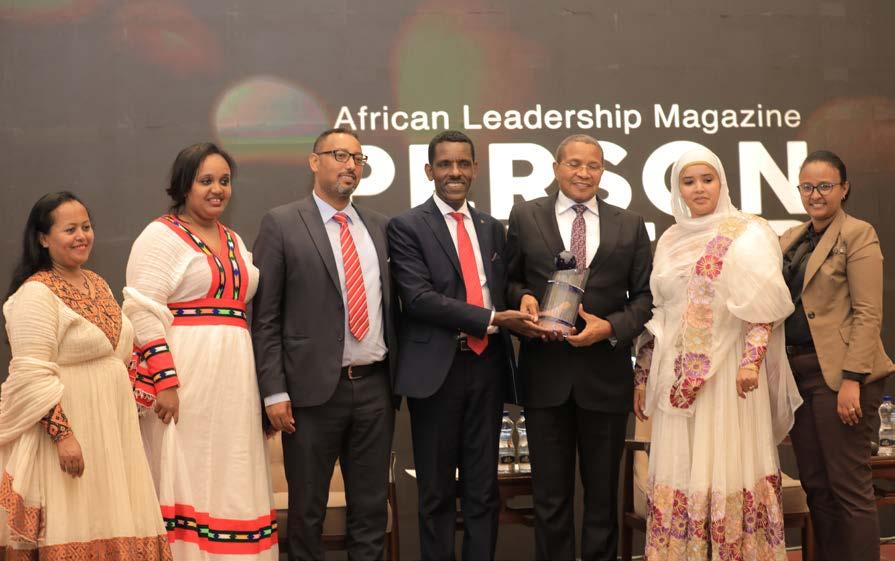
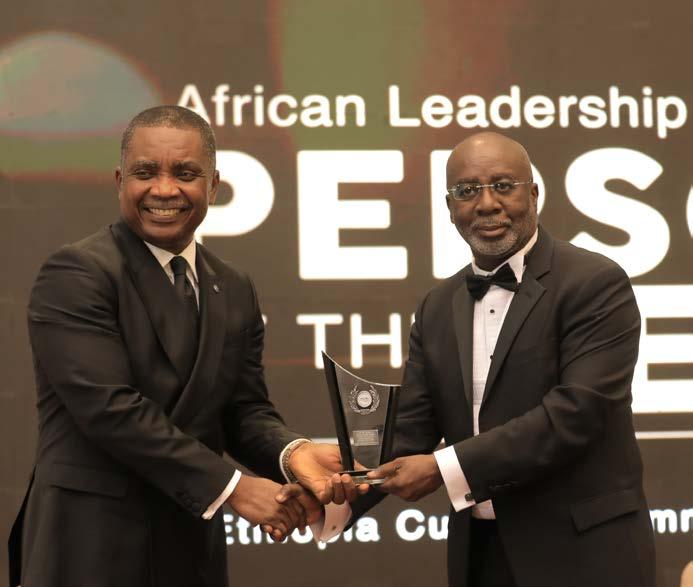

EVENTS 49 African Leadership Magazine |

HON. JUSTICE MARTHA K. EGH:KOOME, Pioneering Justice Reforms and Advocacy
In the annals of Kenya's legal history, few figures shine as brightly as Hon. Justice Martha K. Koome, EGH. Since assuming office as the 15th Chief Justice of the Republic of Kenya and 3rd President of the Supreme Court of Kenya on May 21, 2021, Justice Koome has been at the forefront of transformative justice reform, advocating tirelessly for the rights of women, children, and the marginalized.
50 | ISSUE 17.3 | African Leadership Magazine
JUDICIARY
Breaking Barriers: A Trailblazer in Kenya's Judiciary
Justice Koome's ascent to the pinnacle of Kenya's judicial system marks a historic milestone. As the first woman to hold the esteemed office of Chief Justice in over a century of the Judiciary's existence, she embodies resilience, competence, and trailblazing leadership. Prior to her appointment, she distinguished herself as a senior Judge of Appeal, where she presided over the Criminal Division with distinction.
During her tenure as an Appellate Judge, Justice Koome spearheaded groundbreaking initiatives aimed at enhancing case management efficiency and standardizing registry operations within the Court of Appeal. Her leadership in developing Court of Appeal Practice Directions and the Court of Appeal Registry Manual has revolutionized judicial proceedings, ensuring expeditious justice delivery and enhancing the overall customer experience.
A Journey of Service and Advocacy
Justice Koome's journey in the legal profession spans over three decades, characterized by unwavering commitment to justice, equality, and community service. Prior to joining the Judiciary, she honed her legal acumen as a distinguished legal practitioner, specializing in conveyancing, commercial law, civil litigation, criminal litigation, and family law.
Beyond her legal practice, Justice Koome has been a steadfast advocate for social justice and human rights. Her involvement in community service projects and pro-bono initiatives underscores her dedication to uplifting the vulnerable and marginalized segments of society. As President of the Kenya Magistrates and Judges Association (KMJA) and an official of the East Africa Magistrates and Judges Association (EAMJA), she championed judicial independence and the rule of law.
A Champion for Gender Equality and Child Rights
Justice Koome's advocacy extends far beyond the courtroom, encompassing gender equality and child rights on both national and international platforms. As Chairperson of the Federation of Women Lawyers Kenya Chapter (FIDA Kenya), she led efforts to promote legal and constitutional reforms aimed at advancing gender equality. Her appointment to the African Union Committee on the Rights and Welfare of the Child reflects her steadfast commitment to protecting and promoting the rights of children across Africa.
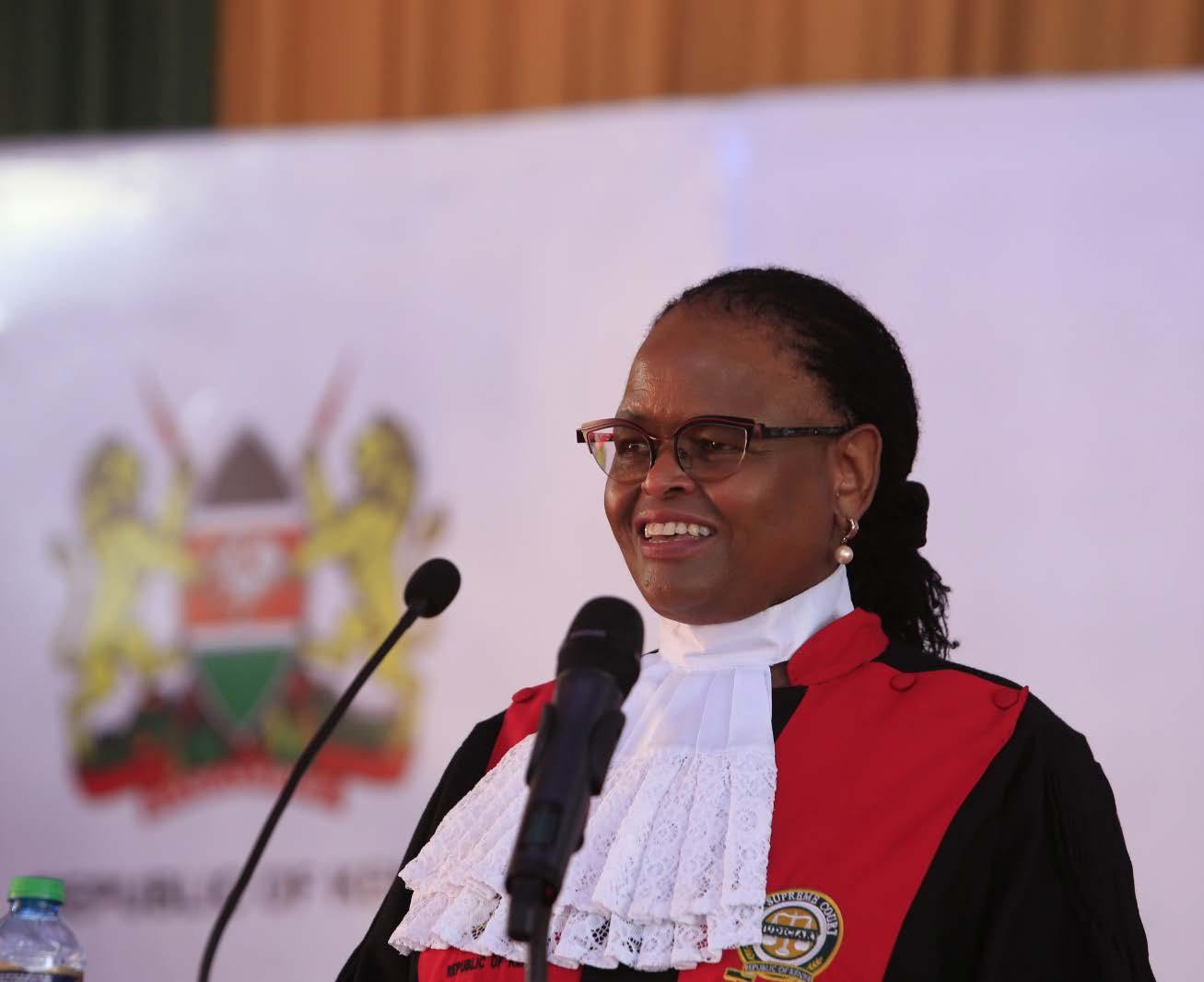
Her pivotal role in the law review process that birthed the Constitution of Kenya, 2010, underscores her dedication to constitutionalism and democratic governance. Recognized by the United Nations as an eminent human and children's rights defender, Justice Koome's contributions to the advancement of justice and human rights have earned her accolades both domestically and internationally.
A Vision for People-Centered Justice
As Chief Justice, Justice Koome is unwavering in her commitment to making the Kenyan justice system more accessible and responsive to the needs of all citizens, particularly the vulnerable and marginalized. Her emphasis on enhancing access to justice for women, children, and underserved communities underscores her vision for a more inclusive and equitable society.
With a Bachelor of Laws (LLB) degree from the University of Nairobi, a post-graduate Diploma in Law from the Kenya School of Law, and a Master of Laws (LLM) from the University of London, Justice Koome brings a wealth of legal expertise and academic rigor to her role. Her relentless pursuit of justice, coupled with her pioneering spirit and advocacy, continues to inspire a new generation of jurists and social activists across Kenya and beyond.
In recognition of her decades-long pioneering work in advocacy and the advancement of human rights, Justice Koome's legacy as a champion of justice and equality is firmly etched in the annals of Kenya's legal history. As she continues to chart new paths and break barriers, her leadership serves as a beacon of hope for a more just, equitable, and inclusive society.
51 ISSUE 17.4 | African Leadership Magazine |
JUDICIARY
AFRICA, DEMOCRACY, AND THE JUDICIARY; A continent at crossroads
by King Richard

Amidst the emancipation of several African nations in the latter half of the 20th century, the trajectory of democracy in Africa has been one of evolution. In yesteryears, democracy stood as the prime custodian of citizens’ rights, liberties, and interests. Yet, the consolidation of democratic processes, electoral governance, and dispute resolution presents itself as a daunting trial for Africa, as it does for other nations undergoing development. The profound words of Chinua Achebe resonate, declaring, “A functioning, robust democracy demands a sound, educated, participatory followership, and an enlightened, morally grounded leadership.”
In this discourse, we review the momentous implications of deepening democracy in Africa, the myriad of challenges it encounters, and the expedient avenues for resolving electoral disputes.
In Africa, democracy takes on a multifaceted dimension, with diverse levels of governance at play. The mere outcome of an election constitutes only one facet; participation in the political process stands as another. Thus, the institutionalization of democratic outcomes and the imperative adherence of political actors to the rules governing their conduct become pivotal in the process of deepening democracy in Africa. It is at the very core of this endeavor to strengthen the institutions responsible for ensuring a level playing field during election processes, which guarantees equal opportunities for all candidates and parties to participate. Therefore, to ensure that elections remain free, fair, and credible, utmost importance lies in the adoption of best practices by organizations overseeing electoral governance, such as electoral commissions.
ELECTIONS WATCH 52 | ISSUE 17.4 | African Leadership Magazine
Nonetheless, the drive to bolster democracy in Africa contends with various obstacles, ranging from ineffective leadership and corruption to resource scarcity and a dearth of political will. The majority of African democracies suffer from fragility, insufficient budgets, and frequent political interference, all of which severely impede their efficacy. A glaring impediment to the consolidation of democratic norms and practices in Africa arises from the absence of political determination among the leadership to enact changes that would enhance democracy. Instead, these leaders often exploit their positions to curtail civil society’s activities, muzzle the press, and stifle opposition voices.
Consequently, the pursuit of good governance, accountability, transparency, and the rule of law must be harmonized in a concerted effort to fortify democracy in Africa. Integral to this endeavor is the establishment of independent and potent institutions, such as electoral commissions, tasked with planning, executing, and overseeing elections, while being adequately equipped with technological, financial, and human resources. Furthermore, a resolute political commitment is indispensable to safeguarding these institutions’ autonomy from undue political meddling. To boost voter engagement and foster trust in the electoral process, citizens’ rights and responsibilities, along with the significance of their participation in the political milieu, must be clearly elucidated.
Moreover, the timing of a tribunal’s or court’s verdict on election-related matters can wield profound ramifications on a nation’s democratic fabric and political stability. Delays in resolving such disputes have the potential to cast aspersions on the election’s legitimacy and erode public faith in democratic institutions. The repercussions of procrastinating tribunal or court rulings on election matters encompass political instability, violence, and the corrosion of democratic ideals.
Impact of Delayed Tribunal/Court Judgment on Election Matters:
1. Violation of Human Rights: Electionrelated disputes may at times escalate into violent altercations, leading to casualties and property damage. When disagreements remain unresolved, grave human rights violations like extrajudicial executions, forced disappearances, and torture can ensue.
2. Jeopardizing the Election’s Legitimacy: Elections form the bedrock of democratic governance, and when their results are
contested, the government’s authority comes under scrutiny. The moral credibility of the elected government may be further undermined if election disputes are not expeditiously addressed, fostering a perception of electoral malfeasance.
3. Conflict and Violence: Sluggish judicial decisions can incite violence, with political actors often resorting to such means due to perceived bias or indifference from the judiciary. Political leaders or their supporters may resort to violence to exert pressure on the judiciary, interpreting any delay as a sign of partiality or judicial corruption. Such delays can also prolong periods of political unpredictability, exacerbating racial or religious tensions and potentially leading to prolonged and deadly conflicts.
4. Erosion of Democratic Principles: Timely resolution of disputes is pivotal for upholding democratic governance. Prolonged deliberations, which cast doubts on the independence and impartiality of courts, can foster cynicism, apathy, and disengagement, thereby undermining the democratic process.
5. Political Instability: Election conflicts can create chasms and divisions that ripple through society, as elections stand as a crucial pillar of democratic governance. Protracted judicial delays intensify political tensions, fueling protests, riots, and rallies. Such delays exacerbate concerns about political stability, placing immense strain on institutions and the societal fabric. Political instability adversely impacts the government’s legitimacy, foreign investment, and economic growth.
6. Waste of Time and Resources: Delays in electoral dispute resolution not only erode public confidence in the electoral process but also squander valuable time and resources. Instead of investing in constructive endeavors, resources are diverted to tackle electoral disputes. Furthermore, delays hinder the efficiency of the electoral process, jeopardizing the entire democratic system’s functionality.
In addition, the postponement of a tribunal’s or court’s decision on election-related matters can have far-reaching implications on a nation’s economy. Political unpredictability and instability can disrupt trade, erode investor confidence, and impede economic growth.
In certain instances, instability may prompt trade and investment embargoes, exacerbating economic woes.
ELECTIONS WATCH
53 ISSUE 17.4 | African Leadership Magazine |
VIABLE APPROACHES TO RESOLVING ELECTORAL DISPUTES IN AFRICA
The advancement of democracy in Africa critically hinges on the expeditious resolution of electoral disputes. Such disputes can jeopardize the integrity of the electoral process and impede the peaceful transfer of power. The foremost goals of electoral dispute resolution encompass the accurate representation of the people’s will in election outcomes and the swift and satisfactory resolution of any complaints or grievances. The credibility of the democratic system, the fairness of the electoral process, and the legitimacy of elected officials all hinge on the effective resolution of electoral disputes.
Ultimately, the preservation of democracy, safeguarding citizens’ rights, and nurturing political stability hinge on the swift and effective resolution of pre-election and postelection disputes. To mitigate the ensuing consequences, a robust dispute resolution system that rapidly and equitably addresses these issues is imperative.
However, the resolution of electoral disputes in Africa is often laden with challenges, encountering issues of delays and susceptibility to manipulation. The most affected stakeholders frequently bear the brunt of resource wastage, uncertainty, and political instability when election results are contested, often involving legal, political, or even violent tactics employed by dissatisfied factions. Electoral disagreements have manifested in Africa as both pre-election violence and postelection violence.
Despite these encouraging developments, the endeavour to cultivate democracy in Africa confronts numerous hurdles. Foremost among these obstacles is the specter of corruption, which undermines the legitimacy of democratic processes. Corruption erodes public trust in democratic institutions, hindering the functioning of a transparent and accountable government. Concurrently, conflicts and political instability present another significant challenge. The economic, infrastructural, and social ravages inflicted by conflicts have left numerous African nations reeling in poverty.
Nevertheless, several strategies can be adopted to ensure the swift resolution of electoral disputes in Africa:
> Establishment of an Effective Dispute Resolution Mechanism: To ensure the prompt resolution of electoral disputes in Africa, the court system must be fortified to offer viable alternatives to prolonged judicial proceedings. Supporting alternative dispute resolution mechanisms such as mediation and arbitration can expedite the resolution process, while enhancing the electoral appeals procedure remains crucial to addressing disputes decisively.
> Guaranteeing the Impartiality and Independence of the Electoral Commission: Ensuring the unwavering trust of all political actors in the election administration body is of paramount importance. The electoral commission must be adequately staffed and resourced to eliminate doubts concerning the integrity of election results. Transparent and inclusive voting processes are also pivotal to inspire confidence in the electoral system.
> Promotion of Civic Education Participation, Regional Cooperation, and Integration: Clear articulation of people’s rights and responsibilities during the electoral process is essential. Cooperation among African nations in advancing democracy and stability fosters a sense of ownership and responsibility, leading to increased civic engagement. Regional organizations such as the African Union (AU) and Economic Community of West African States (ECOWAS) should prioritize the promotion of democratic norms and the settlement of electoral disputes.
> Cultivation of Values of Dialogue and Accommodation Among Political Actors: Political parties and their leaders must cultivate the capacity to accept election outcomes and work in the nation’s best interests. Establishing channels for dialogue and compromise can alleviate tensions and avert confrontations.
Ultimately, the preservation of democracy, safeguarding citizens’ rights, and nurturing political stability hinge on the swift and effective resolution of pre-election and post-election disputes. To mitigate the ensuing consequences, a robust dispute resolution system that rapidly and equitably addresses these issues is imperative.
For Africans to repose faith in the judiciary’s ability to swiftly resolve conflicts, the political system must uphold impartiality, independence, and well-qualified staffing. Henry Johnson Jr once poignantly remarked, “Africa belongs to Africans, and it is upon this premise that only Africans can effect change within Africa. Foreign benevolence will not suffice.”
ELECTIONS WATCH 54 | ISSUE 17.4 | African Leadership Magazine
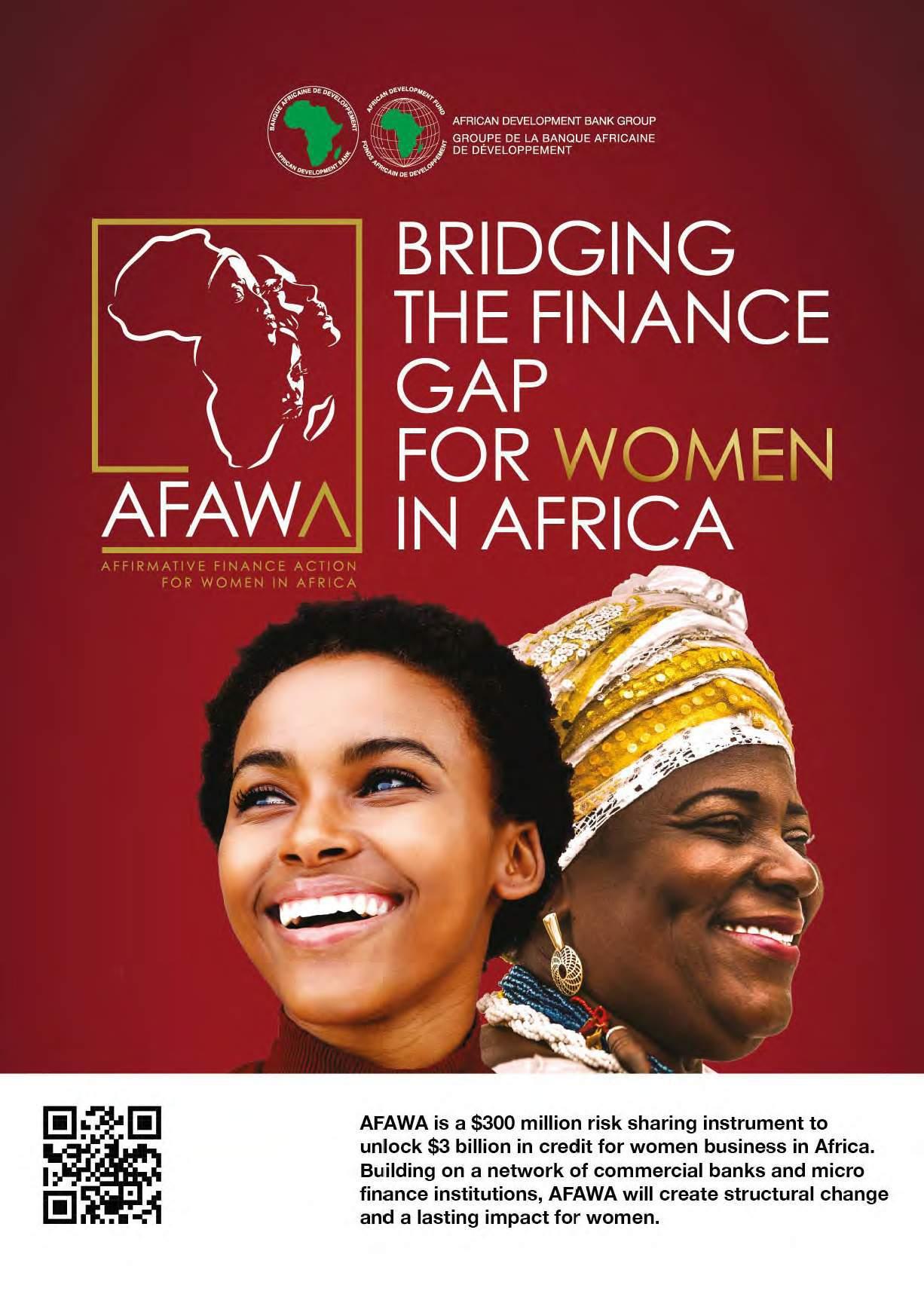


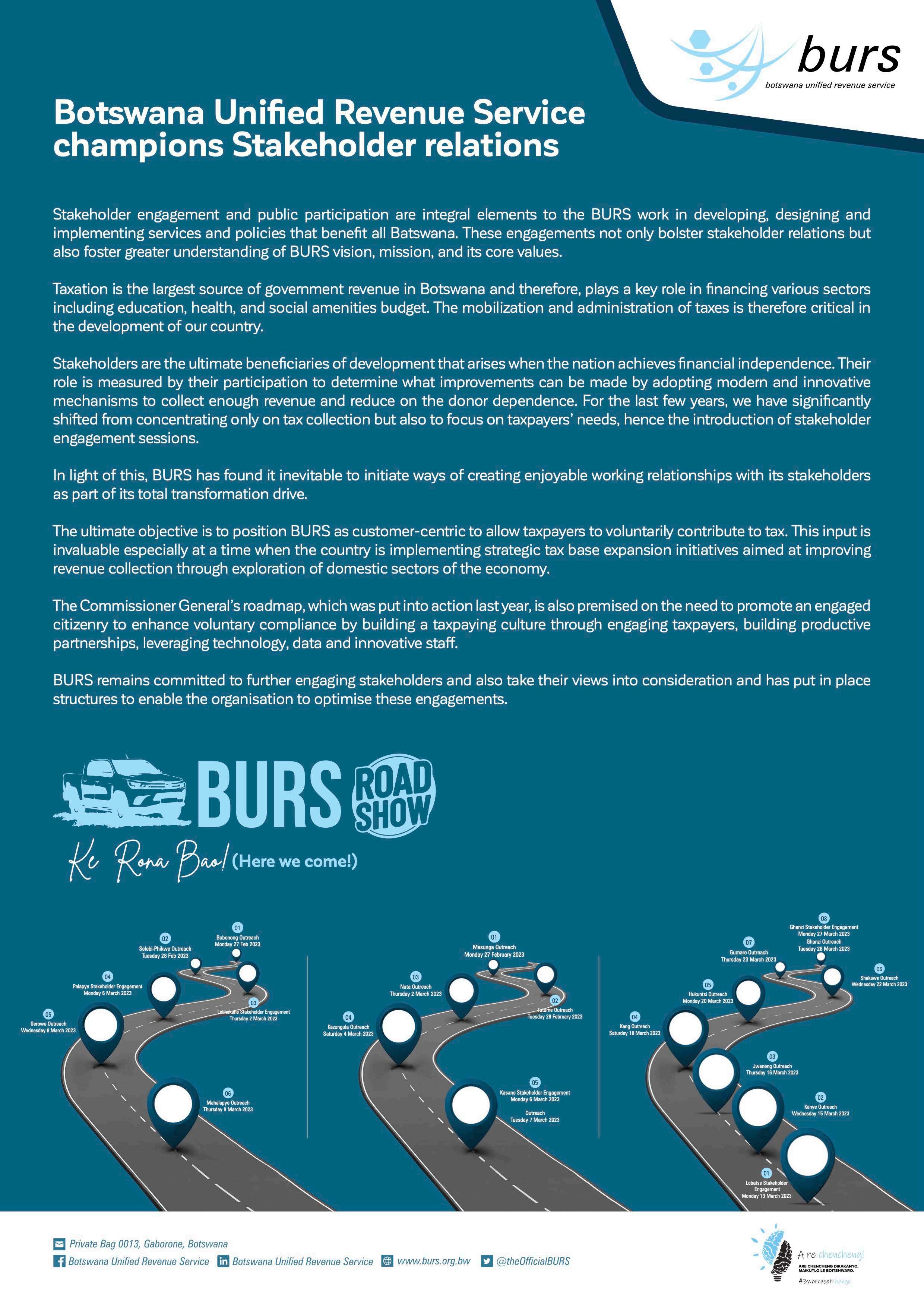

BOTSWANA UNIFIED REVENUE SERVICE COMMISSIONER GENERAL
MRS JEANETTE CHANDA MAKGOLO’S PROFILE

Ms. Makgolo is the Botswana Unified Revenue Service Commissioner General. She holds a Bachelor of Commerce Degree from the University of Botswana, a post-graduate Professional Training in Public Finance Management from the National Institute of Finance Management in India, and a Senior Executive Fellow of the Harvard Kennedy School - Cambridge, USA.
Ms Makgolo is a seasoned public officer and a veteran accountant who has served the office of the Accountant General in the Ministry of Finance and Economic Development for over 30 years. Amongst other duties, she took part in the development of Botswana’s Public Procurement Bill that was passed as law in the July 2020 Parliamentary session. She also actively participated in the review of the accountancy legislation in Botswana, an exercise that resulted in the enactment of the first ever Financial Reporting Act that established the Botswana Accountancy Oversight Authority (BAOA) and the revised Botswana Institute of Accountants Act that established the Botswana Institute of Chartered Accountants (BICA) qualification.
Ms. Makgolo serves in various boards, including Botswana Unified Revenue Service Board; African Tax Administration Forum, the Botswana Accountancy Oversight Authority, African Confederation of Cooperative Savings and Credit Association, and the International Public Sector Accounting Standards Board Consultative Advisory Committee. She previously served in Morupule Coal Mine Rehabilitation Trust Fund and the Botswana Institute of Chartered Accountants Public Sector Committee.
Ms Makgolo joined the revenue service at a critical time when the fiscal position of the country had deteriorated, and new measures required to transform the revenue service into a modern revenue authority capable of increasing collection of domestic revenues. Within the short period she has been with the BURS, Ms Makgolo had charted the Revenue Service Transformation Roadmap that has started to gain traction. BURS has realized an upward growth trajectory in revenue collections owing to her chartered Transformation Strategy that has recognized the new age issues coupled with well executed initiatives geared towards improving revenue collection and service delivery.
Her efforts on the transformation of the organisation have not gone unnoticed since she was recognised during the 2023 Africa Public Sector Conference & Awards for her outstanding contribution to promoting innovative tax administration in Botswana and Africa. Ms. Makgolo was awarded the “2023 Public Sector African Woman of the Year” at the 4th Africa Public Sector Conference & Awards 2023 held in Nairobi - Kenya, and simultaneously BURS also scooped an award for “Best Use of Technology to Revolutionize CX.”

China’s Diplomacy and Interest in the African Market

China’s engagement with Africa has been marked by deliberate and strategic diplomatic patterns, reflecting its growing interest in the continent’s markets and resources. This engagement has evolved into a multifaceted relationship, intertwining economic interests with diplomatic overtures, infrastructure investments, and cultural exchanges.
Research from Boston University highlights a significant gap in China’s investment strategy in Africa concerning green power initiatives. Despite President Xi Jinping’s pledge to support the development of green and low-carbon energy, Chinese lending and investment in Africa have predominantly favored fossil fuel projects over renewables. This neglect of green power investments spans nearly two decades, hindering Africa’s energy transition and exacerbating environmental challenges.
Unlike traditional Western powers, China adopts a noninterference policy in the internal affairs of African nations, which resonates with many African leaders. This stance contrasts sharply with the historical legacy of colonialism and neo-imperialism, endearing China to African countries seeking autonomy and self-determination.
62 | ISSUE 17.4 | African Leadership Magazine
BUSINESS LEADERSHIP
China’s new foreign minister, Qin Gang, visited five African countries and the African Union in January 2023. Wang Yi, the former foreign minister, visited 48 African countries, and Premier Xi Jinping undertook 10 visits to Africa between 2014 and 2020.
Economic cooperation lies at the heart of China’s engagement with Africa. The continent’s vast natural resources, burgeoning consumer markets, and strategic geographic location make it an attractive destination for Chinese investments. China’s appetite for resources such as oil, minerals, and agricultural products aligns with Africa’s desire for infrastructure development and economic growth. Through trade agreements, investment projects, and aid packages, China has become Africa’s largest trading partner and a significant source of investment and development assistance.
China’s Belt and Road Initiative (BRI) exemplifies its commitment to enhancing connectivity and economic integration with Africa. The BRI, a massive infrastructure development project spanning multiple continents, aims to revive ancient trade routes and foster economic cooperation. In Africa, the BRI has facilitated the construction of railways, ports, highways, and telecommunications networks, improving connectivity and stimulating trade and investment. By investing in infrastructure projects, China not only gains access to African markets but also fosters goodwill and strengthens diplomatic ties with host countries.
Moreover, China’s diplomatic strategy in Africa extends beyond economic interests to encompass political and cultural dimensions. Beijing actively cultivates relationships with African governments through high-level visits, diplomatic exchanges, and multilateral forums. China’s diplomatic overtures often include generous aid packages, debt relief, and technical assistance, enhancing its influence and soft power in the region. Furthermore, China promotes cultural exchanges, educational scholarships, and people-to-people interactions, fostering mutual understanding and goodwill between Chinese and African societies.
While instrumental in financing infrastructure projects, China’s development finance institutions have primarily focused on sectors such as commodity extraction and electrification, aligning with China’s own economic interests. Hydropower projects, for instance, have been earmarked to support the extraction of various metals, reflecting a pattern of investment that prioritizes resource extraction over sustainable energy development.
Africa possesses immense potential for renewable energy, with solar and wind resources among the highest in the world. Yet, Chinese lending for renewables has remained disproportionately low, constituting a mere 2% of energy loans from 2000 to 2022. This stands in stark contrast to the urgent need for clean energy solutions to address Africa’s energy poverty and mitigate the impacts of climate change.
China’s engagement with Africa has been subject to controversy and criticism. Critics argue that China’s pursuit of economic interests disregards environmental sustainability, labor rights, and governance standards in African countries. Moreover, China’s loans and investments often come with strings attached, leading to debt dependency and neocolonialism concerns. Additionally, China’s support for authoritarian regimes and its role in natural resource extraction have raised questions about its commitment to democracy and human rights in Africa.
Despite these challenges, China’s diplomatic patterns and interest in the African market continue to evolve. Beijing recognizes the importance of maintaining stability and fostering sustainable development in Africa to safeguard its investments and long-term interests. Consequently, China has taken steps to address some of the criticisms against its engagement with Africa, such as promoting environmental sustainability, corporate social responsibility, and debt restructuring.
China’s appetite for resources such as oil, minerals, and agricultural products aligns with Africa’s desire for infrastructure development and economic growth.
The disparity between China’s rhetoric on various sectors and its investment priorities proves the need for a recalibration of its approach to Africa’s energy sector.
Looking ahead, China’s diplomatic strategy in Africa is likely to remain a cornerstone of its foreign policy and economic agenda. As Africa’s population and economy continue to grow, the continent will become an increasingly important market and partner for China.
63 ISSUE 17.4 | African Leadership Magazine |
BUSINESS LEADERSHIP
HOW TO TAP INTO THE TOURISM POTENTIAL IN NIGERIA
By Blossom Ukoha
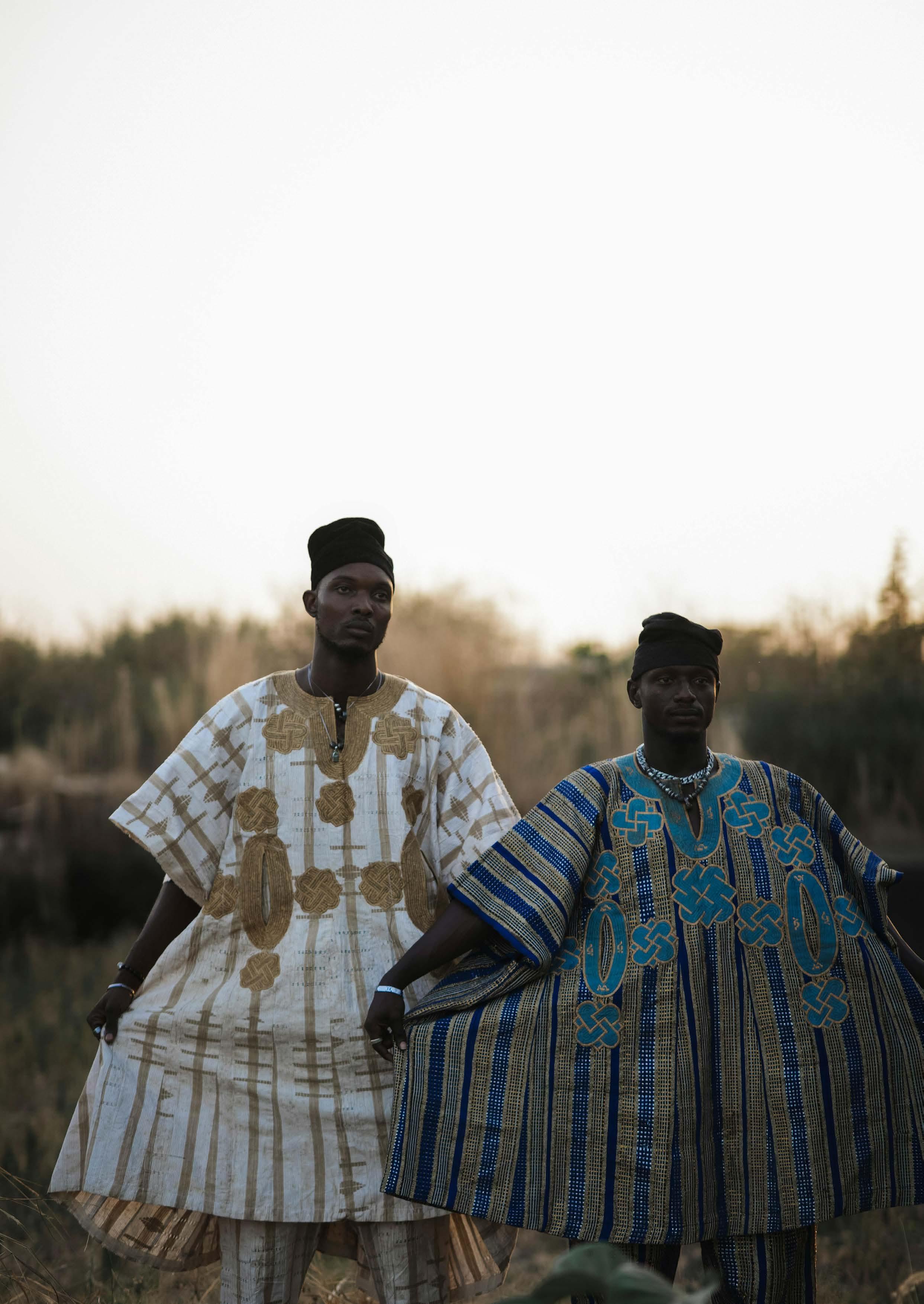
Nigeria, the most populated nation and economic powerhouse in Africa, is home to a diverse range of historical sites, natural wonders, and cultural attractions. Nigeria has many sights to offer, ranging from vibrant metropolises to tranquil countryside, which could entice travelers from all over the world. In contrast to its equivalents in other nations, Nigeria’s tourism industry is still in its infancy, despite the country’s wealth of tourism resources. A concerted effort is needed to fix infrastructural shortages, strengthen marketing and promotion, improve
security, include local communities, and establish supportive policies conducive to tourist growth in order to fully realize Nigeria’s tourism potential.
One of the main obstacles impeding Nigeria’s tourism expansion is the deficiency of suitable infrastructure, encompassing lodging, transit, and tourism amenities. Infrastructure development requires significant investment if Nigeria is to realize its tourism potential. This entails modernizing highways, airports, and public transit networks to provide
64 | ISSUE 17.4 | African Leadership Magazine
TOURISM AFRICA
smooth travel between tourist attractions. In addition, to accommodate guests and give them suitable housing options, high-quality hotels, resorts, and tourist lodges must be built.
In addition, visitor centers, restrooms, signage, and recreational facilities are among the amenities that must be considered while developing tourist sites. Not only does improved infrastructure improve the entire visitor experience, but it also sends a message to the commercial sector about the government’s support for the growth of tourism.
Effective marketing and promotion are indispensable for showcasing Nigeria’s tourism assets and attracting visitors. A robust marketing strategy should leverage digital platforms, social media, and traditional marketing channels to reach domestic and international audiences. Engaging content such as videos, photographs, and travel blogs can highlight Nigeria’s cultural festivals, natural wonders, historical sites, and vibrant cities, enticing travelers to explore the country’s diverse offerings.
Collaboration with travel agencies, tour operators, and online booking platforms can facilitate the distribution of tourism packages and streamline the booking process for visitors. Moreover, participation in international travel fairs, exhibitions, and trade shows provides an opportunity to showcase Nigeria’s tourism products and forge partnerships with stakeholders in the global tourism industry.
Involving local communities in tourism development initiatives is essential for ensuring their participation, empowerment, and equitable distribution of benefits. Communities living near tourist attractions should be engaged as partners in preserving cultural heritage, conserving natural resources, and promoting responsible tourism practices.
Community-based tourism initiatives, such as homestays, cultural exchanges, and guided tours led by local guides, can offer authentic experiences to visitors while generating income and employment opportunities for residents. Additionally, capacity-building programs focusing on hospitality training, entrepreneurship skills, and sustainable resource management can empower communities to actively participate in the tourism value chain.
Policy reforms are necessary to create an enabling environment for tourism development in Nigeria. This includes the formulation of clear regulatory frameworks, investment incentives, and tax breaks to attract private sector investment in tourism infrastructure and services. Streamlining visa processes, reducing
bureaucratic hurdles, and enhancing security measures can improve the ease of travel and perception of safety among tourists.
Furthermore, the establishment of designated tourism zones, the preservation of heritage sites, and the enactment of environmental conservation laws are crucial for safeguarding Nigeria’s natural and cultural assets for future generations. Collaboration between government agencies, tourism stakeholders, and local communities is essential for coordinating efforts, monitoring progress, and addressing emerging challenges in the tourism sector.
Success Stories
Nigeria may learn a lot from the nations that have effectively realized their tourism potential. For example, Rwanda changed its reputation from being a post-conflict country to one of the world’s top travel destinations by emphasizing eco-tourism, cultural tourism, and gorilla trekking. By means of well-planned promotional initiatives, infrastructural expenditures, and active community engagement, Rwanda has successfully drawn an increasing number of foreign tourists, thereby making a substantial economic contribution.
In a similar vein, Kenya has established itself as one of Africa’s top safari destinations by capitalizing on its national parks, animal reserves, and immaculate beaches. Kenya has maintained tourist growth and produced jobs for local populations by expanding its range of tourism options, funding eco-tourism projects, and encouraging sustainable practices.
Nigeria’s tourist potential must be realized through a multidimensional strategy that includes policy changes, community engagement, infrastructure development, and marketing and promotion. Nigeria may establish itself as one of Africa’s top travel destinations by making investments in firstrate infrastructure, exhibiting its array of attractions, strengthening local communities, and putting supportive legislation into place.
Nigeria can draw millions of domestic and foreign tourists, spur economic growth, and advance sustainable development because of its rich cultural legacy, breathtaking natural features, and energetic cities. Nigeria has the ability to leverage tourism as a means of achieving economic growth and development by collaborating with private sector companies, government agencies, and local communities.
65 ISSUE 17.4 | African Leadership Magazine |
TOURISM AFRICA
ADDRESSING THE IMPERATIVES OF INTRA-AFRICAN TRADE: Perspectives from the Ethiopian Customs Commissioner
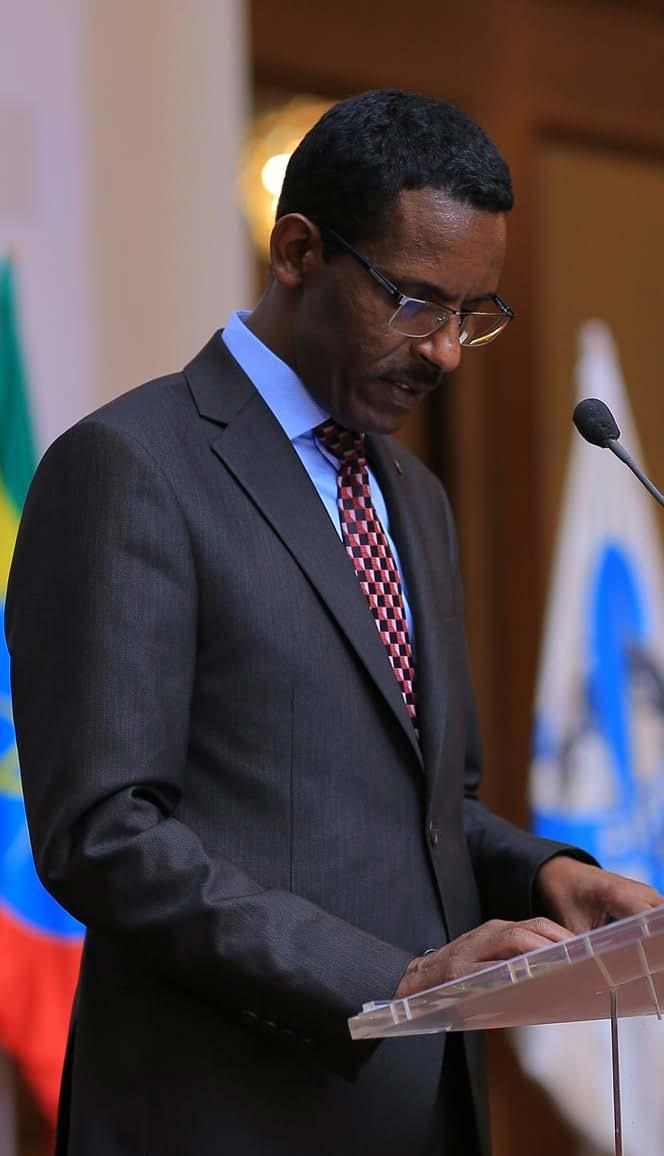
Distinguished guests, Esteemed participants, Organizers of the Africa Customs Administration & Ports Management Roundtable,
It is with great honor and pleasure that I stand before you as the Commissioner of the Ethiopian Customs, addressing this esteemed gathering at the Africa Customs Administrations & Ports Management Roundtable. The theme of our discussion, “Realities & Perspectives for Intra-African Trade: Collaborations, Integration, and Interdependency,” holds profound significance as we navigate the complexities and opportunities that lie ahead for our continent. This theme resonates deeply with the Ethiopian Customs Commission, and speaks to the transformative potential that resides within our grasp.
As we gather here in the vibrant city of Addis Ababa, a nexus of cultural and economic dynamism, the significance of our discussions cannot be overstated. The theme underscores the imperative of fostering collaborative efforts, integration, and interdependency for the advancement of intra-African trade. In a world that is increasingly interconnected, it is essential for customs administrations and port authorities to play a pivotal role in facilitating seamless trade across borders.
The theme prompts us to delve into the practical aspects of fostering collaborations, enhancing integration, and understanding the interdependency that underpins successful trade relations across Africa. The reality is that intra-African trade remains significantly subdued, accounting for a mere 18% of the continent’s total
66 | ISSUE 17.4 | African Leadership Magazine
POLITICAL LEADERSHIP

trade volume. This is far behind in comparison to other regions like Europe, where intraregional trade exceeds 60%. These statistics expose the glaring gap between aspiration and realization. However, within this reality, the Ethiopian Customs Commission chooses to see not limitations, but potential. And that potential lies in collaboration, integration, and understanding the critical role of customs and port management in shaping the future of African trade.
The Imperative of Collaboration: Unlocking the Potential of Intra-African Trade
The need for customs and port collaboration is paramount in realizing the aspirations of AfCFTA. Customs and ports are the gatekeepers of international trade, and their synergy is crucial for seamless cross-border transactions. Collaboration involves sharing best practices, embracing technology, and fostering mutual understanding among customs administrations and port authorities. This collaborative approach is a key to overcoming challenges such as delays, inefficiencies, and non-tariff barriers that hinder the growth of intra-African trade.
Information sharing, mutual recognition of standards, and coordinated efforts to combat illicit trade among customs administrations are essential components of a successful collaboration strategy at regional level. It is through such partnerships that we can address the challenges posed by non-tariff barriers and pave the way for a more integrated and efficient trade ecosystem. Efficient ports require swift customs clearance, and streamlined
customs procedures depend on efficient port operations. This symbiotic relationship demands closer collaboration, joint initiatives, and a shared commitment to reducing clearance times and facilitating legitimate trade. However, collaboration cannot exist in a vacuum. It thrives on partnerships, on open communication, and on a shared understanding of the challenges and opportunities we face. This Roundtable serves as a crucial platform for forging those partnerships. Here, customs officials, port authorities, private sector leaders, and policymakers can engage in meaningful dialogue, identify common pain points, and cocreate solutions that truly unlock the potential of intra-African trade.
Ethiopia’s Role in Advancing IntraAfrican Trade: The Journey Toward Collaborative Prosperity
Ethiopia, with its strategic location and growing economy, is poised to play a pivotal role in this interconnected Africa. Our landlocked nature has urged us to invest heavily in port infrastructure, developing corridors that link us to the sea. The Addis Ababa-Djibouti Railway, for instance, has significantly reduced transit times and costs, demonstrating the tangible impact of collaborative infrastructure development.
Ethiopia, in its pursuit of enhancing trade facilitation, has recognized the importance of collaboration not only within our borders but also with our African counterparts. The partnerships we anticipate today will shape the future of trade in Africa. We are committed to fostering an environment where information flows seamlessly, standards are mutually
67 ISSUE 17.4 | African Leadership Magazine |
POLITICAL LEADERSHIP
recognized, and efforts are coordinated to combat illicit trade. Our collaborative initiatives extend beyond borders, reflecting our dedication to the shared prosperity of the African continent. Ethiopian Customs, as a vital player in facilitating cross-border trade, recognizes the pivotal role it plays in advancing the objectives of the African Continental Free Trade Area (AfCFTA). Our commitment is unwavering, and we have undertaken significant strides to modernize customs procedures, embracing technology to ensure efficiency and transparency. Our aim is to create an environment that not only facilitates trade but also mitigates challenges, ensuring a smoother, more expedited flow of goods.
As Commissioner of the Ethiopian Customs Commission, I remain steadfastly committed to these goals. We are actively participating in regional initiatives like the African Continental Free Trade Area (AfCFTA) and COMESA. We are working closely with neighboring countries to harmonize procedures and facilitate crossborder trade. And we are continuously implementing reforms to modernize our operations and enhance transparency.
Conclusion: Forging a Collaborative Future for African Trade
To the esteemed participants who have gathered here from various corners of the continent, your presence speaks volumes about your commitment to building a more prosperous Africa. Your perspectives, experiences, and insights contribute to the richness of our dialogue and offer valuable insights into the diverse challenges and
opportunities faced by customs and ports across Africa. May the insights shared here today translate into concrete actions, paving the way for a future where African goods flow freely, borders become bridges, and intra-African trade thrives. Let us leave this Roundtable not just with knowledge, but with a renewed sense of purpose, a shared vision, and a collaborative spirit. Together, let us make intra-African trade not just a dream, but a reality.
However, collaboration can only truly flourish when nurtured by a spirit of gratitude. I would like to express my sincere gratitude to the African Leadership Organization for spearheading this initiative and collaborating with the Ethiopian Customs Commission to organize this significant event. I commend their dedication to fostering dialogue, collaboration, knowledge exchange and driving positive change on our continent. This Roundtable provides a unique platform for exchanging ideas, sharing experiences, and strengthening the bonds that will drive our collective success.
In closing, I wish to emphasize the importance of our collective efforts in transforming the theme of this Roundtable into actionable strategies. Let us work together to create an environment that promotes collaboration, embraces integration, and recognizes the interdependency that binds us together as a continent. The success of our endeavors will be measured by the tangible impact we make on the ground, fostering a conducive environment for trade and prosperity in Africa.
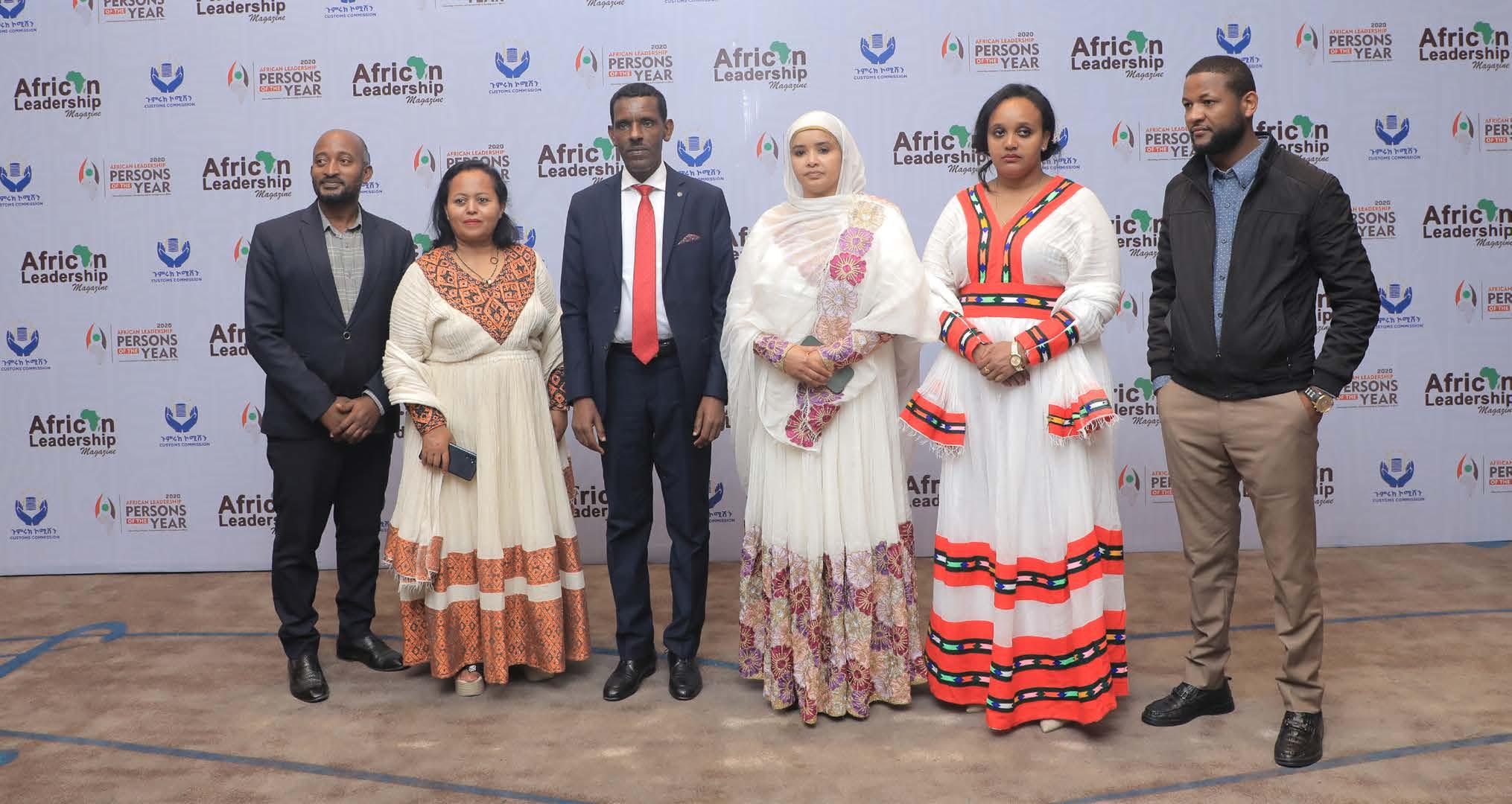
68 | ISSUE 17.4 | African Leadership Magazine
POLITICAL LEADERSHIP















15 INSIGHTS INTO SENEGAL’S NEW PRESIDENT: Bassirou Diomaye Faye
By King Richard

In a historic turn of events, Senegal welcomed its youngest president, Bassirou Diomaye Faye, to office on April 2, 2024. With a background steeped in left-wing ideals and a career marked by advocacy and unity, Faye’s ascent to power marks a significant moment in Senegal’s political landscape. His ascent to power has captured the imagination of a nation and the attention of the world. Bassirou Diomaye Faye embodies the hopes, dreams, and aspirations of a generation hungry for change. From his humble beginnings in Ndiaganiao to the corridors of power in Dakar, Faye’s journey reflects both vision and progress. Here are fifteen quick takeaways about the remarkable life and career of Senegal’s dynamic new president, Bassirou Diomaye Faye:
70 | ISSUE 17.4 | African Leadership Magazine
POLITICAL LEADERSHIP
1. Early Life and Heritage: Born on March 25, 1980, in Ndiaganiao, Senegal, Faye hails from a lineage of activists and visionaries. His father’s affiliation with the Socialist Party and his grandfather’s wartime heroism instilled in him a passion for social justice and progress.
2. Education and Career
Trajectory: Faye’s journey from a village school in Ndiaganiao to the prestigious Cheikh Anta Diop University in Dakar speaks volumes of his determination. After earning his baccalaureate in 2000, he pursued a career in law and later transitioned to a career as a tax inspector.
3. Alliance with Ousmane Sonko:
A pivotal moment in Faye’s career came during his tenure at the National School of Administration, where he forged a friendship with Ousmane Sonko. Together, they navigated the political arena, becoming instrumental figures within the PASTEF party.
4. Pascal’s Rise and Ideological Contributions: Faye’s intellect and strategic acumen played a crucial role in shaping Sonko’s presidential candidacy platform in 2019. Their shared vision for Senegal resonated with many, leading to a notable third-place finish in the elections.
5. Leadership as General Secretary: In the wake of Sonko’s arrest in February 2021, Faye assumed the mantle of general secretary for PASTEF. His unwavering commitment to the party’s principles solidified its position as a formidable force within Senegalese politics.
6. Uniting the Opposition:
Recognizing the power of unity, Faye spearheaded efforts to consolidate opposition forces for the 2022 elections. The resulting coalition, “Liberate the People,” clinched a significant number of parliamentary seats.
7. Presidential Victory and Inauguration: Faye’s ascendancy to the presidency in 2024 marked a watershed moment in Senegal’s history. Defying odds and emerging victorious, he was sworn in as the youngest president, promising a new era of progress and reform.
8. Affiliation with PASTEF: Despite challenges and controversies surrounding PASTEF, Faye remains steadfast in his allegiance to the party’s values and principles.
9. Family and Personal Life:
Behind the leader lies a devoted family man. Faye shares his life with his two wives, Marie Khone Faye and Absa Faye, and their four children, embodying the rich tapestry of Senegalese traditions.
10. Career Beyond Politics:
Beyond the political arena, Faye’s tenure as a tax inspector underscores his commitment to public service and fiscal responsibility.
11. Legacy and Reform Agenda:
As president, Faye’s legacy hinges on his promise to implement sweeping reforms that reflect his vision for a progressive and inclusive Senegal.
12. Progressive Political Stance:
Faye’s advocacy for policies promoting homeownership and economic empowerment underscores his unwavering commitment to advancing the interests of the Senegalese people.
13.
Advocacy for Left-Wing
Ideals: Rooted in his upbringing and familial influence, Faye continues to champion left-wing ideals, advocating for policies that uplift the marginalized and empower the disenfranchised.
14. Leadership Amidst Challenges: Assuming office during tumultuous times, Faye’s leadership will undoubtedly shape Senegal’s trajectory, steering the nation towards a brighter and more prosperous future.
15.
A Man of Change
and Innovation: As Senegal embarks on a new chapter under President Bassirou Diomaye Faye’s stewardship, the nation stands poised to embrace change and innovation. With a blend of youthful energy, political astuteness, and unwavering commitment to progress, Faye epitomizes the hope and promise of a nation on the rise.
71 ISSUE 17.4 | African Leadership Magazine |
POLITICAL LEADERSHIP

ASSESSING THE IMPACT OF FOREIGN AID ON AFRICA
In continuation of our previous article on “Trade, not Aid,” we present an analysis of the effects and implications of dependency on foreign aid in Africa. Foreign aid has long played a significant role in shaping the economies of many African countries, aiming to address poverty, promote sustainable development, and foster global partnerships. However, questions have arisen regarding its effectiveness, allocation, utilization, and long-term sustainability.
Historical Context and Allocation
Africa’s relationship with foreign aid dates back to the late 19th century, with initial assistance provided in the form of food aid from the United States and infrastructure development aid from colonial powers like Britain. However, the intentions behind foreign aid and its actual impact on poverty reduction have been subjects of scrutiny. Despite substantial aid inflows, Africa continues to grapple
POLITICAL LEADERSHIP
with extreme poverty, raising questions about aid’s effectiveness in addressing fundamental issues.
Current Aid Landscape
The United Nations and partner organizations allocate billions of dollars in aid annually to support millions of people across Africa. However, the distribution of aid across regions and income groups varies significantly. While substantial amounts are allocated to humanitarian assistance, critics argue that prolonged reliance on foreign aid can create a dependency syndrome, hindering countries from developing self-sustaining economies.
Challenges and Humanitarian Needs
Recent crises, such as Sudan’s escalating crisis and challenges in West and Central Africa, underscore the ongoing need for humanitarian assistance. Despite aid interventions, millions across Africa continue to require support due to conflicts, natural disasters, and economic shocks. While foreign aid has provided critical relief, concerns persist about its long-term impact on development and self-sufficiency.
Case Studies and Aid Impact
Several aid initiatives have positively impacted African nations, particularly in health, education, disaster relief, and capacity building.
For instance, interventions in Somalia and the Horn of Africa have provided essential healthcare services, food aid, and disaster relief, demonstrating the tangible benefits of foreign aid in addressing immediate needs.
The Need for Reform
Despite its contributions, foreign aid’s failure to foster sustainable economic growth and poverty reduction necessitates reform. There is a consensus on the need to prioritize investments in sectors that promote economic growth, job creation, and self-sufficiency. Strengthening initiatives like the African Continental Free Trade Area (AfCFTA) is crucial for fostering sustainable development and reducing aid dependency in Africa.
Conclusion
While foreign aid has supported vital infrastructure projects and provided essential relief, its long-term impact on African economies remains debatable. Reforming aid policies to focus on sustainable development, local empowerment, and poverty reduction is essential for ensuring Africa’s future prosperity. By prioritizing self-sufficiency and fostering economic growth, Africa can reduce its dependence on foreign aid and chart a path toward sustainable development and prosperity.

73 ISSUE 17.4 | African Leadership Magazine |
POLITICAL LEADERSHIP
Evaluating the Impact of the AfCFTA on Africa’s Economic Integration
By Daniel Prince

As we approach the fifth year since its implementation, it’s imperative to scrutinize the African Continental Free Trade Area (AfCFTA) to gauge its progress and effectiveness in advancing Africa’s economic integration. The AfCFTA, aiming to create the world’s largest single market, holds the promise of boosting intra-African trade, fostering economic integration, and driving sustainable development across the continent.
Current Progress and Objectives
Aligned with “Agenda 2063” and targeting Africa’s youthful population, the AfCFTA seeks to enhance intra-African trade, productivity, job creation, and economic opportunities. Projected benefits include significant income growth by 2035 and a substantial expansion of the African economy by 2050. However, persistent gender biases and barriers faced by youth in accessing formal employment underscore the importance of ensuring inclusivity in the AfCFTA’s implementation.
74 | ISSUE 17.4 | African Leadership Magazine
POLITICAL LEADERSHIP
Access to Finance and Inclusivity
Efforts to enhance customs unions and facilitate business operations are underway, but challenges persist, particularly in providing financial support to women- and youth-led enterprises. Initiatives aimed at improving financial literacy and digital financial inclusion align with the vision of Agenda 2063 for a prosperous Africa driven by its people.
Challenges and Funding Needs
While the AfCFTA aims to create a continental market of over one billion people, challenges such as infrastructure deficiencies and funding gaps remain significant hurdles. Estimates suggest an annual funding requirement of $130-170 billion to address infrastructure needs, crucial for reducing trade ```````barriers and promoting economic growth.
Sectoral Focus and Job Creation
Efforts to bolster manufacturing, particularly in sectors like agro-processing and green technology, hold the potential to create millions of jobs and significantly contribute to Africa’s GDP growth. A focus on multi-sectoral industries is essential for fostering economic resilience and sustainable development.
Rade Facilitation and Tariff Reductions
The AfCFTA’s objective to eliminate tariffs on 90% of intra-African trade aims to create a conducive environment for business growth. While progress has been reported in tariff reductions and customs simplification, more efforts are needed to ensure widespread implementation across member states.
Intra-African Trade Growth
Historically low levels of intra-African trade pose a challenge that the AfCFTA seeks to address by dismantling trade barriers. While early signs indicate positive trends in some countries, the full impact may take time to materialize as businesses and governments adapt to new trade dynamics.
Private Sector Engagement
Active private sector involvement is crucial for the AfCFTA’s success, requiring governments to create an enabling environment for innovation, investment, and business growth. Member states must prioritize private sector engagement to unlock the full potential of the AfCFTA.
Capacity Building and Institutional Strengthening
Enhancing institutional capacities and regulatory frameworks is essential for effective implementation and enforcement of trade agreements. Investment in skills development and compliance culture is vital to ensuring that the AfCFTA’s benefits are realized at both national and continental levels.
Empowerment of Women and Youth
The AfCFTA offers a transformative opportunity to leverage the capabilities of women and youth in driving economic growth. Timely implementation of policies prioritizing empowerment interventions can significantly contribute to Africa’s progress.
Conclusion
While the AfCFTA represents a historic opportunity for Africa’s economic transformation, addressing infrastructure deficiencies, bureaucratic hurdles, and other barriers is imperative for its success. Collaboration among African nations, investment in institutions, and the creation of a conducive environment for sustainable growth are essential to realize the full potential of the AfCFTA and drive Africa towards a prosperous future.
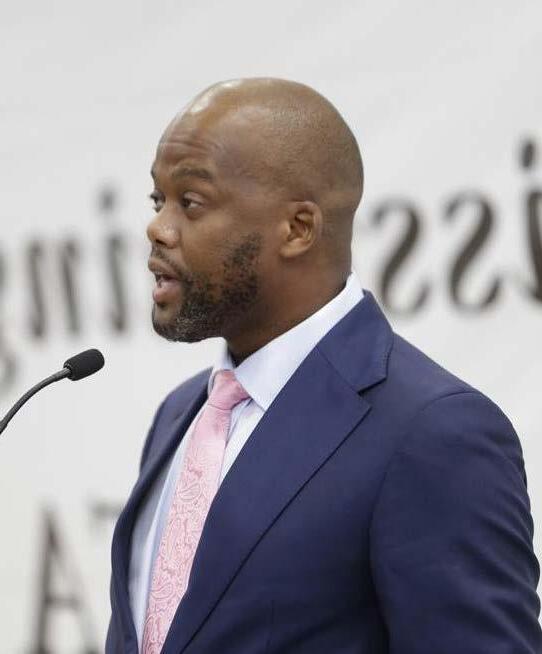
75 ISSUE 17.4 | African Leadership Magazine |
POLITICAL LEADERSHIP
NAVIGATING THE THORNY GENDER-BASED ISSUES IN KENYA
Blessing Ernest

Gender-based barbarity remains a pervasive issue in many societies, and Kenya is no exception. Despite significant strides in recent years, there are still numerous challenges in addressing the root causes and consequences of gender-based violence. According to a report by the UN Office on Drugs and Crime in 2022, Kenya recorded 725 femicide cases. We look at the multifaceted aspects of gender-based issues in Kenya, exploring the shaming of GBV victims, civil society organisation (CSO) protests, government actions and inactions, the role of the international community, and a possible way forward.
76 | ISSUE 17.4 | African Leadership Magazine
POLITICAL LEADERSHIP
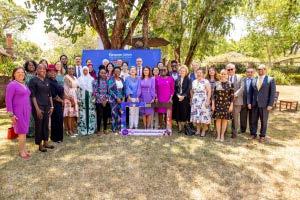
Shaming of Gender-Based Violence Victims:
One major obstacle in the fight against genderbased violence in Kenya is the prevalent culture of victim-blaming and shaming. Society often places the burden on survivors to prove their innocence rather than holding perpetrators accountable. This not only perpetuates a cycle of silence but also discourages victims from reporting incidents, fearing judgement and social ostracization.
From 2016 to 2023, the Africa Data Hub recorded the tragic deaths of 546 women solely because of their gender. Astonishingly, 75% of all female victims, including girls, fell prey to violence inflicted by intimate partners, former partners, or family members. Disturbingly, the menace of violence against women and girls manifests at an early age, with over 30% having endured sexual, psychological, or physical abuse by the time they reach 15 years old.
CSOs and Advocacy:
In Kenya, protests have rocked the streets as various CSOs have been at the forefront of awareness campaigns and legal reforms aimed at dismantling the culture of shame surrounding GBV. These organisations amplify the voices of survivors, providing them with a platform to share their stories without fear of retribution.
The Femicide Count Kenya, which tracks
reported killings through local news, documented 58 deaths classified as femicide from January to October 2022. In 2023, the organisation reported a disturbing increase, recording a minimum of 152 killings—the highest in the past five years. Kenya, akin to numerous African nations, has ratified treaties aimed at addressing gender-based violence, such as the UN Convention on the Elimination of All Forms of Discrimination against Women (CEDAW) and the African Charter on Human and Peoples’ Rights.
National laws, including the Sexual Offences Act, criminalise violence against women in Kenya. Additionally, the country’s police force has established a specialised gender desk. However, activists contend that government policies remain largely ineffective in combating the issue.
Government Actions and Inactions:
Numerous organisations and coalitions dedicated to gender equality have urged Kenya’s government to train and assist the National Police Service and the Office of the Director of Public Prosecution in their efforts to investigate and prosecute cases of genderbased violence and to prevent and ensure accountability for femicide.
The Kenyan government has taken steps to address gender-based issues, including enacting laws and policies aimed at protecting victims. However, challenges persist, ranging from
77 ISSUE 17.4 | African Leadership Magazine |
POLITICAL LEADERSHIP
the slow implementation of existing laws to gaps in the judicial system. The government’s commitment to enforcing existing legislation and fostering a culture of zero tolerance for gender-based violence needs to be reinforced.
The Kenyan Constitution has clauses that specifically protect women’s rights and shield them from abuse. Article 43 highlights the right to the best possible level of health, whereas Article 28 ensures the right to personal security and dignity. These fundamental requirements are flagrantly and directly violated in most cases by the state’s inability to stop femicide.
The International Community:
International support and collaboration are vital in addressing gender-based issues globally. Kenya has received assistance from various international organisations, including the United Nations and non-governmental organisations, in its efforts to combat GBV. The international community can play a crucial role in influencing policy changes, providing resources, and fostering partnerships to strengthen Kenya’s response to gender-based issues.
To create a lasting impact, a multifaceted approach is necessary, including strengthening legislation and enforcement, comprehensive education and awareness initiatives, empowering survivors, collaboration with civil society, and international collaboration.
UN Women takes the lead in various initiatives aimed at preventing femicide and gender-based violence in Kenya. One such effort involves providing specialised training to police personnel. These programmes equip officers with the skills to identify potential femicide indicators, understand the unique challenges faced by women, and promote a victim-centred approach in law enforcement.
To date, UN Women has successfully trained over 600 officers within Kenya’s National Police Service, National Transport and Safety Authority, and informal transport sectors.
Additionally, UN Women actively supports survivors of gender-based violence through collaborations with local groups providing counselling, legal aid, and access to secure shelters. By partnering with five civil society organisations in Kenya, UN Women
has facilitated psycho-social support for approximately 40,000 survivors and provided legal aid assistance to around 1,000 individuals.
The Way Forward
To create a lasting impact, a multi-faceted approach is necessary to address gender-based issues in Kenya.
Strengthening Legislation and Enforcement:
The government must ensure the swift implementation of existing laws, closing loopholes, and addressing shortcomings in the legal system. Strict enforcement and punishment for perpetrators are essential to deter future incidents.
Comprehensive Education and Awareness: Initiatives focused on educating the public about the impact of gender-based violence and fostering a culture of empathy and respect are crucial. This includes school programmes, community workshops, and media campaigns. Empowering Survivors: Support systems for survivors should be expanded, providing counselling, legal aid, and resources to rebuild their lives. Breaking the silence surrounding GBV requires creating an environment where survivors feel safe and supported.
Collaboration with Civil Society: The government should actively engage with CSOs, considering them valuable partners in the fight against gender-based violence. Joint efforts can amplify the impact of awareness campaigns, policy advocacy, and support for survivors.
International Collaboration: Continued collaboration with the international community can enhance resources, expertise, and best practices. This involves fostering partnerships, sharing information, and working collectively to eradicate gender-based violence.
Addressing gender-based issues in Kenya requires a comprehensive and collaborative effort from all sectors of society. By challenging ingrained cultural norms, strengthening legislative frameworks, and fostering international partnerships, Kenya can make significant strides towards a future free from gender-based violence. Society needs to recognise the urgency of this issue and collectively work towards creating a safer, more equitable environment for all.
78 | ISSUE 17.4 | African Leadership Magazine
POLITICAL LEADERSHIP
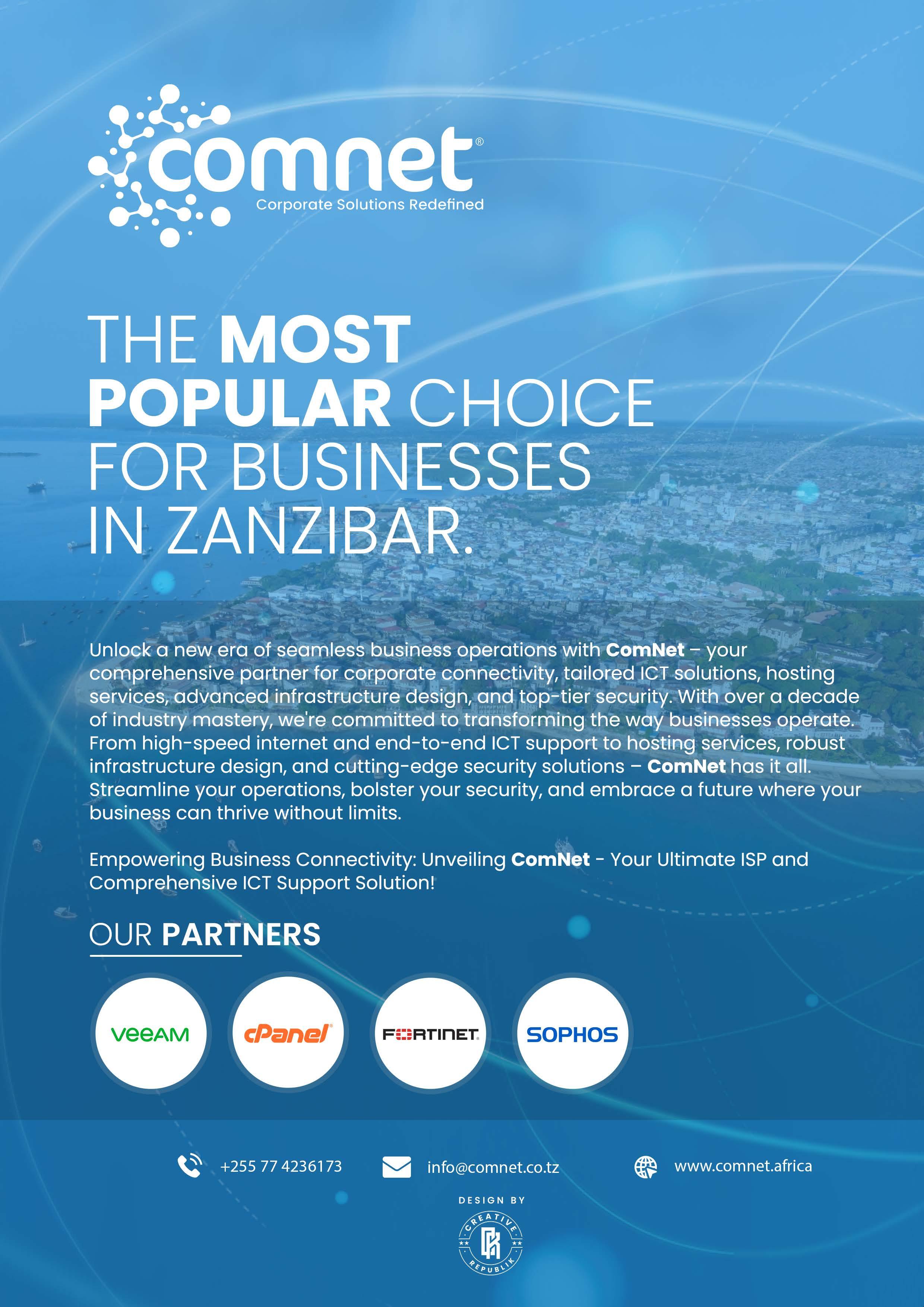
ZIMBABWE’S MONETARY POLICY: Lessons for Other African Nations
By Blessing Ernest

Zimbabwe’s economic crisis reached its nadir in the late 2000s, characterized by one of the world’s severest hyperinflations. At its peak, prices doubled every 24 hours, rendering the Zimbabwean dollar virtually worthless. Citizens experienced extreme hardship, with necessities becoming prohibitively expensive.
In 2008, the Zimbabwean dollar faced extreme devaluation, with a single US dollar exchanged for ZWD2.6 trillion. According to
the Zimbabwe National Statistics Agency, the nation’s inflation reached 35 percent in January, rising from 27 percent in December 2023.
The infamous anecdote of purchasing a loaf of bread for millions of Zimbabwean dollars became emblematic of the country’s economic collapse. Families struggled to afford essential items, and savings evaporated overnight.
80 | ISSUE 17.4 | African Leadership Magazine BUSINESS LEADERSHIP
In response to the crisis, Zimbabwe abandoned its currency and adopted a multi-currency system, predominantly relying on the US dollar and South African rand. This move brought temporary stability, but it also highlighted the country’s loss of monetary sovereignty and exposed vulnerabilities to external shocks.
Fast forward to the present: Zimbabwe has reintroduced its national currency, the Zimbabwean dollar, in an effort to regain control over monetary policy and restore confidence in the financial system. However, the road to stability has been fraught with challenges. Initial reintroduction efforts were met with skepticism, as memories of hyperinflation and currency devaluation lingered. The new currency faced immediate pressures, with inflationary spikes and exchange rate volatility eroding purchasing power.
The Nigerian naira defied the recent surge of the dollar in 2024, maintaining its upward momentum amidst concerns over persistent inflation. Reaching a four-month peak of N1,120 per dollar on the black market, the naira’s strength was fueled by increased activity in Nigeria’s money market, a result of the Central Bank of Nigeria’s (CBN) FX reforms injecting liquidity.
Nigeria’s National Bureau of Statistics reported a rise in inflation to 29.90 percent in January 2024 from 28.92 percent in December 2023. The surge in inflation has led to a significant increase in food prices, prompting protests across Nigeria.
Former Nigerian President Olusegun Obasanjo urged President Bola Tinubu’s administration to draw lessons from Zimbabwe’s economic challenges amidst Nigeria’s worsening economic hardship.
Obasanjo drew parallels between Nigeria’s escalating inflation and economic downturn and Zimbabwe’s recent experiences. He emphasized the need for Nigeria to seek insights from Zimbabwe’s strategies, even if the approach would differ.
While acknowledging that the surge in the cost of living predates Tinubu’s administration, Obasanjo noted that it worsened after he assumed office. Tinubu’s government’s decision to remove fuel subsidies and float the naira contributed to the escalating economic challenges. The removal of fuel subsidies resulted in a surge in petrol prices from N145 to N630, subsequently impacting food prices. Additionally, the depreciation of the naira against the dollar has exacerbated the situation,
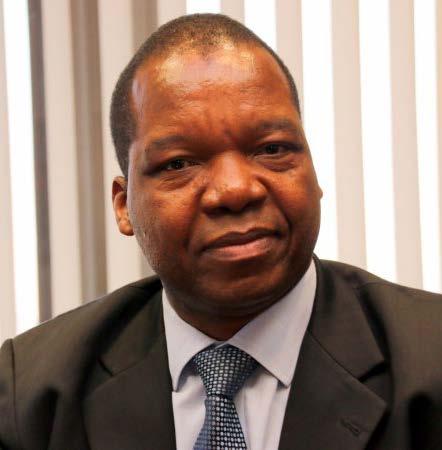
Comparatively, throughout 2022, the Ghanaian cedi depreciated sharply against major currencies, especially the U.S. dollar. This decline, exceeding 55% between January and October, posed significant challenges for Ghanaian importers, who struggled to finance shipments and clear goods at ports due to increased costs. Access to foreign exchange became increasingly restricted, delaying trade as the Bank of Ghana managed forex distribution tightly.
The depreciation of the cedi also fueled high inflation rates, reaching 40.4% year-on-year in October 2022, primarily driven by surging food and fuel prices. This inflation eroded consumer purchasing power, leading to reduced demand for goods and services. Despite projections indicating a slower depreciation rate for the cedi against the dollar, concerns lingered over its impact on the economy’s stability.
In 2021, the Governor of the Central Bank of Sierra Leone, Prof. Kaifala Kallon, announced plans to redenominate the country’s legal tender, the Leone, by removing the three last zeros from the face value of the currency.
Despite these setbacks, Zimbabwe has made strides towards economic recovery. Efforts to stabilize the currency and implement structural reforms are gradually bearing fruit. Inflation rates have moderated, and the exchange rate has shown signs of stabilization. The government
with the exchange rate surpassing N1,600 against the dollar.
81 ISSUE 17.4 | African Leadership Magazine | BUSINESS LEADERSHIP
has embarked on initiatives to attract foreign investment, promote export diversification, and improve fiscal discipline.
Zimbabwe replaced its collapsing local currency with a new one backed by gold and foreign currencies in hopes of stability and reducing inflation. The country relaunched its own currency in 2019 after a decade of dollarization, but it struggled to gain public trust, with over 80% of transactions now in foreign currency.
A more than 70% decline in the Zimbabwean dollar since the year’s start drove inflation past 55% annually in March, evoking memories of hyperinflation under former leader Robert Mugabe. The new currency, Zimbabwe Gold (ZiG), circulates alongside foreign currencies, with the central bank setting a 20% interest rate, drastically lower than the previous 130%.
Lessons Learned from Zimbabwe’s Monetary Policy
Zimbabwe’s economic woes were exacerbated by reckless fiscal policies, including excessive government spending and unsustainable debt accumulation. Other African nations must prioritize fiscal discipline, ensuring that government expenditures are sustainable and aligned with revenue generation. Sound fiscal management lays the foundation for a stable economic environment and mitigates the risk of currency devaluation.
The erosion of central bank independence in Zimbabwe undermined the credibility of monetary policy, leading to unchecked money printing and hyperinflation. African nations must safeguard the independence of their central banks, shielding them from political
interference and ensuring that monetary policy decisions are based on economic fundamentals rather than short-term political considerations. A credible and transparent monetary policy framework is essential for maintaining price stability and fostering investor confidence.
Zimbabwe’s overreliance on a single commodity, namely agriculture, left its economy vulnerable to external shocks and fluctuations in global commodity prices. African nations must prioritize economic diversification, developing robust and resilient economies that are less susceptible to external shocks. By diversifying their economic base and investing in sectors such as manufacturing, technology, and services, countries can enhance their resilience to economic volatility and promote sustainable growth.
The economic collapse in Zimbabwe had dire consequences for its population, with widespread poverty, unemployment, and social unrest. African nations must prioritize inclusive growth policies that foster equitable distribution of wealth and opportunity. Investing in education, healthcare, and social safety nets is crucial for reducing poverty, enhancing human capital, and promoting social cohesion. Sustainable economic development must prioritize the well-being of all citizens, ensuring that growth is inclusive and benefits the entire population.
While the days of hyperinflation might seem to be behind Zimbabwe, the scars of economic turmoil are a sobering reminder of the importance of prudent monetary policy and responsible governance. And how other African nations can learn from Zimbabwe’s economy.
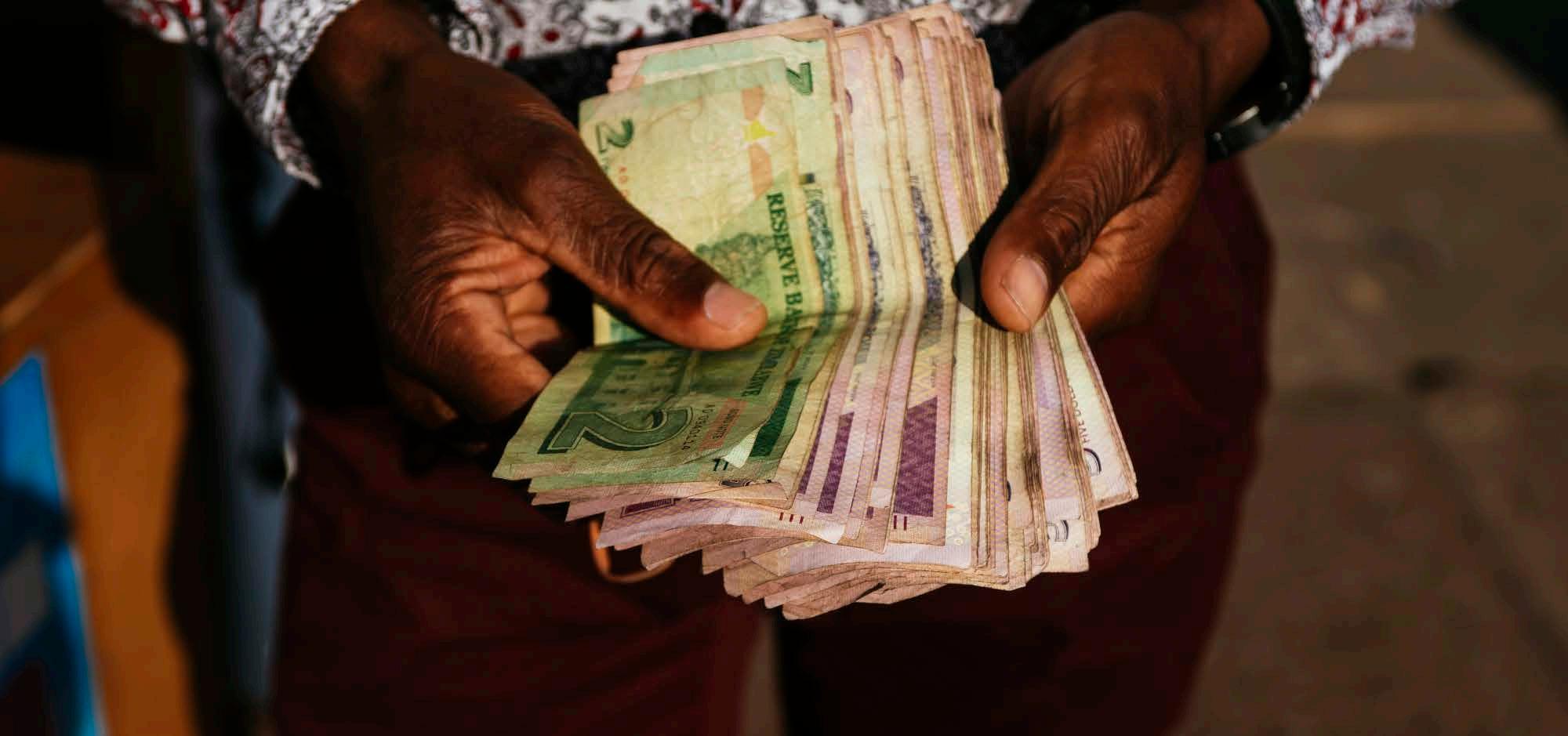
82 | ISSUE 17.4 | African Leadership Magazine BUSINESS LEADERSHIP
